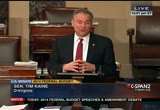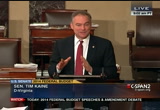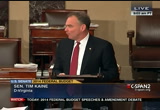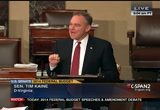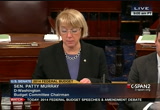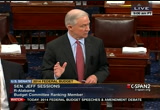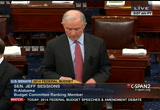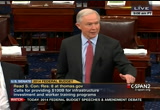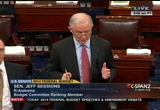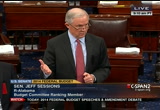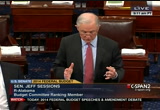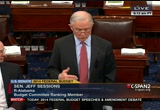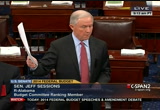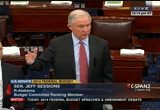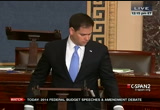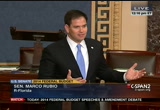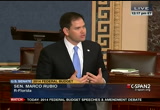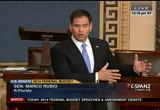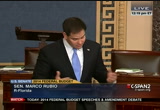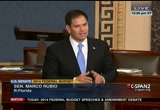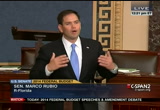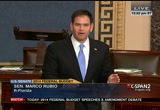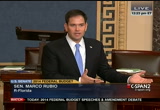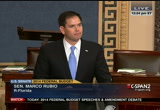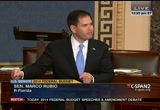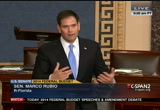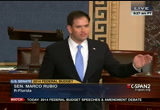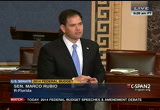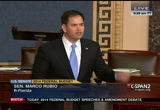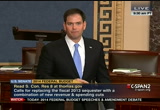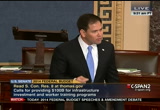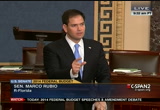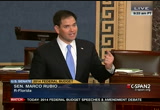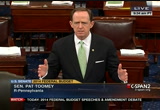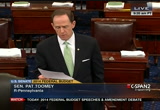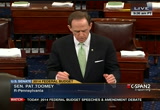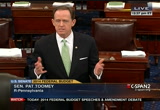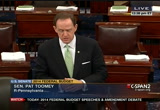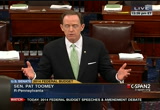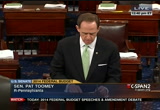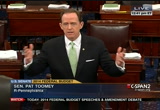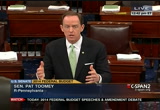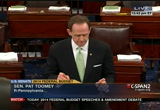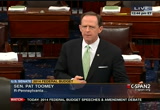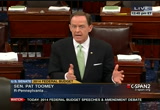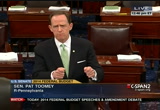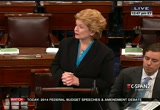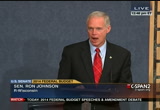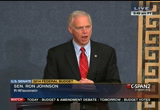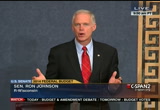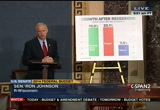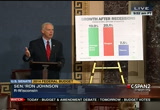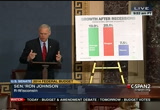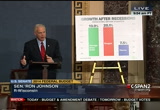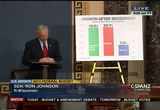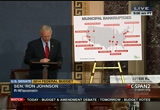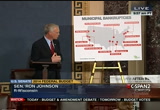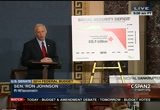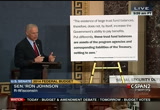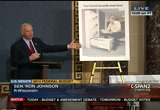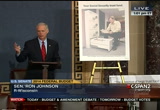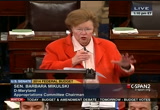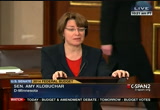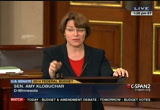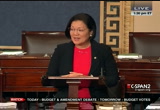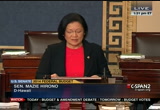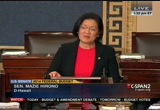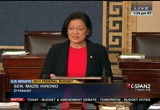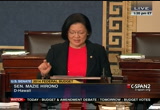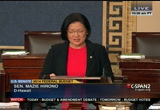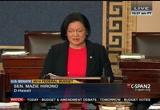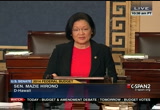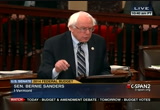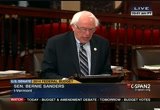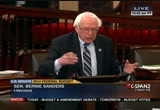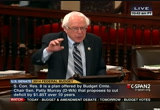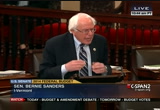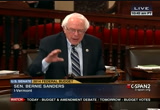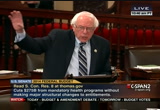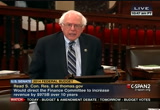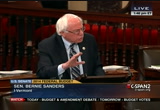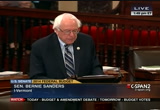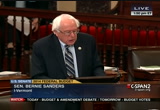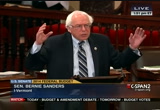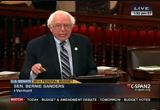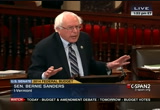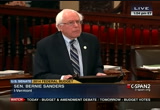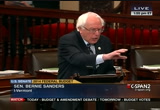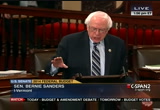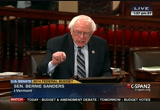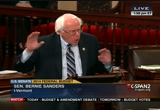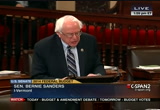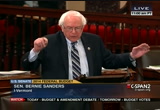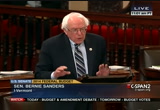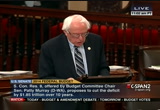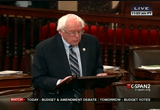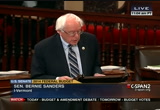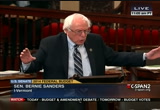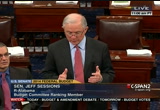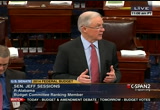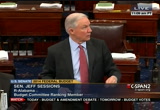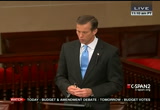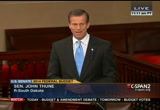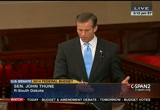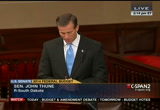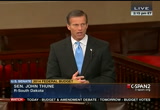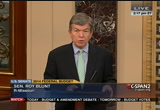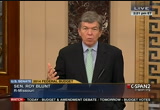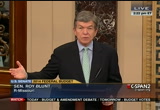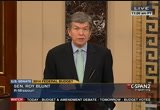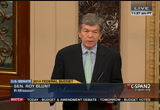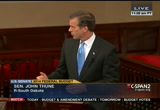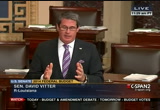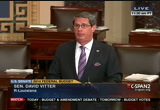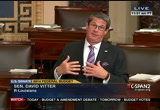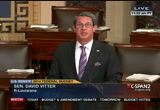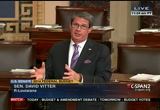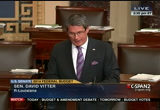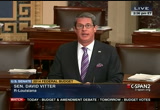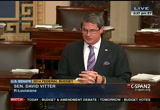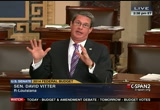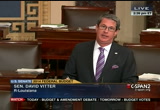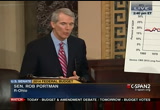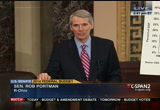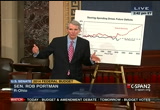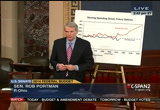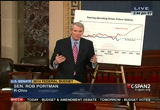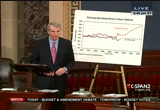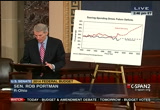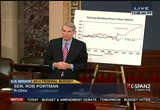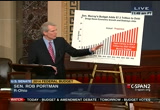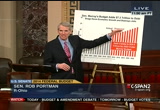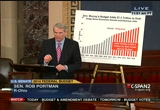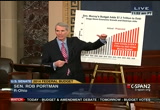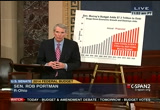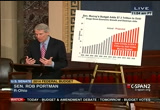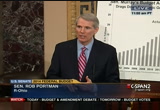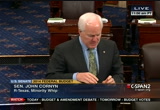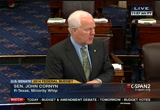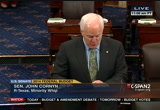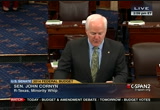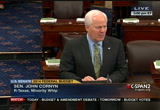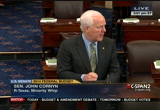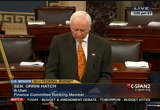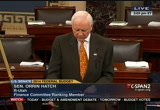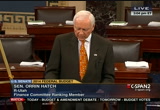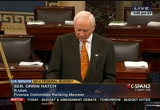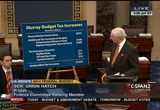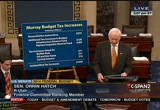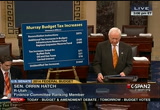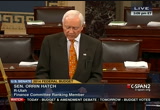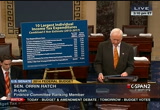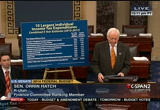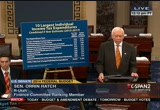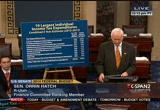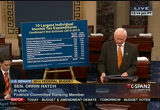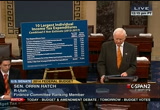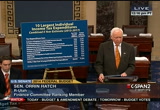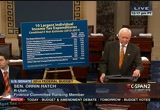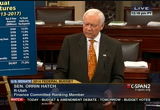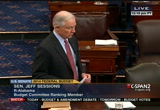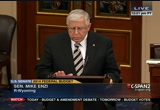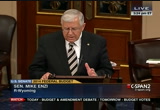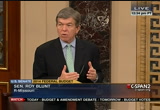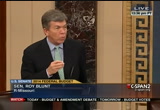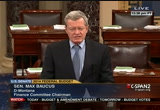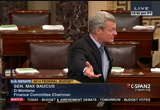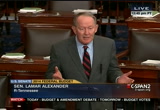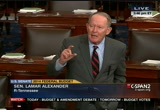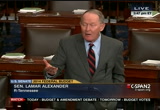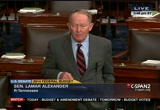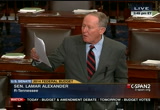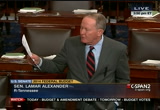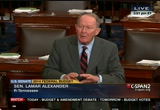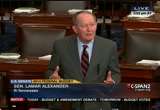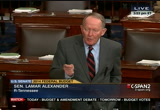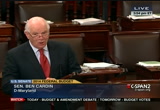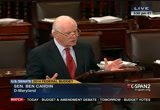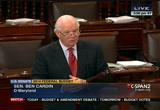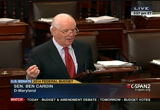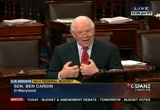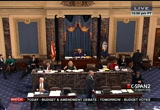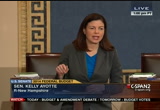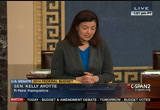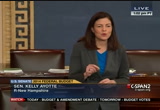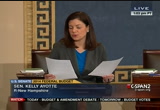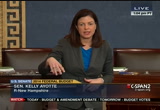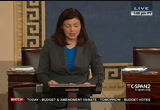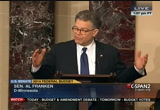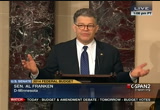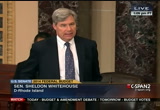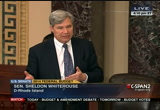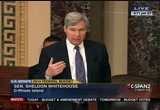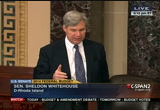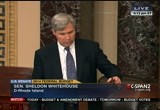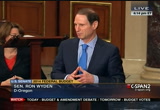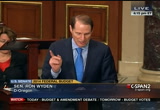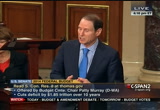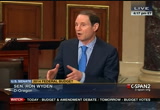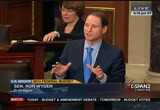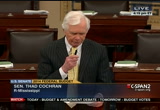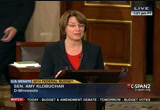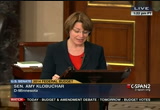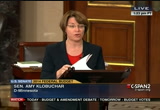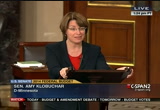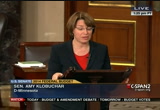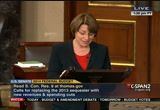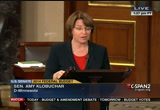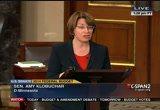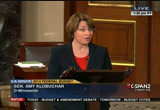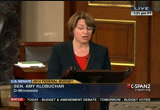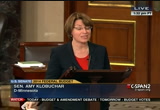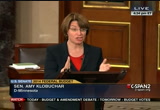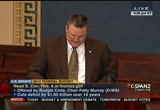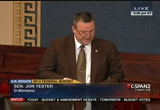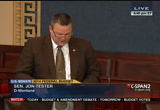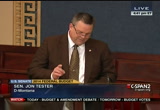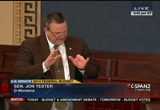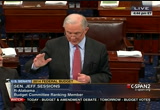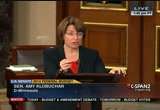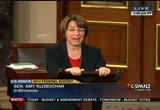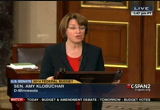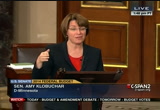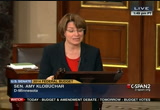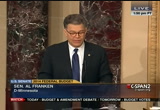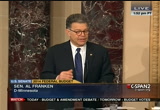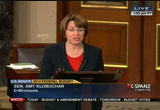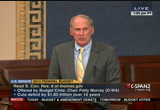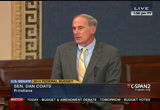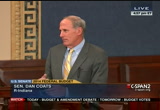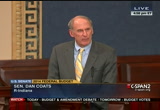tv U.S. Senate CSPAN March 21, 2013 12:00pm-5:00pm EDT
12:00 pm
nation that does not -- is not riddled with debt and deficit, but also a nation that continues to be the economic leader in the world. and i believe our plan makes -- protects those investments in those key components of growth. and i hope over the coming hours that we will go through this debate and -- and i know we'll have a spirited period of a lot of amendments. this -- this budget i believe will pass and it will have to then find agreement with our colleagues in the house. and i just want to again commend both the chair and, for that matter, the ranking member. at the end of the day, we have to find common agreement to get this done. this issue that hovers all over of our other debates has become a metaphor as to whether our institutions can if you please in the 2 1*9 century. so just as the chair and rank member found agreement through a markup process where both sides
12:01 pm
were heard and amendments were offered and debated in a fair and open process, i want to both thank the chair and rank member for their commitment. they have different idead about how we get there, but at the end of the day we do have to get there in common agreement. with that, i know our time is about up. but i want to give -- i am a good friend of th-- mygood friee balance of my time. mr. kaine: thank you, mr. president. thank to my colleague senator warner. i want to pick up on one of the last points he made which is the balanced way of getting to where we all want to go. wwe want to have a growing economy, weal we want to deal with our deficit. these are challenging, complex goals. we can get there. even the action of this body last night in passing the fyn.2013 appropriations bill shows we can cooperate together
12:02 pm
and with the thousands get there. it is my hope that that will inspire us going forward. the question is this: we all agree that what has been done thus far in the area of deficit reduction equates to about $2.4 trillion of deficit reduction that has been done by the last congress, including the deal on the bush tax cuts that were made at year end. $2.4 trillion of deficit reduction over the next ten years. and all also agree that $is.8is- that $1.8 trillion was gutting expenses and a little more than $600 billion of this was revenues achieved through the year-end bush tax cut deal. so everwhelmingly what has been done thus far has been in spending cuts rather than new revenues. it is very important for us to know that. it is very important for folks to realize that democrats are willing to make are hard calls about spending. we've done it already. but the question before this body and the question before the
12:03 pm
house now is going forward, what do we do to achieve additional deficit reduction that's consistent with having a growing economy? and the approaches of the senate and the house on this could not be more different. the house approach basically says that all additional deficit reduction should be achieved by cutting spending. by looking at one side of the balance sheet. i do not know of a business, i do not know of a family, i do not know of other units of government that as they're trying to wrestle with this question confine themselves to only looking at one side of the balance sheet. but that's what the house budget does. you know, i was thinking about this approach and this question about deficits not long ago, and it struck me that when i look at myself in a mirror, madam president, i always wish that i was thinner. i always wish i was thinner. but i've never once looked in a mirror and wished i was weaker.
12:04 pm
an all-cuts approach is like looking in a mirror and wishing your weaker because an all-cuts approach placks yo makes you wen education, weaker in defense, by laying people off in jobs, it makes you weaker because your unemployment rate is higher. it is like looking in the mirror and wishing your weaker. we have to be stronger. can we make cuts? sure we can and we have and we'll make more. but we ought to be focused on being stronger, about growing the economy and growing jobs. and that's why the approach that the senate takes is the right approach. because by utilizing revenues appropriately, reforming tax expenditures to reduce they will on the equivalent of% o 7% or 8a year, thee myriad of tax expenditures in the tax code were able to find cuts.
12:05 pm
the senate budget in achieving additional deficit reduction is a balanced approach that will make us stronger, not weaker, and that's why it is my great hope that we will pass this in a significant way. i thank the chairman. i thank you, madam president. mrs. murray: madam president? the presiding officer: the senator from washington. mrs. murray: i want to thank the senators virginia and hawaii for excellent statements and really laying out the framework why it is important that we have a bill that deals with both spending cuts and revenues and rulely appreciate their time both in committee abc news on the floor. i ask unanimous consent that at 3:45 p.m. today, there up to 60 minutes of debate equally divided between senators klobuchar and coats or their designees for a report on the economic goals and policies under section 305-b of the congressional budget act. ethe presiding officer: is
12:06 pm
there objection? without objection. mrs. murray: on behalf of senator men then derksz i ask consent that margaret taylor, a state department detailee to the foreign reels committee, be given floor privileges on budget resolution. the presiding officer: without objection. mrs. murray: thank you, madam president. mr. sessions: madam president? the presiding officer: the senator from alabama. mr. sessions: i have enjoyed listening to our colleagues discuss issues particularly the sequester. i know senato senator kaine ande talketalked about this previous. it is so important for every member of this body to understand. senator kaine just said additional deficit reduction is heeded. he is exactly correct. this budget has no additional deficit reduction. they claim they've got a balanced approach. they have a used that word now 40-some-odd times, "balanced." this budget never balances. it does not balance in ten years, 15 years, has no vision
12:07 pm
that would even lead to balance. it remains unsustainable in terms of adding to the debt every single year, resulting in our one-year interest payment in 2023, $800 billion, more than the defense department, well more than the defense budget is, surging interest from around $250 billion mao t to-- $250 bi0 billion. so we don't have additional deficit reduction in the budget that we're being asked to vote on. senator kaine said can we make cuts? yes. well, i would say we can make more cuts. but we don't. yes, there's some reduction to some programs but a net, no reduction in the budget.
12:08 pm
so it doesn't change the debt course. we can't deny that what we're saying is go back to the committee. you write the budget like you want. if you think there ought to be more taxes than i think, that's okay. bring it up much let's vote on it. but let's have this budget do what you say -- be balanced. they've used this word "balance," 40 more times. we've been keeping up with it. it is so ridiculous. it is utterly unbalanced. never balanced, by their own admission, the deficits in one year never are lower than $400 billion. so it never balances. a balanced approach, a balanced plan -- why? are they guilty about this? do they think the american people will hear their message and think, oh, they've got a balanced budget? i suspect that's what they think. twice i have observed our
12:09 pm
democratic colleagues at the committee slip and say they've got a balanced budget, which they've got it in their head so much that their balanced plan is what they're saying. so with a is the balanced plan, the way it's been promoted? $1 trillion in tax increases, $1 trillion in spending cuts, a net $2 billion in deficit reduction. not so. iit is not so. the spending cuts are offset by spending -- the tax increases are offset by spending increases. that'sious the way i thea's -- that's just the way it is. one thing i would share, and i am so pleased that senator rubio is here and look forward to speakinspeaking with him about e sequester. i truly think it is this is an unwise mechanism to reduce spending. it should not happen. it should be fixed.
12:10 pm
i totally agree with my colleagues that this is unfairly and disproportionately falling on the military. i know florida, senator rubio, has military bases. i have in alabama, virginia -- we all do. these are patriotic americans. and these furloughs are in effect one day a week, a 20% paycut out of the blue, and it is not necessary and there are other things that are happening. so how did it happen? it was proposed by the white house and said, okay, if this committee doesn't reach agreement on the details of spending cuts, then we will have a sequester across the board. so it originated by -- from the white house. the political theater we have down here is not correct. we need to be honest about thsm the republicans agreed to it. it was part of the budget control act. this is the legislation, and who
12:11 pm
signed the legislation in blue ink right on the back? the president of the united states, barack obama. so he signed it. it's his document. and we agreed to raise the debt ceiling ceiling $2.1 trillion ae agreed to reduce spending over ten years, $2.1 trillion. before the ink was dry, the president was proposing to eliminate the cuts he agreed to. he's been fighting to eliminate those cuts from the beginning. and they're really not cuts. they're simply -- if they were properly applied, it would reduce the growth of spending and not cut spending actually at all. so the committee that was supposed to find all the cuts failed. the sequester came into law. it's an antimilitary provision. it was put in by jack lew, a very liberal member of the president's, at that time, chief
12:12 pm
of staff for offic office of mot and budget. the president seems to be quite happy to see these cuts fall on the defense department. he seems to be happy to have this happen. why do you say that? i say, because he's done nothing to philadelphia it. -- to fix it except demand something that he has no right to demand. that is, to violate this agreement and raise taxes and spend more. and that's not going to happen. congress is not going to vote to violate the agreement they made with the american people just less than two years ago. if we give in on that, we might as well quit. and our colleagues say they want to have a balanced approach to the budget, and they're going to raise taxes, and most people hear that think that the taxes will be used to reduce the deficit. but it's not. the taxes are going to be used to fund more spending over the
12:13 pm
agreement we've had in place now for about 18 or 20 month monthsm the budget control act. they want to increase spending above this line. and they're using all of their taxes to fund that, and it does not change the debt course of america, which mr. elmendorf, the c.b.o. director, told us in committee is an unsustainable path that we're on. even after this budget control act was passed in august of 2011. so wend to wor we need to work m prepared to have solutions. the house of representatives has twice passed legislation that would alter this budget control act so that the cuts don't fall so hard on defense. in fact, they eliminated the additional defense cuts, the second phase of defense cuts, and found cuts elsewhere in the
12:14 pm
budget, and smoothed it out fairly. that's what should happen. that's where we need to be. so i would encourage all our citizens, all our members of congress, all our military leaders, you want to fix the sequester? address your request at 1600 pennsylvania amendment of address your request to the commander in chief of the united states military, who has an absolute duty, a responsibility to ensure that these reductions are done in a fair way. we have voted and fought for on this side of the aisle more flexibility, and we believe and will vote for other reductions in spending to not have this happen the way it's happening. it seems to me they desire to have it happen this way, so they can come to the floor and make a point somehow that we're dramatically and disastrously
12:15 pm
hammering the budget when it is not necessary for it to be done this way. that's the way i see it, and i believe we can reach that agreement. i think somehow we will because it's not right the way the military, representing one-sixth of all federal spending, is taking half the cuts. that's the way it falls right now. i.tit's not correct and it's too damage ago. it is great to see senator rubio. i believe he is next up. i would yield to him and thank him for his contribution to the discussion. madam president, i ask that this time be counted against the resolution. the presiding officer: the senator from florida. mr. rubio: thank you, madam president. thank you, senator sessions, foreigner lightening us on this budget matter, which you have been doing all day on the floor.
12:16 pm
i i wanted to give some per perspective to what we're doing here. all of the stuff we're talking about here on the floor not just today but every day, the reason it is relevant is how it impacted the lives of real people. what impact does this have on people's lives? it also happens to be very true, we're sent here to work for people. we're sent here to work for the people that equity willed us from the states that we come from. all of the stuff we're discussing is relevant to the extent that it impacts the lives of real people in our country around around the world. when you talk about utah canning spending, what matters is the spending that you're cutting. how does it impact people, for better or worse? those taxes have to be paid by somebody. they're not being paid by some anonymous thing. the point is these taxes are being paid. you talk about the debt. the debt is not some -- you know, simply just a moral
12:17 pm
financial obligation. the debt also has to be paid. somebody's going to pay that debt one day. every penny this government borrows, somebody's going to have to pay it back one day. they're going to have to pay it back through higher taxes. and if the debt is too high, they're also going to have to pay it back through less opportunities. so that's why this matters and why this is relevant. it is relevant. we have to view it through the lens of people's lives, of the lives of real people in the real world. okay? and what do people want in the real world out of their life? it's not that complicated. it's what all of us want. they want a job that pays them enough money so they can have a good standard of living, you know, so they can afford to maybe buy a house and have enough time spend with their families in leisure activities, maybe take a vacation every year or so. that -- people want that. people want to be able to pursue their dreams. maybe you have this great idea about a new business you want to start and you want to live in a country where if that's what you want to do with your life, it's possible. that you can actually do something you love for a living and they pay you for it. and what everybody wants, no matter where you are on the economic strata, is everyone wants to make sure their kids are better off than themselves. that's not unique to americans.
12:18 pm
people all over the world want their kids to be better off than them. that's what they all want. and so that's what this is about. it's about what role can we play in making all of those things more possible in this country? and, in fact, the fact that has been more possible here than anywhere else is what's made us special. so in order to understand what we can do to make that possible, we have to understand how that happens. how does prosperity happen? how does the kind of prosperity we americans want for ourselves and for our families and for our children, how is that possible? that is also not that complicated. it's largely a function of the private economy. it's largely a function of the private economy. and it's a cycle that's very well understood. someone has a really good idea for a business, a new business, or growing their existing business. they somehow get access to money, whether it's their own money or money they borrowed or money someone invests through them, and they open this business. there's no guarantee that that business is going to work out. but they are willing to risk it.
12:19 pm
and the idea works. and all of a sudden this business that they started all by themselves out of the spare bedroom of their home, they now have five employees. and five employees isn't just a number. that's five families that are taking home a paycheck. those are five providers -- mothers or fathers -- that are bringing home opportunities to their children. this is how prosperity is created. this is how every one of us has ever gotten a job or how our parents got their jobs, or -- either because they or someone else risked it and created a business opportunity that provides them a job. this is how prosperity is created. and when you view prosperity this way, you come to understand that what we need to do here is to make it easier for that to happen and not harder. and government does have an important role to play in our society. it does. for example, tbhebl a safety n net -- we believe in a safety net, not as a way of life but to help those who cannot help themselves. we are a society that is too prosperous and, quite frankly, as well as that, we are too
12:20 pm
humane and too compassionate to not take care of those who cannot help themselves. we always have and we always will. we also need to have a safety net to help those who have failed to get back on their feet and try again. but the safety net was never designed to be a way of life. by the same token, we need to have security. government plays an important role in our security, our national security for sure. but in combating crimes and in enforcing contracts, and ensuring that the water you drink is clean, the air you breathe is -- is safe. these are important roles for government to play. but the majority of the things that are going to impact prosperity creation in this country do not come from government. they come from the private sector. and the job of our government is to make it easier for that cycle of prosperity that i described to happen. the job of our government is to create an environment where people are encouraged to and it is easier for them to risk the money they have access to in order to start up a new business or grow an existing business so they can hire more people and
12:21 pm
create more jobs for others. there's a lot of things that government can do to help create that environment but there are few that are being discussed. i want to point to three. the first thing is predictability. what do i mean by predictability? what i mean by that is that when someone decides i'm going to open up a business, one of the things that encourages them to hire people is that they know what tomorrow's going to look like. they know what the taxes are going to be, they know what the laws are going to be, they know what the economy's going to look like, and so they feel encouraged because they can pl plan, because they know what tomorrow looks like. imagine now for a moment if you are a businessman or a businesswoman and is deciding whether to hire five people next year or not. one of the first things you're going to want to know is, am i going to have enough dmoars pay their salaries -- customers to pay their salaries? how much am i going to owe in taxes and electricity and insurance? you want predictability. and that's not -- and that's something we haven't -- hasn't happened from washington. there hasn't been a budget over the last four years out of this chamber. and that creates unpredictability. now, i'm -- i'm pleased that
12:22 pm
there is a budget to debate and it's an important debate, and i -- i -- even though we don't agree everything on, i congratulate those who have prepared this budget and bringing this situation up for a vote here on the floor so we can have this debate, a vibrant debate. but part of the problem we have with the budget that's been offered is it doesn't really address the debt. why does the debt matter? the debt matters -- it matters as a moral obligation for sure. it is wrong to hit future americans and our young people with this kind of debt. but it's having an impact right now. the debt is not something that's hurting us 20 years down the road or 10 years down the road alone. it's hitterring us today -- it's hurting us today. because the problem is that when people look at this economy and they look at this debt and they say, there's no plan in place to fix it, there is no serious plan in place to deal with it, they are worried about risking their money and creating jobs in america. because they believe that unless this debt is solved, we are going to have a financial crisis in this country. they believe that unless this debt is solved, we are going to have dramatic increases in taxes that is not going to make america a good place to do
12:23 pm
business. and so there are jobs that aren't being created right now because of the fear over the debt and no plan to fix it. and this budget doesn't fix it. this budget does not fix it. so the first thing that we need to do from government to create an environment where private business can grow and create opportunity is predictability. this budget doesn't do that. the second thing is affordability. we all understand we have to pay taxes. how are you going to pay firefighters and police office officers? how do we pay our men and women that defend our freedoms around the world? how are the lights on in this building? of course we have to pay taxes. this is not about paying taxes or not paying taxes. this is about the fact that there's only so much money in the world. and every penny that the government takes in taxes is money that's not available to invest in a private business. every time you take a tax, what you're doing, you're taking money out of the economy. you have to do that up to some point because we need a government. but if you do too much of it, then there's not enough money for people to spend at your business. if someone's paying more in
12:24 pm
taxes, that means they have less money to spend where you work, which means you're going to make less money in tips or in salary or may even cost you your job if taxes are too high. and i'm telling you, we focus on federal taxes here, but these -- these aren't the only taxes people pay. depending on where you live, you are paying local and state and now federal taxes. you add those up and there are people in this country that are paying close to half the money they make in taxes. half the money they make in taxes. how's that good for growing your economy? so that's a problem. and this budget talks about raising taxes. it doesn't say how. and that's one of the things i wanted to address. because i'm telling you right now, you can raise taxes 100% on the richest people in america, yoyou will not solve this debt problem. some statistics say if you raise 100% on millionaires, it will pay for about 60 days of government. what are you going to do the other 305 days or 304 days of the year? that's a problem. and so what happens when you run
12:25 pm
out of rich people raise taxes on or so-called rich people? you have to raise taxes on people that are not rich. you'd have to raise taxes on the middle class. that's why i'm going to offer two amendments to this budget that i hope will pass. the first amendment says that we're not going to -- we're not going to get rid of the mortgage interest deduction to pay for new spending and new programs in government. if you want to talk about the mortgage interest deduction in the context of a tax reform, i'm not sure that's the best idea or a bad idea but let's have that debate. but if you want to talk about it in the context of we're going to take that money and use it to grow government, we're going to have a problem. because there are middle-class people in this country that already have it hard enough as it is. they are working twice as hard, they're making half as much, they've paid their mortgage on time every month, even though they're upside-down, but because they pay on time now their bank won't refinance them and they're stuck and they're upset and they have a right to be. and now on top of that you're going to get rid of their mortgage interest deduction? i'm not claiming that's going to be offered. i'm just saying if no one's going to offer that, let's offer
12:26 pm
it now. and i'm offering an amendment that's going to prevent that. and we shouldn't raise taxes on the middle class at all to pay for government. and i'll offer an amendment that prohibits that as well. so the second thing we need is affordability. no one's saying we need to fund government. of course we do. by the way, the best way to fund government's to grow your economy f. we could grow this economy at 4% a year for the next decade, that will generate like $3 trillion, $3.5 trillion in new revenue. there is no tax increase in the world that can do that. at least no realistic one. my last point on this is, one of the things government can do is help people to help themselves. and in the modern era, there's nothing more important in that regard than education. the world has changed. my parents when they came here in 1956 from cuba, they didn't have a lot of skills. my dad didn't really go to school. my mom didn't. and they were able to achieve a middle-class lifestyle in this country as a bartender and a maid. that is almost impossible to do today. that's not anyone's fault. that's just the way the world has changed. today you need a certain level
12:27 pm
of skills because the information technology age has changed everything. the good news is, the diswhroobz are being -- the jobs that are being created, these new middle-class jobs, have a lot more opportunity for a lot more security and fulfillment and higher pay. the bad news is we don't have a lot of people that have the skills for those jobs. we have a skills gap in america that needs to be closed. and that -- that involves education up and down the line. but the one i want to focus on is school choice. i think it is wrong that the only parents in america that cannot send their kids to the school they want are poor parents. i think that is fundamentally wrong. middle-class parents, they can sacrifice and scrape and some of them, not all of them, some of them can afford to send their kids to the school of their choice. rich people can send their kids to any school they want. but a poor parent in america, they're stuck. envision this for a moment. envision this for a moment. you are a poor parent, you are a poor, single mom or single dad, you're living already in a dangerous neighborhood in substandard housing and on top of that, you are forced by the
12:28 pm
government to send your children to a school that's failing. and every year the politicians tell you, we're going to improve these schools, give us a chance to pour more money in these schools, we're going to turn them around. and i hope they do. but meantime, while they're carrying out this experiment, your kids are turning five and six and seven and eight. the clock is running. and you can never have those years back. it is wrong. it is wrong that parents who don't have access to funds cannot send their kids to the school of their choice. it is wrong. and one of the things i want to try to do here at the federal level is replicate what we've done in florida and that is create an incentive for people to donate their money to private, not-for-profit scholarship organizations that give scholarships to low-income families so they can send their kids to the school of their parents choice, not just to the school of the government's choice. and that -- that's important in terms of helping people acquire the skills they need in this new century. because if we don't close that skills gap, we are going to have a huge opportunity gap in america, one that's already developing.
12:29 pm
i hope we don't underestimate what's happening out there. you have working-class people in america that are starting to wonder if this is still the place where if you work hard, you can go as far as your talented will take you. they're starting to wonder if this is still the place where if you work hard, you can leave your children better off than yourselves. you have middle-class families that are starting to wonder, who is fighting for them. who is fighting for them? the people who have made it, big companies, big corporations, they've got lobbyists all over this building standing up for them. they don't want to take anything away from the people that have made it. they see other people always arguing on behalf of government programs to help people that are struggling. manufacture those programs ar are -- many of those programs are important. they don't want to take that away from them either. but who's fighting for them? who's fieg for the people who have -- fighting for the people who have done it the right way, who didn't take out mortgages they couldn't afford, who will take a job even if it pays half as much and requires them to work twice as long because they don't want to be dependent on government, their pride won't allow it? who is fighting for them?
12:30 pm
and they're -- and they're worried about the future. what about the people with the big ideas, the ones that are going to start the next great american company? they're starting to wonder whether america's the place to do it. when they hear some people basically describe financial success as a wrong. and they -- they start to wonder whether government is an obstacle or an ally in their hopes of -- of opening up their business here. and this is a fundamental problem for us because this is not an economic debate. this is a debate about our identity as a country. it's important for us to understand what makes america different than the rest of the world, and we are different. and when you're born and raised in this country like i am, it's easy to take this for granted. we shouldn't. it isn't like this everywhere. in most countries, you can only do what your parents did for a living, even today. in most places on earth, you can only go as far as your family went, even today. and this chamber is full of people -- and i'm glad to be a part of it -- who have gone much further than their parents ever did.
12:31 pm
if most of the people in this chamber had grown up in the old world, they wouldn't be here. they certainly wouldn't be running businesses. in the old world, people were trapped doing what their parents did. what's made us different and special is that this is a place where it didn't matter what your parents did for a living. it didn't matter if they weren't connected or weren't famous. you can go as far as your talent and your work will take you. if we lose that, we're going to lose what makes us special and different. that's what we should be fighting about. actually i think in some ways we are. i think we actually do have an agreement here. the agreement here is that the only solution to our problem is growing our economy. we can't tax our way out of this problem. we can't just cut our way out of this problem either. the only solution to this problem is to grow our way out of this problem. and i think we agree on that. and i hope the debate we're going to have is how do you grow our way out of this? how do you create growth in the private economy? do you allow a government to spend as much as it wants until the growth starts to happen?
12:32 pm
that's what one side is arguing. or do you embrace the principles of free enterprise and say look, government has a role but it has to be limited and what we have to do is create an environment for the private economy to be insent vived to grow and they will do it. i want to have this debate. i want this budget to be that debate. no one comes in this with clean hands. i will criticize my own party on this. you don't build a $16.5 trillion debt by yourself. this is a bipartisan debt. now, we have never seen anything like the last four years, i'll give you that, we have never seen anything like the last four years in terms of growing the debt, but there are republicans that are complicit in this debt issue as well. we should be honest about that. we should also be honest that sometimes many in my party have focused so much on the trees of debt that we have lost focus on the forest of growth. the reason why we should care about the debt is because it hurts growing our economy, and that's what the debate should be
12:33 pm
about is about growth. let's have a debate here about how we can get our economy growing at at least 4% or 4.5% a year so we can pull millions of people out of poverty, so we can pay down and stabilize our debt, so we can get people from the working class to the middle class and from the middle class and beyond. let's have that debate, and let's argue what's the best way to create that growth? is it through more government or more free enterprise? let's have that debate. and for those on my side of the argument, i hope we can have that debate because i like our chances. i like what history has to say about it. i think we can prove that the only nations in the history of the world that have ever accomplished the kind of economic exceptionalism, the kind of middle-class prosperity that americans want and expect and quite frankly deserve to have a chance to earn are the countries that follow the path of limited government, effective government, well-run government but limited government and free enterprise. and our country deserves to once and for all have that debate and
12:34 pm
stop hiding behind noagz of is this rich versus poor, those who have and those who have not. let's have a debate about growth. if we can grow this economy, we can protect america, and it will make the world a better place as well. and i yield the floor. a senator: madam president? the presiding officer: the senator from pennsylvania. mr. toomey: madam president, i yield myself such time as i may consume from the resolution. the presiding officer: the senator is recognized. mr. toomey: first, i want to commend the senator from florida. i couldn't agree more with the importance of focusing on economic growth and developing policies that maximize economic growth. i believe that we could have a tremendous economic recovery under way right now, but we don't, and the main reason is pause we have a dysfunctional government in washington that is giving us policies that are preventing economic growth. unfortunately, the budget resolution that our democratic friends have offered offer more of the same failed policies and
12:35 pm
could only result in extending this period of miserable economic growth or a lack thereof. let me talk about a few aspects of this. first what i'd like to talk about is what they want to do on taxes, but before i get into what the democratic budget proposal proposes for taxes, i think a little historical context would be important. and you don't have to go back to ancient history. in just the last few years, what our democratic friends and this administration have done is repeatedly raised taxes on all americans, very much including middle-class americans, and they propose now much more. let's go back, for instance, to the obamacare middle-class tax increases. and i will just run through a quick litany of some of the tax increases we have suffered through from the result of obamacare which raises taxes on people with health savings accounts and flexible spending accounts, it raises taxes on people with catastrophic medical expenses, raises taxes on people who purchase medical devices,
12:36 pm
raises taxes on people who buy health insurance, raises taxes on people who don't buy health insurance, raises taxes on employers who cannot afford to provide health insurance, raises taxes on people who have family plans that washington believes are excessive. is there anyone in america who isn't on one or more elements of this list? i very much doubt it. the fact is obamacare was a huge tax increase, added up to $1.2 trillion over ten years, and it very much included all kinds of taxes that will be carried by middle-class americans. and then more recently, on january 1 of this year, we had another huge tax increase, and that was about $620 billion over the next ten years. it was less than three months ago. this raises the top rate from 35% to 42.5% effectively when you include the phasing out of deductions. you add in the medicare increases and the total top
12:37 pm
federal marginal tax rate is now 44.8%. by the way, this is the highest rate it's been. right now already, it's the highest this rate has been since ronald reagan inherited a disastrous tax code from jimmy carter. that was a long time ago. of course, that doesn't include the state and local taxes which put many americans today at a top marginal tax rate of over 50%, where government is taking over half of the income that they are earning, and our friends who are introducing this budget are suggesting that all this isn't enough. we need yet another big tax increase. in fact, we need a giant one. $1.5 trillion over the next ten years in new additional taxes. i've got news for you. i don't see how this can probably be done without significant tax increases on middle-class americans. i know some folks in this chamber like to suggest that can all be done just by soaking the rich again. we just go back to soaking rich
12:38 pm
folks again. i will give you an example why i don't think that can work. the president made out in his budget last year his plan for a new whole round of taxes on wealthy americans on top of the tax increase that occurred 11 weeks ago, and he specified how he would propose doing it. the gist is he wants to limit the value of deductions and apply taxes to income that's not otherwise taxed at the moment, and he will limit the value of all kinds of deductions. he's laid this out. it would be all itemmized deductions, mortgage and interest deductions, charitable contributions, state and local taxes. they want to tax health insurance exclusions and contributions to 401-k's and i.r.a. plans, section 199 manufacturing deductions, tax-exempt interest, contributions to health savings accounts. all of these things would be limited, especially affecting wealthy taxpayers under the president's plan, which was laid out in his last budget, the last budget we have gotten from this
12:39 pm
president. he has chosen not to comply with the rules whereby he should have already produced one for this year, but these tax increases are meant to be, were meant to be in that budget above and beyond, the tax increase that he got on january 1. but guess what? the president's plan for raising taxes on the wealthy, that's $534 billion. that's a lot of money, but it doesn't get you anywhere near the $1.5 trillion that this budget resolution calls for. so since the president has laid out the plan for how they intend to soak the rich yet again, we know that much, but we don't know yet how they are going to raise the other trillion dollars. i can tell you where they are going to do it. it's going to come from the middle class. that's where it's going to come from. that's where the money is. so what are all these tax increases for? a lot of it is for increasing spending. the democratic budget would spend more money than the current law c.b.o. budget. it doesn't look that way. if you look at the top lines, you have to dig a little deeper.
12:40 pm
but what you discover is the democratic budget decides to make a totally different sums about the american presence in afghanistan than what c.b.o. does. now,like, i happen to think that we're winding down our presence in afghanistan, but the budget doesn't decide that. that's a separate matter altogether. if you want to compare apples to apples, you make the same assumptions about ongoing war expenses, and when you do that, you discover that this proposal actually increases spending at a rate faster than what current law calls for. that's what this budget would do. so it raises taxes enormously, including very much on the middle class, because i don't see any other way you can get there, and it increases spending. by the way, the only operative year of a budget is the first year. the first year, the increase is $162 billion over what we're going to spend this year. that's a 4.6% increase in spending in a year in which inflation is running around 2%. so this is -- this is what this plan is.
12:41 pm
now, here's what's most objectionable to me about all this spending and these huge tax increases. this is a big part of the reason why we're suffering through the worst economic recovery since the great depression. this is no -- there is no coincidence here. if you look in the post-war era, in the three years following a recession, on average, the economy has grown by 14.4%. that's the average growth over a three-year period after we have had a recession. what's the growth we've had this time? 6.7%. less than half. this is -- this is the worst recovery in -- in our lifetimes. and it's no coincidence. we have had huge increases in spending, and what that has given us? it's given us this feeble economic growth. it's given us an unemployment rate that has been hovering around 8%, and we all know that that does not include the
12:42 pm
millions of americans who have left the work force altogether. they have given up looking for work. it doesn't include the many folks who are underemployed. in fact, we have got fewer people working in america today than we did in 2007, and it never takes this long for an economy to bounce back and create the jobs that were lost during a recession, but it does this time, and it's partly because we're pursuing the wrong policies. huge government spending, surplus spending, all kinds of growth in government and huge tax increases and the threat of big tax increases. this is a big contributing factor. higher taxes reduces economic growth not only because of the money it takes directly out of the economy but because of the incentives. it reduces the incentive to work, to save, to invest. whatever is being taxed, there is less of for the person to enjoy who actually created it and sure enough you get less of that activity so the more we raise taxes on work, on savings and investment, the less of it
12:43 pm
we get and the other things that people, of course, understand, the tax increases that are looming in the future, that day will come and their behavior is affected by it. so huge growth in government spending and the corresponding deficits that we've seen. that has a chilling effect on economic growth itself because people understand that's eventually going to get paid for with either higher taxes or we're going to monetize it and diminish the value of our currency and have inflation or some combination of those things. and so all of this government, of which this budget proposes still more, this is part of the reason why our economic growth is so meager. a final point i'll make on this as it pertains to the budget, the irony here is that growth is the best way to solve all of our problems. strong economic growth, not only is it the obvious direct benefit for the families who enjoy it,
12:44 pm
who benefit from it, the jobs that are created, the higher wages that are earned, the elevated standard of living, the dignity that comes from providing for your family, all of those things are the obvious direct benefits from a stronger economy, but indirectly, the budget, there's no better way to deal with our budget deficit than stronger economic growth. in fact, the c.b.o. tells us that just .1% increase, sustained increase in the rate of growth over ten years results in $280 billion of new revenue. now, it's not completely linear, but imagine, we're so far below the average, if we could just add a full percent, we would be talking about literally trillions of dollars of additional revenue, smaller deficits, and it would all come from economic growth in the context of people who are back to work and an economy that's booming. that's what we ought to be heading for. unfortunately, this budget doesn't take us there. i know the senator from wisconsin is -- is ready to speak, and i want to yield to
12:45 pm
him in just a minute. let me just say a quick word before i do about one particularly important amendment that we're going to -- we're going to debate i think beginning at 2:00 today and vote on hopefully soon. this goes to a small subset of the tax problems that obamacare and this budget would create and it's the medical device tax. the medical device tax is one of the he more egregious flaws in obamacare in my view, and part of the reason is, it's such a badly designed tax. now, this tax is badly designed in my view because it applies to total sales, so it's even worse than an income tax increase which is bad idea, it applies to sales, irrespective of whether a company is making income. if you're a small company or start-up, this is a tax that disregards whether or not you're operating in the black and says we're going to apply this nuf new tax on your total sales. that is a very, very badly designed tax in my view.
12:46 pm
it's particularly bad idea in a sector that has so many young and growing and start-up companies that have so much promise. they're making medical devices that improve our quality of life, saving lives, without these inventions that wouldn't be saved and what we're going to do is slap a new tax on their sales for some of these companies that are just trying to get started, are not yet profitable. that's a terrible idea. i know in pennsylvania it's already -- the tax has gone into effect, went into effect january 1 of this year. it's already costing us jobs, limiting growth, preventing new factories from being built in pennsylvania to manufacture medical devices. it's making health care more expensive. we're all consumers of medical devices of every kind, talking from surgical instruments to process tees it's to -- prosthesis to ordinary hip devices. and the existence of this
12:47 pm
cap -- this tax, makes it harder to get the capital to launch new firms. i know there is bipartisan support to repeal this tax. i'm very pleased about that. i thank senator hatch for his leadership for a long time on this. i know senator klobuchar has been a great leader on this issue as well. senator casey and myself feel very strongly about this. i'm cautiously optimistic this amendment could pass. i sure hope it does. it would be a big improvement, and at this time i'd be happy to yield to the gentleman, the the senator from wisconsin. a senator: madam president? the presiding officer: the senator from michigan. ms. stabenow: first, i'm taking time off the resolution but i did just want to inquiry to my colleague from wisconsin how long he would be speaking just for information for the body. it was my understanding that there had been an informal discussion about having the majority start speaking on the
12:48 pm
resolution at 12:45. just for the purposes of colleagues, i just wanted to check on how long he thought he would be speaking. mr. johnson: madam president, i was allocated 15 to 20 minutes, i'll try to keep it to 15 to respect the top of the hour. ms. stabenow: thank you very much. the presiding officer: the senator from wisconsin. mr. johnson: i ask my time be counted against the -- our allocation on the resolution. i'd like to commend the senator from pennsylvania. he's absolutely right. i supplied the medical device over 31 years and the tax will do great harm to medical innovation and i commend the senator from florida and pennsylvania about their great points on the importance of economic growth. and how important it is that we concentrate all of our efforts here in washington on economic growth. you know, i really truly believe that every member of this body, people serving in congress, we share the same
12:49 pm
goals. or the same goal. we want a prosperous america. we want every american to have the opportunity to build a good life for themselves and their family. but i tell you what, often folks on the other side of the aisle there accuse republicans, conservatives of conducting a war on women or a war on the middle class. i mean nothing, nothing could be further from the truth. but i'll tell you what is the truth. is that washington with all of our deficit spending, we are conducting a war on our children. fortunately i do not know of a parent or parents that would willingly drive up their own personal debt, that would max out their credit cards with absolutely no intention of every paying those debts off, but fully intending to pass those debts on to their children and grandchildren and great grandchildren. again, fortunately i don't know anybody who would do that. yet collectively as a nation
12:50 pm
that is exactly what we are doing. we are mortgaging our children's future and i ask all americans, please, please consider what we are doing in terms of robbing future generations of the prosperity and the heritage and the type of opportunity that we should be handing over to them. now, an awful lot of people don't quite understand the connection between our high levels of debt and economic growth. and, by the way, it's economic growth that actually strengthens the middle-income americans. but if you think about your own personal situation. if you in your own family budget had driven your debt levels up to the point where creditors are calling you all the time, how are you going to grow your own personal economy? in other words, how can you increase consumption when all of your extra dollars are going to pay off your debt? pay your creditors. you're under a great deal of pressure.
12:51 pm
the answer to the question is, you can't grow your personal economy, you can't grow your personal consumption. and that same economic fact applies to a nation as well. that's why these high levels of debt are harming economic growth and harming the very people all this government spending is purporting to try and help. so one way to take a look at this in terms of the harmful effect of all the regulation, all of government debt, is economic growth. and the fact of the matter is, on average after 14 quarters, the american economy has grown after a recession by 19.9% after world war ii recessions. under ronald reagan, our economy grew 20.1% in the first 14 quarters. under this president, our economy has grown by only 7.5%. and, again, i would argue an awful lot of that has to do with regulations but an awful lot of
12:52 pm
that has to do with the fact we have increased our debt to unsustainable levels. it is scaring consumers, scaring business people away from investing their capital and growing their businesses. as republicans, as conservatives, we want every american to pay their fair share. we actually want a balanced approach to deficit and debt reduction. we want more revenue flowing to the federal government. but we want to increase revenue the old fashioned way, by growing our economy. just a couple quick little facts. even with the meager economic growth that we've experienced from 2009 to 2012, revenue has increased to the federal government by a total of $344 billion per year. if we just return to a normal economy like we had in 2007 when revenue to the federal government was 18.5% of our economy pretty close to the 50-year average, that would add another $435 billion per year of revenue.
12:53 pm
now, the tax deal, the punishing success, tax increase that was part of the fiscal cliff, supposedly will raise $21 billion in 2013. $41 billion versus 431 wldz billion dollars, it's a tentd as effective. and it puts at risk the growth that is far more effective at raising revenue. how do we get our economic -- our fiscal house in order? we have to put our nation on a glide path towards a balanced budget. we have to return to that level of certainty. creditors have to look at the united states and say you know, i think they're getting this situation under control. the only way to do that is by passing a budget in this body that actually shows the glide path to balance. of course, that is not what the senate -- the democrats' senate budget resolution will do. it never balances.
12:54 pm
as senator toomey was talking about you have to look at that first year, in comparison to the c.b.o. estimate, it increases spending by $100 billion. it would increase the deficit by $75 billion. and that's really the primary that we have to look at, because these budget resolutions are really only as good as the paper they're written on. you have to look at the first year. the other point i'd lakelike to make in terms of the the budget resolution is claims in terms of deficit reduction are patently dishonest. it claims to reduce it by $1.85 billion in comparison to the c.b.o. baseline. that's not true. the only way you get that is by comparing apples to oranges. if you adjust the c.b.o. baseline, for example, the trillion dollars it counties in war spending over the $300 billion of hurricane sandy extent of the spending or the additional $200 billion of interest, if you really compare apples to apples, this budget
12:55 pm
at most will reduce the deficit by $300 billion to $400 billion and, again, what you really have to take a look at what does it do in the first year, it actually increases the deficit, increases spending. so this is basically just not a honest budget, and so my first amendment that i'll be offering is a simple amendment. it would just establish a point of order subject to a 60-vote waiver or appeal that simply requires a balanced budget in the year 2023. pretty reasonable. i think the american public actually expects us to live within our means far before that date. but this would be a responsible glide path, i think this is an eminently reasonable amendment and i certainly hope my colleagues here in the senate will support a very commonsense approach to providing some level of fiscal discipline to our -- to our federal situation here.
12:56 pm
the second amendment i would like to offer has to do with the financial situation of states and local governments. you know, far too many cities are already going bankrupt. we have a chart here. that is showing a number of states have already declared bankruptcy and going through the process. i think it's extremely important we here in congress put states and local governments on notice they cannot come to the federal government looking for a bailout. they need to get their own fiscal house in order. not to pick on anybody, but it is amazing when you take a look at the unfunded liability some of these state and local governments are facing right now. the city of chicago, for example, has an unfunded liability per citizen of close to $42,000. $42,000 per person. new york city's about $39,000. san francisco, $35,000. so the point of this amendment is to put state and local
12:57 pm
governments on notice that the federal government will not be here to bail you out. you need to get your own fiscal house in order. the third amendment that i intend to offer has to do with recognizing the truth of the situation with our entitlement programs. you know, at the current level, at the current path neither social security nor medicare are sustainable. so this amendment is also very simple amendment, establishes a point of order that requires in any budget resolution that we reform both social security and medicare to create 75-year solvency. again, i think that's pretty reasonable. let me just describe why i think it's so important. i frequently here all kinds of people claim that social security is solvent to the year 2035 or the year 2038. it's a moving target.
12:58 pm
let's take a look at the true picture in terms of the social security financial balance sheet. this comes right from the social security administration. this is looking ahead to the year 2032, a year 20 years' worth of deficits. it is true that social security actually was running surpluses for decades. it built up a trust fund. we'll talk about that later, of about $2.5 trillion or $2.6 trillion. but in 2009 -- no, 2010, that situation turned around. now, social security is paying out more in benefits than it is taking 0 in in terms of dedicated revenue through the payroll tax. over the next 20 years that total cash deficit will equal $5.1 trillion. now, how could anybody looking at these facts and figures possibly claim that social security is solvent? well, it's because of the fiction and it is the fiction of
12:59 pm
the social security trust fund. we've got a quotes here from -- a qum of quotes here from the office of management and budget. in talking about the social security trust fund they say these balances are available for future benefit payments and other trust fund expenditures but only in a bookkeeping sense. the holdings of the trust funds are not assets, again, are not assets of the federal government as a whole that can be drawn down in the future to fund benefits. instead, they are claims against the treasury. in other words, claims against the federal government. next. the existence of large trust fund balances therefore does not increase the government's ability to pay benefits. put differently, these trust fund balances are assets of the program agencies and corresponding liabilities to the treasury, in other words, you have assets worth $2.6 trillion, lie abilities of $2.6 trillion, netting to zero.
1:00 pm
what one of the analogies i use to trib scrib the trust fund, if you have $20 and you spend it, and by the way this money is spent, it is gone. then you write yourself a note for $20 and stuff it in your pocket and say i got 20 bucks. no, you don't. you have a note. you've a promisery note you'll have to get somebody to purchase to get a real $20 to spend that. that's what we have in the social security trust fund. it does exist. it's just worth zero. but here ladies and gentlemen of america is the social security trust fund. it's a file cabinet. it's locked. that's kind of funny. they're nonmarketable securities but there you go. that's $2.6 trillion worth of value that's supposedly makes social security solvent to the year 2035. it is a fiction. it is false. until everybody here in washington starts truthfully describing the extent of our problem not only with social
1:01 pm
security but also medicare, you know, i was part of that group of senators that had the privilege of having dinner with the president a couple weeks ago. i found it very interesting that president obama accurately described the problem in reforming medicare. he said, the problem is that americans pay in $1 but they get $3 worth of benefits. he also went on to say, we've got a problem because most americans don't understand that. well, today i'm asking on the president, i'm asking members on the other side of the aisle to join with republicans to honestly describe the problem to the american public. i mean, you don't solve a problem until you first define it and then, secondly, admit that you have the problem. we have severe problems with social security, with medicare, with other mandatory spending, with other budget. until we come to terms with that, until we are honest with the american people, stop pulling the wool over their ey
1:02 pm
eyes, we have no chance whatsoever of solving these very severe problems. so with that, i yield back my time, mr. president. ms. stabenow: mr. president? the presiding officer: the senator from michigan. ms. stabenow: thank you, mr. president. i'll be speaking off of time on the resolution for a moment and then -- then referring to senator mikulski in yielding time to her as well -- as well as our great colleague from minnesota, senator klobuchar and others that wish to speak as we proceed with the debate on this resolution. let me just take a moment and say that today, the house has passed their budget, called the ryan republican budget, and it effectively rolls back health care for women in this country. our budget does exactly the opposite. we protect and strengthen access to health care for women. under health reform, which we
1:03 pm
strengthen and support in our budget, insurance plans, as we know, are required to cover women's preventive care, things like annual wellness visits, domestic violence screenings, contraception without co-pays and coinsurance or deductibles. and the republican budget that was passed today would take away those protections. under the budget that they passed today, 1.3 million women in michigan alone could lose their health care. insurance plans are now under what we have passed are now not allowed to discriminate against women. that's part of health reform. being a woman is not a preexisting condition anymore. you cannot charge higher rates, you cannot discriminate in other ways against women in the marketplace when they are looking to buy insurance. and it would prohibit insurance companies from denying access to
1:04 pm
health insurance for a variety of things, such as being a domestic violence survivor. the republican budget in the house would take away those critical protections. and until we pass health reform, as many as 60% of the individual insurance plans in this country did not offer basic maternity care, which i think is shocking and i know whenever i talk with folks about that, they cannot believe that basic prenatal ca care, which is so important for babies, for women was not provided. now it is under our definition of health care. the ryan republican budget would mean that 1 million women and children would not have access to maternal or child health services in michigan alone. and it would mean that 6,000 fewer women in michigan would get cancer screenings that could
1:05 pm
save their lives. and nearly 16,000 children would not get the vaccinations that they need to remain healthy. that's just one area of many reasons why we need to support the budget that senator murray and our committee has put before this body. this is about focusing on women's health, on middle-class growth in terms of education and innovation and infrastructure investments to grow our economy. and it's important that we be having this debate and it's important that the women of the country understand that the budget that we have before the senate, the democratic budget, places women as a priority, their health, the economy, for their families being able to balance their own budgets and be able to provide futures for their children. so i would now like to yield time off the resolution to our
1:06 pm
great leader from maryland, the chair of the appropriations committee, a person who just, as we know, showed extraordinary leadership in the last few weeks on the floor in a very, very challenging time dealing with the current budget, which we have now successfully passed, and she also is our leader as it relates to women's health care and the provisions on women's health care in health reform that are now impacting and saving women's lives. so i would yield time off the resolution, as much time as she would consume, to senator mikulski. ms. mikulski: mr. president? the presiding officer: the senator from maryland. ms. mikulski: i thank the gentlelady from michigan for her kind words and also her leadership. she is part of our democratic leadership team and has been a real champion for jobs that pay a living wage, a job that leads to the middle class, a job that
1:07 pm
says -- an advocate for making sure we have an economy that builds from the middle class on out. and also, as the chair of the full committee on agriculture, to fashion bipartisan solutions to help our american farmers, particularly the family farm, and to feed the hungry here and around the world. and i salute her for her leadership. mr. president, i come here today to support the budget put forth by the democrats and their resolution, led by the very able chair, senator patty murray. we are showing that we can govern. yesterday we passed the continuing funding resolution in the united states senate. it passed 73-26. it showed a bipartisan resolution, a resolve to keep the -- make sure that there is no government shutdown, slowdown, slamdown. and now, as we work on -- we now
1:08 pm
have to look ahead to the fiscal year 2014. i want to salute senator murray for what she has done through her committee. first of all, she's dealing with sequester, that draconian approach that is going to shre shred -- shred government but most of all shred opportunity and place our fragile economy in jeopardy. and she's done it in a balanced way. at the same time, she's protected seniors, veterans, and our most vulnerable while making sure that she's looked out for medicare and medicaid. and contrasting the ryan budget, she also showed that she and our budget is not going to throw women and children under the bus. i think she's done an out standing job and i want to support her. as we look at what we need to do
1:09 pm
here in the budget, i was appalled, first of all, to see what the ryan budget did. women across america have to balance their family budgets. they know america also has to get its fiscal act together. but the entire ryan budget places the whole burden of drawing down our public debt on discretionary spending, preserves tax breaks and tax earmarks, and further squeezes those fiscal priorities that impact women and children, impact education, impact empowerment. and i think what we have to offer here offers a far greater vision. one of the things that i'm deeply concerned about is its impact on women's health care. the senator from michigan has spoken about it.
1:10 pm
we worked on making sure that when we were working on the affordable care act, we acknowledged the special needs of women. and we were appalled in hearings that i had that women were paying more for their health insurance than men of comparable age and health status. we were paying a gender tax. we were paying a gender tax. now, the affordable care act, disparagingly mentioned over on other side here as obamacare, and affectionately mentioned over here as obamacare, because the president does, our legislation that we passed in at fordable care act, eliminated gender discrimination in the insurance industry. that you charge people in a -- and you don't penalize them because they are a woman. then we got rid of the punitive practices in insurance compani companies, one of which was to deny children -- the families of
1:11 pm
children with preexisting conditions health care. that meant if you had a child with autism, yo if you had a chd with cerebral palsy, you couldn't get health insurance for the rest of your family. punitive, harsh. we got rid of that. and then there was the way they treated the women. simply being a woman, as others have said, was a preexisting condition. we were appalled in our investigation that showed in eight states, you were denied health insurance if you were a victim of domestic violence. so you were battered in your own home and you were battered by your insurance company. again, we got rid of those punitive practices. but the ryan budget gets rid of the affordable care act. so all of those reforms -- increasing universal access to
1:12 pm
the working poor, getting rid of the punitive practices of insurance companies, ending gender discrimination -- will be vitiated, it will be canceled, like it didn't happen. now, during their campaigns, they say they wanted to repeal and replace. well, paul ryan repeals but he doesn't replace. and you know what? we don't need to have it replaced. we need to keep the affordable care act in place, moving america in the right direction and helping health care be affordable both to families and to business. we cannot allow the ryan budget to stand. but just being against an idea isn't good enough. and this is why we support the murray -- the murray budget, because she preserves the affordable care act and she continues to emphasize those reforms that we made in quality and prevention and integrateive
1:13 pm
services. we know how through those quality initiatives we can save money and save lives. others will also speak about medicare. i cannot believe that we're going to replace medicare with a voucher. a voucher and a promise. so let's get rid of -- not deal with the health care needs of the elderly, let's get rid of the financial needs of the federal government. so we'd rather protect billionaires than protect senior citizens. i think we've got our priorities wrong. others will speak to medicare. i want to go to medicaid. and i want to speak to medicaid because of our knowledge about who is on medicaid. 1.8 million seniors are in nursing homes. what is medicaid? medicaid is the only safety net that the middle class has when, through the ravages of alzheimer's, parkinson's or
1:14 pm
other chronic debilitating disease, when you must turn to a long-term care facility, that you have a safety net to help pay the bill. and in order to qualify, you have to spend down. i was a leader here 25 years ago in trying to reform the spenddown policy. 25 years later we've made no reforms. we've had plenty of attacks but no reform. we cannot turn medicaid into a block grant. it's going to endanger really the ability of sound nursing homes, either by the private sector for faith-based in my own state to look at how are they going to fund this. all we're doing is funding our problems with public debt on to the states. many people here talk about, "oh, we've got to go to the governors." well, all we're sending to the governors is more unfunded federal mandates. we cannot do this to medicaid and we cannot do this to the middle class. and instead, we should be
1:15 pm
investing in research. research. and i say this, my father died of the ravages of alzheimer's. we had to spend down the family savings that he had earned working over 60 or 70 hours a week in a little grocery store. that's not only our story, it's the story of over a million people but what could we do? i felt so bad for my father, and i felt worse that even though i was a united states senator, even though i could get nobel prize winners on the phone, inn though i was an appropriator, there wasn't a cure, the cognitive stretchout for him. we've got to invest in the research. we're on the brink of incredible breakthroughs in neurological science that could help either find the cure for alzheimer's or do the cognitive stretchout. we've got to spend money to save
1:16 pm
money. let's put the money into research, let's deal with alzheimer's, parkinson's, lou gehrig's disease, the things that break the family budget, break the family's heart, and also contribute to our public debt. but we can get there if we make wise and prudent choices. most of the people in nursing homes are really primarily women over the age of 80. and what are we going to do? are we going to abandon them? so, mada mr. president, this but is unkind to women. but its also unkind -- and children -- in terms of the opportunity structure. the ryan budget caps and freezes pell grants at $5,645. it requires frame families thate less than $25,000 to qualify for a pell grant. that means that if you're -- many people who seek pell grants are single mothers, and there's recent data out that shows so many of our families now -- 63%
1:17 pm
-- are in single-parent house holes and it can be a single mother or single dad but somebody who started out life with hopes and dreams and now she has big responsibilities. many want to turn to higher education, particular lily the community colleges that offer gatewaygateways to better jobs. in my on state that would be an associate degree in nursing, in pharmacy tech, in lab tech. they can keep people in the middle class, an affordable life and so on and an affordable educational gateway into community colleges. we should be expanding the pell grants, not shrinking them. it is a new economy, and it is a new family profile. you know, i could go over this line-item by line-item. i know that others will be talking, but when we look at women who need health care for themselves and for their children and for their aging parents, the so-called sandwich
1:18 pm
generation, the ryan budget vitiates it, but the murray budget has a way to deal with it. for education and opportunity for both our children and workforce and our community colleges, again the ryan budget shrinks opportunities, it shrinks the opportunity of people going to the middle class or staying in the middle class. i think -- i think that the ryan budget is not only -- is a bad prescription for america. and the way i want to deal with the ryan budget is replace it with the sensible, balanced approach that looks out for the hopes and dreams of the american people and is not protecting lavish subsidies and lavish tax breaks to subsidize corporate jets and others. so i salute the senator from washington state for the great job she's done. i look forward to further debate in doing it. and, madam president, i know she is on the floor, and i just want to say one last thing.
1:19 pm
yesterday we were able to move the continuing resolution for funding. i could not have done it without the great staff i have, and i also want to comment that a great staffer, charlie hoy is retiring. he wanted for senator inouye for a umin of years and worked for the senate for 30 years. served in the appropriations committee for 30 years and started with ted stevens, then inouye, and then also -- so, ted stevens, john stennis and danny inouye. he has done a great job for the appropriations committee and a great job for america. he was the 23rd staff director, he kept the trains running, the committee working, maneuvering the committee through budget minefields. but the passing away of senator inouye, he was on my side and at my side. he gave advice and guidance during periods that were
1:20 pm
invaluable. it is not only the way he helped me, it is the way he helped us get the job done and govern. i ask that my full tribute be included in the record and i yield the floor. the presidin the presiding officer: without objection. the senator from washington. mrs. murray: i would ask that this discussion come off the resolution time. the presiding officer: the senator is recognized. mrs. murray: mr. president, i would ask consent that the time that's being consumed now come off the resolution. the presiding officer: without objection. the presidin mrs. murray: mr. president, let me ask all of the senators, women, who are down they're talk about the importance of passing a budget resolution that reflects the values and needs of women and the men that are important to them, especially senator mikulski, who has made it a passion that the women who come behind her are able to participate in the economy in any way they want to. i thank h.r. for her leadership and the other women senators
1:21 pm
that are here, senator klobuchar will continue that discussion. ms. klobuchar: mr. president? the presiding officer: the senator from minnesota. ms. klobuchar: first i want to thank senator murray for her leadership on this budget. she has been working on had for years. i am very proud of this budget and the work that has been done here, the balanced approach that has been taken. i also want to thank senator mikulski, the senator from maryland, our fearless leader of the women senators, who has been there since the very beginning and understands these fights in a different way than of us who are new can even imagine and understands how we have to keep moving forward for the women of this country, and we can never step backward, which is really where i want to begin when discussing these budgets. the budget that senator murray has proposed here is a budget that moves us forward. for a long time, democrats and republicans in the senate have been talking about how we need to get about $4 trillion in budget reduction and debt reduction over the next ten
1:22 pm
years. we already, mr. president, have done $2.4 trillion. it is a start. it is not all we have to do, but it is a stample start. of that arrangement tha amount,. when you look at the proposals made by simpson-bowles, rivlin-domenici, all of the -- the gang of circumstanc six -- l proposed something like 2-1 on spending cuts to revenue. and the proposal that has been made on the house side that passed on the house today isn't even close to that. in fact, when you look at congressman ryan's budget, there isn't revenue in this budget. he does include some of the past revenues. even when you do that that's a 10-1 ratio, spending cuts to he have are knew for this country going forward. and it's not the right mix. yes, we need to balance our budget, but we also need a budget that is balanced. and the last thing we want to do is balance our budget on the backs of women and chin much that's why it is important for
1:23 pm
people -- i am going to come back later and talk about some of the economic issues in my state and why it is so important to move forward and have a budget that has a balanced mix of spending cuts and revenue, and i truly believe we need a deal here, we need to bring this debt down. it is very important to me because i think it will trigger investment. but i think we have do it in the right way. and today, right now, i'm focused on one issue. that's the effect that this budget would have on women and children. the budget that's proposed in the house versus the budget that senator murray has put together. it is so coincidence that the senator, who is leading us through this budget process, is the same senator that joined me last spring when the violence against women act was on the floor when we needed to rally all 17 women senators behind it. at the time i think people thought it was stuck, in gridlock, wasn't going anywhere. then women senators, democrats and republicans, came together. patty murray was a leader in that effort, and that's why this senate budget not only maintains
1:24 pm
but increases critical funding for the violence against women programs, it gives law enforcement better tools for responding to cases of domestic violence and sexual asawcialghts programs that make sure that mothers and children have a safe place to go, programs that help victims get back on their feet again, and even more importantly, programs that save lives. as a former prosecutor, i know firsthand how important the violence against women has been. we are very pleased that it was reauthorized on such a strong bipartisan basis. it is incredibly important, not just for those individual victims but for entire families, entire communities. statistics show that kids raised in violent homes are 76 times more likely to be perpetrators of these crimes when they grow up. that's why i appreciate senator murray's work that not only do we have the policy in plashings something we worked on in the judiciary committee -- i see senator hirono from i had chicago here -- but also that
1:25 pm
the funding is in place. we reduced funding with the violence against women act and did something from the last violence against women act to make it more efficient. that is very important for people to know who care about this. health care -- something that's important first of all to our kids. the house budget has bee -- as n noted by senator stabenow -- would slash billions of dollars in basic health care services for children including prenatal care for expectant moms and vaccinations for kids. under the house proposal, more than 33,000 women would lose access to maternal and child health care services in minnesota alone. 33,000 in minnesota alone. meanwhile, another 8,551 children would lose access to lifesaving immunizations. that's just in my state. after the devastating flu season we just experienced with sadly many children dying across this country, how could anyone think it is a good idea to cut funding
1:26 pm
for vaccination programs? how could that be one of the proposals in this budget when in fact there are so many loopholes we can close, so many tax subsidies that we can eliminate? why would you go to kids' vaccinations. that's what happened in the house today. i also want to point out that the house budget would cut funding for the national breast and cervical cancer early detection program, meaning that hundreds of thousands of women would lose access to mammograms, pap smear tests, cervical cancer screenings and that's just the tip of the iceberg of by repealing the aaffordable care act, the house budget would threaten health care for women across this country. the ryan budget would eliminate the important reforce to improve patient care. as has been already noted by senator mikulski and senator stabenow, it would eliminate the important reforms to improve patient care and the delivery system included in the health care bill. now, what's interesting to me is that congressman ryan does acknowledge that the affordable
1:27 pm
care act had some really good sakes, because he includes over $00 billio700 billion in savings budget. but then he cuts out all the benefits that i just talked about important to the american people, to not be banned because you have a preerntion to be able to keep your kids on insurance until they're 26 years oasmed i'm looking forward to that mievment the third thing i would mention is closing the doughnut hole for our seniors much those things are all being cud under g cut under this budget. i want to be clear, the senate budget not only protects core funding for preventive service but upholds the affordable care act. let's turn to another fund and see how women and children fare -- that is education. on the education front, while still make $975 billion in funding cuts, it still maintains
1:28 pm
core funding for early education through the head start program. the house budget when combined with sequestration would push almost 200,000 low-income children out of the program in 2014. we all know education is one of the best investments and we look at the global economy, education growing across this country, we're getting real competition from other countries. the last thing we need to do is cut back on education. that's why the senate proposal includes continued support for elementary and secondary schools through programs like idea, the latter of which proirlsly intervention and special education services to kids with disabilities. our budget also makes key investments in improving literacy and increasing the i emphasis on stem -- science, technologies, engineering, math. that is the future. we want to train our own kids in america to make sure they have the skills to be able to compete on the international stage. what does the house budget do? it slashes close to $1.2
1:29 pm
trillion of investments in education and skills training, science, and technology, r&d, and transportation infrastructure over the next ten years. you no he what i think? i think that is being penny wise and pound-foolish. now what we should do in the budget of the united states of america. i truly believe we have an amazing opportunity right now. we've seen better unemployment numbers than we've seen in four years. the housing market is starting to turn around. people are starting to go back to work. it is not where it should be but the last thing wend to d we nees go backwards. the last people who want too see us go backwards are the women. during the finance committee there was a debate about whether maternity care should be included in the mandatory benefits. one of our colleagues at the time said, i don't understand why maternity benefits should be included. i never needed them. and without missing a moment, senator stabenow looked across the table and said, i bet your
1:30 pm
mother d there are a lot of mothers around america that are looking at these budgets because these budgets represent values, these budgets represent our future, of our kids and the women and men of this country. let's bring the spending down, get over the $4 trillion in debt reduction. but let's do it in way that doesn't hurt the pooh emthat are most vulnerable. i know we can do t we are a great country. thank you, mr. president. i yield the floor. a senator: mr. president? the presiding officer: the senator from hawaii. ms. hirono: thank you, mr. president. before i begin my remarks, i would like to thank senator mikulski for the tremendous work that she did on the continuing resolution. i know that she worked so hard and yet she is on the floor today to talk about how important passing the budget is. of course senator mary is on the
1:31 pm
floor. i thank her for -- senator murray is on the floor. i thank her for her great work. i stand in solidarity with my colleagues who will be talking about how important it is to pass the murray budget which is a balanced budget that reflects our priorities and our values. the last few years have been hard for families across the country. our economy is still struggling its way out of the great recession. the worst economic crisis since the great depression. and we have made progress. for example, the economy has grown and millions of people are back to work, but this progress is not fast enough for too many families in hawaii and across our nation. regrettably, that doesn't seem to concern some of our colleagues in the house of representatives. the budget proposed by the house majority, the ryan budget, would set our recovery back, and it would do so on the backs of those who can least afford it. some of the hardest hit will be women and children. the very people who face some of the biggest challenges in
1:32 pm
today's economy. so i want to focus on how the ryan budget negatively impacts women in our country. women in hawaii make 82 cents for every dollar earned by a man for the same job. monthly food costs in hawaii are 61% higher than in the rest of the country. 40% of hawaii households pay more than 40% of their monthly income on housing. hawaii residents pay some of the highest gasoline prices in the country, which we all know can be a serious hardship on family budgets. our high cost of living is one of the reasons we have a high percentage of women working in two-parent households in hawaii. across my state and across our country, women are waking up every day, working hard and making ends meet in any way that they can. these challenges i mentioned, they are being overcome every single day by determined women. they work hard to improve their
1:33 pm
lives and to give their children an even greater shot at success than they had. for many, the support they receive for health care, education, childcare, paying for food and housing, these things mean all the difference. unfortunately, the ryan budget lays out a vision of america where these people, our families, are left behind. we're told that budgets reflect our values. i agree. what are the values exemplified and reflect bide a budget, the ryan budget that makes deep cuts in supports like the supplemental nutrition assistance, snap, and women, infants and children, w.i.c., programs. combined, snap and w.i.c. have helped put food on the table for over 50 million, i repeat, 50 million americans, primarily women and children. the s -- the snap cuts in the ryan
1:34 pm
budget would put over 180,000 families in hawaii at risk of losing the ability to put food on the table. what could be more fundamental than putting food on the table? i don't know anyone who could look these families in the eye and say, sorry that you can't afford to feed your children any more. we have to balance the budget. we need to close the deficit. sorry. that, to me, is unconscionable and runs counter to our core values. the ryan budget would also deeply cut child-care assistance and head start, as mentioned by my other colleagues, leaving more than two million children and their families without realistic early childhood or day care. in addition, the pell grants cuts in the ryan proposal would make college less affordable for six million women students. add to that the millions of male students, and you're affecting the future education of our
1:35 pm
country. these cuts don't just hurt families now. they force parents to choose between jobs and caring for children. they prevent kids from accessing early learning opportunities that we know are vital to enabling these children to succeed in school and in life. the ryan budget slashes support for things like public transit, housing assistance, community development. each of these investments help make our communities better places to raise a family, which attracts businesses and creates jobs. finally, and most egregiously and seriously, in my view, the ryan budget cuts health care for women of all ages by repealing obamacare. by repealing obamacare, the ryan budget takes us back to being -- to when being a woman was a preexisting condition, thereby disqualifying her for health insurance or costing her many times more for coverage.
1:36 pm
if we repeal obamacare analysts project insurance companies could charge women over $1 million more in premiums than men are charged for the very same coverage. so, by repealing obamacare, the ryan budget discriminates against women. and since when is discriminating against women a core value? and while obamacare requires that insurance cover maternity care, only 12% of plans on the individual market do so currently. repealing obamacare would also undermine access to reproductive health and family planning services. now let's talk about how the ryan budget would affect seniors. seniors in our country know that the ryan budget will end medicare as we know it. and they know that these changes will force millions of women
1:37 pm
and, of course, men to make do with a voucher for their medical care, a voucher of decreasing value. and since so many women receive lower social security benefits than men while paying higher out-of-pocket health care costs, losing medicare coverage could be the difference for them between food, housing or lifesaving medication. now is not the time to be making huge cuts to investments and programs that provide the very economic security that we should be working to improve. fortunately, the priorities laid out in chairman murray's budget will help to strengthen the economic security so many families are seeking. the senate budget resolution prioritizes creating new jobs, expanding opportunity and laying out a strong foundation for economic growth. it builds on the progress we've
1:38 pm
made over the past few years instead of tearing that progress down. i applaud chairman murray for prioritizing the elimination of the sequester, which the congressional budget office says could eliminate 750,000 jobs. i also applaud her foresight for including investments in early childhood education, clean energy, national security, our veterans, and our seniors. and it preserves access to health care, opportunities for higher education and programs like snap and w.i.c. these supports are vital to keeping our economy moving in the right direction. her plan will help improve american competitiveness, foster innovation and open up more opportunities for small businesses to succeed. it lays out a blueprint for responsibly paying for these investments and reducing our deficit in a balanced way. each and every one of these priorities helps to improve the economic security of men, women
1:39 pm
and children, our families and our country. so i hope my colleagues will join me in supporting a plan, the murray plan that provides the foundation for growth instead of a plan that takes a meat ax approach to economic security of millions of families in our country. i yield the floor. mrs. murray: i want to thank the senator from hawaii for joining a number of very strong democratic women to talk about the importance of our budget for women in this country, and appreciate her strong voice here in the senate. mr. president, i yield 30 minutes off the resolution to the senator from vermont who is a great member of our budget committee and contributes so much thought to all of it. we really appreciate his work. thank you. the presiding officer: the senator from vermont. mr. sanders: thank you, mr. president. i thank senator murray for yielding. i want to thank her and her staff for the excellent would have that they have done, and as
1:40 pm
a member of the budget committee, i have enjoyed working with them. mr. president, everybody knows that our country has an $850 billion deficit and a $16 trillion-plus national debt. but what has not been discussed as often as it should is how we came in to that financial position. how do we have the deficit and how do we have this huge debt? let us not forget as we discuss this issue that in january of 2001, when president bill clinton left office, this country had an annual federal budget surplus of $236 billion. a surplus of $236 billion in january 2001. we now have an $850 billion deficit. what happened? well, i think many americans know what happened. when you go to war in
1:41 pm
afghanistan and iraq and you don't pay for those wars, you add to the deficit. when you give huge tax breaks to the wealthiest people in this country and you don't offset that, you add to the deficit. when you pass a medicare part-d prescription drug program, you don't pay for that, you add to the deficit. and on top of all of that, we must understand that right now at 15.8% of g.d.p., revenue coming in to the federal government is the lowest that it has been in 60 years. and the reason for that is that we are in the midst of a very serious recession, a recession caused by the greed, recklessness and illegal behavior on wall street. and not only has that led to significant increases in unemployment and businesses going under; once again, it resulted in less tax revenue coming in to this government.
1:42 pm
and, by the way, mr. president, when we talk about wall street and the greed and the recklessness and illegal behavior on wall street, i must say that i was really stunned when the attorney general of the united states recently suggested that it might be difficult to prosecute wall street c.e.o.'s who commit crimes because of the destabilizing effect that prosecution might have on the financial system of our country and the world. in other words, we have a situation now where wall street is not only too big to fail, they are too big to jail. and the theory is that if you're just a regular person, you commit a crime, you go to jail. if you're the head of a wall street company, your power is so great, the tentacles of that company are so great, that if you are prosecuted and there is
1:43 pm
destabilize nation that country, it could have worldwide or national implications. mr. president, that is an issue we have got to think long and hard about. we are supposed to be a country of law, and that law should apply to the c.e.o.'s of wall street k-pls as well -- companis well as everybody. the other point i want to make deals with a moral issue. when you're dealing with deficit reduction -- i just described how we got into a deficit situation. but when you're dealing with a deficit situation and you say we need to make sacrifices, it is absolutely appropriate and ask who is best able to make those sacrifices? and right now, as i think most americans know, the wealthiest people in this country are doing phenomenally well. large corporations are enjoying record-breaking profits. that's one group of people. meanwhile, the middle class of this country is disappearing, and we have 46 million people
1:44 pm
living in poverty. so common morality, basic morality says who do you ask most significant throeu help with deficit reduction? do you tell annoyed worker who is trug -- do you tell an unkphroeud -- do you tell an unemployed worker we're going to balance the budget on your back or do you say to a huge profitable corporation that in some cases is paying nothing in taxes, we're going to ask you to help us with deficit reduction? mr. president, it is important for us to do what we do too rarely on the floor of the senate: take a hard look at what's happening to the american people right now. i am very pleased we're seeing more job creation. good thing. we're seeing somewhat of a recovery in housing. very good thing. but let us understand where the middle class of this country is today, where the working class
1:45 pm
of this country is today before we demand that we balance the budget on their backs as the ryan budget in the house does. mr. president, since 1999, the average middle-class family has seen its income go down by nearly $5,000 after adjusting for inflation. median family income today is lower than it was in 1996. real unemployment is not 7.7%. it is 14.3% if you count those people who have given up looking for work and are working part time. youth unemployment is even higher. more than 25% of young americans are unemployed. in terms of the african community, unemployment is off the charts. mr. president, when we talk about job creation, we all want job creation, it is important, however, to understand that nearly 60% of the new jobs that
1:46 pm
have been created since 2010 are low-wage jobs paying between $7.80 an hour and 13.80 an hour. jobs, yes, but we want jobs that families can take care of their families on not just low-wage jobs. further, mr. president, when we are talking about the budget, and we don't talk about this at all. i know that my republican friends don't talk about it. most of my democratic friends don't talk about it. it's an an ema to talk about distributions of wealth and income, but i think it is important before we talk about on whose backs we're going to balance the budget. today the united states has the most unequal distribution of wealth and income of any major country on earth, and the gap between the very, very wealthy and everyone else is growing wider and wider. incredibly, the wealthiest 400 individuals in this country today own more wealth than the bottom half of america,
1:47 pm
150 million people. now, mr. president, i think that's an issue we might want to discuss, even if it offends some of our wealthy campaign contributors. but i think we should put that on the table. today one family, the walton family of wal-mart, owns more wealth than the bottom 40% of families in this country. and by the way, you will all be delighted to know they got a huge tax break currently. today the top 1% owns 38% of all financial wealth. that is a stunning number. what is even more stunning is the bottom 60% own 2.3% of the wealth in this nation. 1% on top owns 38% of the wealth. bottom 60% owns 2.3%. and who does mr. ryan and my republican friends want to balance the budget on? those 60%, the working families who already have nothing, who are losing what they have, who are struggling to keep their
1:48 pm
heads above water. but it's not just distribution of wealth. it's distribution of income. if you can believe it, this is just again a stunning fact which for some reason we don't talk about too much here on the floor. a recent study showed that all, a-l-l, of the all of the new income gained from 2009 to 2011 went to the top 1%. 99% gained nothing. so who do we balance the budget on? of course you go after the middle class, go after the working class, go after low-income people. well, maybe, maybe, maybe somebody might want to ask that 1% to start paying a little bit more in taxes before we cut social security, medicare, medicaid, education and nutrition. mr. president, one of the good parts of the murray budget is that it provides $100 billion in
1:49 pm
funding to put millions of americans back to work rebuilding our crumbling infrastructure. i would have gone much higher because while deficit reduction is a very serious issue, it is even more important that we start putting millions of people back to work who are in desperate need of employment. the fastest way to do that is to rebuild our crumbling infrastructure. $100 billion is a good start. we need more. now, mr. president, during the consideration of the budget resolution, i plan on offering two amendments. the first amendment, number 264, would create a reserve fund to reduce the deficit and create jobs by eliminating offshore tax abuse by large, profitable corporations. the second amendment, amendment number 198, would establish a deficit-neutral reserve fund to protect the benefits of disabled veterans, and i speak as chairman of the veterans committee. disabled vets and their survivors by not enacting the
1:50 pm
so-called chained c.p.i., and i'm pleased this amendment is being cosponsored by senator harkin and senator hirono. and let me take a few minutes to describe both of these amendments. mr. president, at a time when corporate profits are at an all-time high, when the effective corporate tax rate is at a 40-year low, when one out of four profitable corporations pay zero in taxes, it is time for large, profitable corporations to significantly contribute to deficit reduction. now, the first amendment that i will be offering would create a reserve fund to reduce the deficit and create jobs by eliminating offshore tax abuse by large, profitable corporations. mr. president, in 2011, corporate revenue as a percentage of g.d.p. was just 1.2%. that is lower than any other major country in the organization for economic
1:51 pm
cooperation and development, lower than britain, germany, france, japan, canada, you name it. each and every year, corporations of the wealthy are avoiding more than $100 billion in u.s. taxes by sheltering their income offshore. offshore tax schemes have become so absurd that one five-story building in the cayman islands is now the quote -- unquote -- home to more than 18,000 corporations. mr. president, when the bank of america, goldman sachs, j.p. morgan chase and citigroup needed a taxpayer bailout in 2008 -- and i did not vote for that bailout -- they told us what great americans they were, how much they loved the united states of america, proud to be an american, but when it comes to paying their taxes, these large wall street companies are proud to be with the cayman islands. so my suggestion to these
1:52 pm
corporations, next time you need a bailout, don't come to the taxpayers of america. go to the people of the cayman islands and get your bailout there. but so long as you're an american company, how about helping us with deficit reduction and paying some taxes in this country. but it's not just wall street. you have got pharmaceutical companies like eli lilly and pfizer also using offshore tax havens. apple. apple wants all the advantages of being an american company but it doesn't want to pay american taxes or american wages. it creates the ipad, iphone, ipod, itunes in the united states, manufactures most of its products in china and then it shifts most of its products to ireland, luxembourg, the british virgin islands and other tax havens to avoid paying u.s. taxes. mr. president, this is a huge issue. by the way, it's not just an american issue. it is an issue facing governments all over the world. corporations run to tax havens,
1:53 pm
cayman islands, bermuda and elsewhere. we have got to address that issue. mr. president, i'm going to list for the record, submit for the record 15 large, profitable corporations that have used offshore tax havens to avoid paying u.s. income taxes in recent years. top of the list -- i'm going to give you just one example. bank of america. 2010, bank of america set up more than 200 subsidiaries in the cayman islands to avoid paying u.s. taxes. it worked. not only did bank of america pay nothing in federal income taxes but it received a rebate, a rebate from the i.r.s. for $1.9 billion that year. now, before you cut social security and medicaid and medicare, do you think maybe we might want to ask bank of america, who we bailed out, by the way, to help us with deficit reduction? general electric, during the last five years, general electric made $81 billion in
1:54 pm
profits. not only has general electric avoided paying federal income taxes during these years, it received a tax rebate of $3 billion from the i.r.s. g.e. has at least 14 offshore subsidiaries in bermuda, sing a pour and luxembourg. -- singapore and luxembourg. citigroup, honeywell, j.p. morgan chase, merck, corning, boeing, goldman sachs, microsoft, caterpillar, cisco systems, dow chemicals, major, profitable corporations using tax havens to avoid paying in the united states of america. we have an amendment to deal with that issue, and i hope we can have bipartisan support for that amendment. mr. president, i want to talk about my second amendment, and now i speak as chairmen of the veterans' committee. this amendment, number 198, would establish a deficit-neutral reserve fund to protect the benefits of disabled veterans and their survivors by
1:55 pm
not enacting the so-called chained c.p.i. i'm pleased that this amendment is being cosponsored by senators had a harkin and hirono. mr. president, the time has come for the senate to send a very loud and clear message to the american people. we will not balance the budget on the backs of disabled veterans who have lost their arms, their legs and their eyesight defending our country. we will not balance the budget on the backs of the men and women who have already sacrificed for us in iraq and afghanistan, nor on the widows who have lost their husbands in iraq and afghanistan defending our country. and we will not balance the budget on the back of those who serveed so -- served so
1:56 pm
valiantly in world war ii, the keen war, the gulf war and others by cutting social security benefits. we will not adopt the chained c.p.i. madam president, the chained c.p.i. is forcefully opposed by every major veterans' organization in this country, and i have talked to many of them, and they are outraged that after the sacrifices veterans have made that people want to balance the budget on their backs. and those -- all veterans' organizations are in opposition to the chained c.p.i. and includes of course the american legion, the v.f.w., disabled american veterans, iraq and afghanistan veterans of america, gold star wives, d.a.v. you name the veterans' organizations, and they are in opposition. but it's not just the veterans' organizations who oppose the chained c.p.i.
1:57 pm
chained c.p.i. is opposed by every major senior citizen group in this country, including the aarp, the largest senior group. i understand they have been calling up members of the senate and the house, and i hope the members will listen to what the aarp has to say. the national committee to preserve social security and medicare and the alliance for retired americans. the chained c.p.i. is opposed by every major union in this country, and i had a press conference not so long ago with rich trumka of the afl-cio. they are strongly opposed to this chained c.p.i. the chained c.p.i. is opposed by every major disability group in this country. it is opposed by the national organization for women because they understand what the chained c.p.i. would mean for women. mr. president, -- madam president, there are some who believe that lowering cost of living adjustments, colas,
1:58 pm
through the adoption of a chained c.p.i. would be just a minor tweak in benefits. let's be clear, for millions of disabled veterans and seniors living on fixed incomes, the chained c.p.i. is not a minor tweak. it is a significant benefit cut that will make it harder for permanently disabled veterans and the elderly to feed their families, keep their homes, pay for their prescription drugs and make ends meet. this misguided proposal must be vigorously opposed. one moment everybody here has talked about how they want to save social security because they know back home that social security is enormously popular. poll after poll, whether you're democrat, republican, independent, what people are saying is don't cut social security, don't cut benefits for disabled veterans. well, now we're going to give
1:59 pm
members on both sides of the aisle the opportunity to act on what they have been saying for many, many years. now, supporters of the chained c.p.i. want the american people to believe that the colas that disabled vets, senior citizens and the surviving spouses and children who have lost loved ones in combat, they are too generous, so any senior citizen who is listening to this, the theory behind the chained c.p.i. is the benefits that you have been getting is too generous. and whenever i say this in vermont, people start laughing, they really do, and i have to say no, they are not kidding, they are really serious. now, at a time when some think these benefits are too serious, we should understand that in two out of the last four years, disabled vets, senior citizens did not receive any cola at all, zero. so i guess a zero cola is too generous, too generous.
2:00 pm
and this year's cola of 1.7% is one of the lowest ever at a time when prescription drug costs for seniors are going up, health care costs for seniors, going up, heating costs in cold weather states like mine, going up, food costs, going up, and yet seniors got a 1.7% cola and there are people saying oh, that's much too generous. madam president, today more than 3.2 million disabled vets receive disability compensation benefits from the v.a. and would be negatively impacted. are you really ready after all the great speeches we hear, the speeches of thank you to the veterans who put their lives on the line, who gave their lives defending this country, you really want to cut benefits for those people who lost their arms and their legs, their eyesight? i hope not. mr. president -- madam president, under the chained c.p.i. a disabled
2:01 pm
veteran who started receiving v.a. disabilities benefits at age 30 would have their benefits cut by more than 1,400 at age 45, $2,300 at 55 and 4,200 at age 65. for wall street people that's an lot of money but for people trying to survive on $25,000, $15,000 a year, that is a big hit and in my view, if you respect veterans and the sacrifices they have made, if you respect the greatest generation and what they have done to make this country great, you don't balance the budget on their backs. let me just conclude by saying that i have been to walter reed and i have seen what war has done to veterans, and many of my colleagues have done the
2:02 pm
same. in vermont, we paid a very, very heavy price in the iraq war, and i've been to too many funerals and i know many of my colleagues have done the same. and i just ask, madam president, that before we support this so-called chained c.p.i. which will make devastating cuts on the backs of disabled veterans and senior citizens, we remember the sacrifices that those people made. and, madam president, what i would like is to ask unanimous consent to enter into the record statements from the american legion in opposition to the chain c.p.i. and what jim kootz, the national commander of the american legion says, and he says -- and i quote -- "on behalf of the 2.4 million americans of the american legion i voice our opposition to the chained c.p.i. because of the
2:03 pm
harmful effects it will have on veterans." and he goes on in greater detail. i also want to enter into the record a letter that i received from the executive director of the disabled american veterans, barry gusino is ski. he writes "we stand with you in firm opposition to the application of the chained c.p.i. to disabled and pension payments for veterans, dependents and survivors of vimps." and i would like to enter that letter into the record. the presiding officer: without objection. mr. sanders: madam president, i also ask unanimous consent to enter into the record letters i received from the veterans of foreign wars, the paralyzed veterans of america, the blinded veterans association, vietnam veterans of america, and several other veterans'
2:04 pm
groups who in one letter, they came together to write me a letter and this is what they said. "as efforts to address our nation's debt continue, we are writing to express our opposition to changing the formula used to calculate the annual cost of living adjustments because of the harmful effects it will have on veterans and social security benefits. we agree that political leaders need to restore fiscal discipline but we believe it should be done with great care and without reneging on this country's promise to veterans, including the promises of social security and v.a. disability competition and -- compensation and disability benefits." this comes from the v.f.w., blinded veterans association, gold star wives, iraq and afghanistan veterans of america and i ask unanimous consent to submit that letter to the record. the presiding officer: without objection.
2:05 pm
mr. sanders: so here we are, madam president. we are in the deficit situation because of wars that were unpaid for, tax breaks for the wealthiest people in this country, medicare part d not paid for and a recession caused by wall street. and now we have folks who are saying, well, we got a serious deficit problem, and i agree. and the way we're going to do sit by making devastating cuts on the backs of some of the most vulnerable people in this country including disabled vets and including people who receive social security and disiltd benefits. -- disability benefits. i don't think that's the moral thing to do, i don't think it's the economically appropriate thing to do. when you have one out of four corporations, huge corporations, profitable corporations paying zero in taxes, when the corporate tax rate today, the effective corporate tax rate is the lowest that it has been in decades, when the gap between the very, very wealthy and everybody else is growing wider,
2:06 pm
madam president, there are ways to do deficit reduction that are fair, and i will do everything that i can to make sure that as we go forward with deficit reduction, we do it in a way that is fair and not on the backs of some of the most vulnerable people in this country. with that, madam president, i would yield the floor. the presiding officer: the senator from georgia -- alabama. mr. sessions: madam president, i will be yielding to senator thune, one of the experienced members, former members of the budget committee who will be sharing his thoughts. i would say to my colleagues that we've been hearing that the democratic plan has a balanced approach. it's balanced, but it's not a balanced budget. what we need is a balanced budget. that means how much money comes in is the same as how much money goes out.
2:07 pm
and we can do that and increase spending every single year by 3.4%. this is very doable, does not require the slashing of spending on every important account that we care about in washington. that's what we're here for, and the administration, the cabinet secretaries and so forth, to help make sure that the limited amount of money any government has is wisely spent. therefore, we are not talking about devastating cuts. we're talking about management and working with how to grow spending over the next ten years but not at 54:00% -- 5.4%. growing spend over ten years at 3.4%. that balances the budget on the assumption even with 2.5% inflation. that can be done. that's what the experts tell us, and that's the best estimates we have today. so i think that the motion to
2:08 pm
recommit the budget that is now on the floor to the committee with instructions that they decide what to do to alter it so when it comes back it's balanced, a real balanced budget -- not a balanced plan, not a balanced approach, not some balance theory, but a real balanced budget. presumably our colleagues think balanced is important because they've mentioned the word about 40 times -- we've been counting them -- since we've been on the floor. so i think that when we get that vote we'll be asking our colleagues, do you really want to achieve a balanced budget? we think you don't tax the rich enough, senator sanders says. you need to tax the rich more and more and more, as if taxing and punishing them will fix the problem of slow growth in this
2:09 pm
economy, that is truly too slow. we're having the lowest recovery in our nation's history, at least since world war ii, and so we don't have a good recovery coming on and we need to be talking about. but i guess what -- my final statement is, we don't need a balanced approach, we need a balanced budget. there's a gulf of difference between the two. the plan before us today raises taxes a trillion dollars, says it cuts spending a trillion, nearly, each, and that's a balanced approach. tax increase, you cut spending, you reduce the deficit. that's the message that's being going out of here, except it's not accurate. it increases taxes $1.5 trillion. it increases spending, that's what it does. and we're concerned about that, and the net result is there's no change, it seems to me, no
2:10 pm
change -- a good analysis shows, in the debt course we're on. and so i see my colleague, senator thune. it's now our time to yield to him, but just one second. i will yield to senator thune. the presiding officer: will the senator be yielding off the resolution or off the motion? mr. sessions: i thank the chairman. off the resolution. the presiding officer: the senator from south dakota. mr. thune: thank you, madam president. madam president, i rise today along with my colleague from missouri, senator blunt, to offer a couple of amendments that have been filed and that i hope we get an opportunity to vote on before this process concludes. but if you look at the base democrat budget that's been put before us, it's got large tax
2:11 pm
increases in it. in fact, up to $1.5 trillion in new taxes. what we would attempt to do is to ensure that those taxes, higher taxes, not come by limiting capital -- or eliminating i should say the federal tax deduction for charitable giving. we've got tens of millions of americans who remain mired in poverty, government budgets are more constrained than ever before and what fills that gap, madam president, is the charitable giving. it's the generosity of people around this country who keep organizations going that are providing these essential and basic functions for many americans. in fact, in 2011 americans gave nearly $300 billion to support charitable causes. this generosity not only helps feed the hungry and clothe the needy it has a budgetary impact because this is an instance where the private sector is fulfilling the need, a need
2:12 pm
that otherwise would have to be met by government spending. unfortunately, as know, the mouse whitehouse has proposed limiting the value of itemized deductions for those earning above $250,000 for married couples to 28%. plef estimates were this would reduce donations by up to $5.6 billion per year. as the charitable giving coalition has recently stated, that amounts to the more than the annual budgets of the red cross, the goodwill, the ymca, habitat for humanity, catholic charities and the american cancer society combined. but even this impact understates the degree to which charitable giving could be harmed upped the white house proposal. we have a hire top income tax rate. a study by the american enterprise substitute estimates it will lower total giving by individuals by more than $9.4 billion per year.
2:13 pm
madam president, we ought to be exploring new options to expand charitable giving rather than limiting the deduction in order to fund higher levels of government spending. if we're going to explore changes to the charitable deduction or any other tax provisions that we have in tax code today it ought to be in the context of pro-growth, revenue-neutral tax reform, not as a way to pay for higher spending which is what these proposals would do. i hope the vote on this amendment, this time around, will be just as broad and bipartisan as the one i offered in 2009 where we got 94 votes in support. the second amendment, madam president, will put the senate on record in support of eliminating the destructive federal estate tax better known as the death tax. and that's an amendment again i offer with the senator from meendz severely -- missouri and several others of my colleagues. i've belong believed this is an inefficient tax. but more importantly the death tax strikes many of us as not
2:14 pm
simply being bad tax policy but a policy that runs counter to the very essence of the american free market system. this isn't a tax on rich fat cats. we already have an income taxes tax, one of the most progressive in the developed world. the death tax is different because it's a tax on success success. it's a tax on assets accumulated through a lifertime of hard work and generated from income that was already taxed when it was earned. many of these businesses are land rich and cash poor, meaning the value of the business and the land is in land and in the business assets. these businesses do not have substantial liquid assets sitting around to pay second layer of tax imposed when a loved one passes away. as a result the death tax often requires that business assets are sold simply to pay the tax. consider south dakota, madam president, where we've seen farmland prices increase by over 50% in just the past five years. states such as yea iowa, kansas, missouri, north
2:15 pm
dakota, minnesota have seen similar increases. my amendment would finally give farmers, ranchers and business owners peace of mind and do so in a deficit neutral way. when we voted on a sense of the senate to eliminate the death tax in 2002, 11 senate democrats supported that. including a number of senators to are still in the senate today. much has changed since 2002 but i believe the death tax was bad tax law then. it remains so today, and i hope we will get a strong bipartisan vote on this amendment this year as well during the budget process, madam president. let me, before i shift to my -- my colleague from missouri, just simply say that, as i've said before, when we look at this budget process and we look at the budget proposal that's been put before us by the senate democrats, the question we ought to be asking is, what does this do to promote economic growth? what does this do to create jobs? because more than anything else, what we need in this country today is increased economic growth. that will get those people who are unemployed back to work. that will increase the take-home
2:16 pm
pay of middle-class americans. we've seen a sluggish economy, chronic high unemployment, massive amounts of debt over the past four years. it's time to chart a different course, and the way that you do that is to put policies in place that will encourage economic growth. a $1.5 trillion tax increase is not the way to do that. and certainly isn't the way to do that to take away the incentive the people in this country have to continue to give out of the generosity of their hearts to charitable organizations all across this country. and it's also important, madam president, that we -- that we do once and for all get rid of the death tax, which is so punitive to people who have worked so hard and want to pass that on to the next generation of americans. madam president, i'm happy to yield to my colleague from missouri, who represents a lot of farmers and ranchers and hardworking small business people for whom these tax issues are really important and let him offer some comments about the impact of these tax policies and some of the proposed budget proposals coming out of the senate democrats and the impact
2:17 pm
they would have on the state of missouri. mr. blunt: madam president, i'm glad to join senator thune in proposing these two important amendments and also to join him in the overall point we ought to be focused on which is -- is economic opportunity, economic growth, how do we get people into the pathway of more opportunity for them and their families. private-sector job creation should be the number-one domestic goal of america today and, frankly, it should be the number-one domestic goal of everything we do, whether it's in a budget, in an appropriations bill that deals with any kind of domestic poli policy. we ought to be thinking, how does this impact private-sector job creation, how does this impact economic growth, how does this impact opportunity, and what do we do to change the -- our society for the better, not the other way. you know, clearly, i think we all appreciate the fact that americans are more generous and
2:18 pm
giving to religious organizations and charities than anybody else in the world. my belief is that there is no country that comes anywhere close, and charitable giving isn't just money given by the top earners in america, it's given by some families who every week have to stretch and strain to make the contribution they want to make at their church that sunday, to make the contribution they want to make to the girl scout activities or the boy scout activities, the ymca or wyca in their community. nobody does this like we do it. so i'm proud to join senator thune as he works on these issues. we've worked together for a long time and senator thune's always been one of the critical advocates of our charities as well as those families that work hard and -- and create a small business or a family farm or a
2:19 pm
ranch, being able to pass that along to the next generation. let me first talk just a little bit more about charities. the ability to voluntarily come together and do things is provided in the first amendment. it's not just an amendment that protects speech and religion but it protects association, it protects people coming together and making things happen in their community that wouldn't happen otherwise. americans give to these things like nobody else would every day. our religious institutions, our charities, our hospitals, our museums and others come together to take private resources and meet a number of community needs that are met in the best possible way by people who are doing that through a charitable effort. feeding the hungry, caring for the sick, serving the poor, educational institutions of all
2:20 pm
kinds undertaking critical research, money that goes to either help operate or actually support museums and parks. these are all the kinds of things that americans do because they give to charity. now, these things are so often done better than government bureaucracies would achieve this goal. cheaper, more effectively, more reasonably and -- and we need to do everything we can to continue to do that. in 2011, americans gave nearly $300 billion to charitable causes. 75% of that giving is done by individuals. of the 41 million american households that itemize on their taxes where you can specifically see that they did this, 86% of those households take advantage of -- of the charitable
2:21 pm
contribution as they calculate their taxes. now, the vast majority of people don't give to charities for taxable -- tax break reasons, but anybody who's ever raised any money -- i was the president of a southern baptist university for four years before i came to congress. and every university president i know knows a little bit about raising money, and every one of them knows that every contributor isn't motivated by the tax code but there -- the tax code has impact on whether you meet your goals or not. because some contributors are, and the size of that contribution matters as it relates to how they can leverage, frankly, the tax code in a way that makes it easier for them to give more to the things they care about. we want to be sure that we're doing what we can as we try to grow the economy to actually understand that an awful lot of
2:22 pm
our economy is in the private sector. about one out of ten jobs are in the public -- in the charitable sector. one out of ten jobs in the charitable sector. when you restrict that charitable sector, you restrict people from doing what they would do otherwise. $9 billion was mentioned by senator thune already. $9 billion of $300 billion, does that sound like a lot? it sounds like a lot if you're the kid that got the last scholarship. sounds like a lot if you're the park that wasn't -- doesn't get the new playground equipment because the local kwanais club couldn't quite get to the goal to do what they wanted to do in your community. $9 billion is the -- add up any charity you give to, in all likelihood when you look at your charitable contributions and add all of them up, they all raise collectively less than that
2:23 pm
$9 billion. of course it makes a difference and it's the difference in whether you get there or not. the nonprofit sector employs one out of ten u.s. workers, providing almost 14 million jobs and paying almost $600 billion in wages and benefits. it's about exactly the same in our state. and this is a part of who we are that we don't want to discourage. there is a reason in the american character that we give more to -- more generously to charitable causes than anybody else in the world. let's not walk away from that. this amendment will ensure that the limits that the budget of the majority would place on charitable giving don't go toward just more government spending. if we want to have that discussion about how we might cut tax rates and encourage the
2:24 pm
economy, that's one discussion. but if the discussion is, let's cut -- let's discourage people giving to charity so there will be more money for the government to spend, i just say that, madam president, that's the wrong discussion we need to have. do not increase government spending at the expense of america's churches and chariti charities. and, of course, the death tax, small businesses, family farms, ranches, they've all paid taxes on everything they've got and they've paid taxes on everything they've got lots of time. the income tax, the annual property tax. families working together. we all can think of an example that know anything about small businesses, everybody can think of one example, if not a hundred, of -- of the family working side-by-side. and, frankly, by the time the parents leave this earth, it's really hard to determine who created the wealth.
2:25 pm
was it mom and dad or was it son or daughter standing right there beside them in the grocery store every day or working with them on the family farm and ranch? and in our state in missouri, we have more than 100,000 individual farms. it's the second highest number of farms in america. they're not the biggest farms in america or the biggest ranches in america but we have more of them than any other state but one. those individuals, those families have done what they could to try to create opportunity and a livelihood and they'd like to pass that along. and what is wrong with that? clearly, the point we're at right now with the tax on -- at the time of death is better than it's been in awhile. not -- i suppose not better than the one year that there was no death tax, the one year that we had no death tax. and that was the ideal that the government should try to achieve
2:26 pm
again. but i'm pleased to join senator thune in this effort. i -- i hope we will do what we can to encourage families having businesses that they can pass along, to not have death a taxable event. there are plenty of taxable events in life without having death as a taxable event. and i want to thank again senator thune for his long advocacy of -- of eliminating this unfairness in our tax code. i've been glad to join him in debate after debate over the years on this issue. but let's -- let's not move forward thinking that we're doing the right thing by doing the wrong thing as it relates to family farms and businesses. i also want to say, as i -- as i conclude here, madam president, i'm going to be offering an amendment on the carbon tax as well. we shouldn't have a carbon tax because the carbon tax that's
2:27 pm
anticipated and some of the language of this budget raises utility bills. and who is impacted most by a higher utility bill? madam president, it's the most vulnerable among us. it's the -- the family -- it's the last family to get newt thew refrigerator. it's the last family to get the last family to get the better insulated window. it's the family that's the last family to get more insulation in their ceiling. all of the things that we do that raise utility bills have a real impact, just like whenever we're doing things that raise gasoline prices. the last person to get that new fuel efficient car, the last family to get that car is the family that can least afford to see what happens to their utility bill or their gasoline costs. and i am opposed to this kind of tax being passed along to people who have a hard enough time paying their utility bill for the kind of engineering that
2:28 pm
this would require. so whether it's the carbon tax or the death tax or a tax on charitable giving, let's not do the wrong thing here for the sake of more government spending. let's do the right thing for jobs and american families. senator thune, is there anything you want to say in conclusion on these amendments? mr. thune: madam president, i just thank my colleague from missouri. he's got a great deal of experience. as he said, we've worked together on these issues for a long time. we both recognize the importance of economic growth. and we -- we see a budget put before us by the senate democrats that grows the government instead of growing the economy. we believe the focus ought to be on growing the economy, not the government. and the amendments that we offer are with that thought in mind. and others of our colleagues are here now i think to speak to the basic budget proposal the democrats have put forward as well, some of the amendments that i think they intend to offer. so thank you, madam president. mr. sessions: madam president, i would ask that we now -- i see
2:29 pm
we have senator vitter and portman ready to speak and ask that their time be taken off the resolution, the budget resolution time. the presiding officer: so noted. mr. vitter: madam president? the presiding officer: the senator from louisiana. mr. vitter: thank you, madam president. i wanted to come to the floor to join in this budget debate and specifically highlight several amendments that i'm presenting that will be voted on in the context of the debate. civil provisions i think are important that we address, we directly vote on moving forward with the budget. one is a reform idea and it's very simple but it's very basic, and i think it's important in terms of our leading through these fiscally tough times and that is ending automatic pay raises for members of congress. and i'm joined in this amendment by senator mccaskill of missouri and i thank her for that leadership. madam president, there is existing federal law that
2:30 pm
establishes automatic pay raises for members of congress. we don't have to put it in a bill, we don't have to say "boo" or debate the measure on the floor, much less vote. i think that's really offensive to the american people, particularly in tough economic times like these. now, to congress's credit, we have passed stopgap legislation to refuse pay raises since 2009. but we need to go the next legitimate step. we need to end all automatic pay raises and have the cucialg, if its ever justified over time with inflation, to put in a proposal, to debate it, to vote on it, not to have automatic pay raises for members of congress. and i urge my colleagues to support this amendment. madam president, a second amendment would require photographic i.d.'s for voting in federal elections.
2:31 pm
madam president, this is largely provoked by the actions of the obama administration justice department half been fighting states that are trying to institute federal i.d.'s. that is allowed under federal law, and several states are doing that, doing it properly -- texas, south carolina -- but this justice department is trying to shut that down, even though it's allowed by federal law. interesting, that assault on states trying to do their job, trying do things properly, has been made by the head of the civil rights division at justice, thomas perez, who is now nominated for labor secretary. this amendment and this proposal would clarify it by actually requiring photo i.d.'s for voting in federal elections. we require photo i.d.'s for traveling at airports. we require photo i.d.'s for
2:32 pm
going into a conditions. we require photo i.d.'s for a myriad of things, including visiting the white house. surely, it's a very legitimate, simple requirement that doesn't disenfranchise anyone to make sure the integrity of our election system is preserved. and i urge my colleagues to support this amendment. third, madam president, another amendment i will bring would finally require the u.s. visit system to be properly and fully executed and put in place. the u.s. visit system, as you know, madam president, is an entry-and-exit control system to track foreign nationals who are properly visiting our country with visas. a understanand so it tracks they come in, tracks them as they go out. and so if they oversay that their visa, it brings up a red flag that's sent to law
2:33 pm
enforcement officials. this is not a small matter, madam president. because, as we all remember, the 9/11 terrorists overstayed their visas. a proper u.s. visit system would have flagged that, would have caught that, would have done something about it. this has been a crying need since at least 1996. in 1996 congress passed legislation that maned tha maind that -- that mandated that the executive branch establish this type of system. after 9/11, the 9/11 commission specifically went back and recommended that we get on this, that we finish the work, that we fully establish the u.s. visit system. it said -- quote -- "the department of homeland security properly supported by the congress should complete as quickly as possible a biometric entry-exit screening system."
2:34 pm
close quote. and yet even now over a decade after 9/11, 12 years after 9/11, we don't have that system fully in place. we need that system. and this amendment, madam president, would not just manedt just mandate the system. but it would say that the department of homeland security cannot grant legal status to those illegally present within the united states, until we all comply with federal law relating to the entry-and-exit data system required under the law passed in 1996. so in the context of immigration reform, i don't think we should consider granting legal status to those here illegally until we have this u.s. visit system, which is an absolutely essential component of enforcement. madam president, a fourth amendment i have that wil that e
2:35 pm
voting on over the next few days is in support of the prenatal nondiscrimination act. and this amendment would support that act and express the sense of the senate that congress should enact that. now, what does that act do? it provides that whoever knowingly performs an abortion that is sought based on sex or gender selection would be guilty of violating the law. so it prohibits discriminating against the unborn in the form of abortion cepha sex selection. a lot of folks don't realize it, but again this is not a theoretical issue. this, unfortunately, is an ongoing practice. there are at least four studies from universities -- not from ultra conservative think tanks. u.c. berkeley is in the a
2:36 pm
conservative think tank. there are these four studies total that found that there is a strong son bias within certain american communities, a bias toward having sons, not daughters. and these studies say that that is -- quote -- "clear evidence of sex selection, most likely at the prenatal stage." close quote. now, that's sort of academic speak. what does it mean in it means that parents are selecting sex and using abortion to that outcome. and it's always selection against women, against girl babies, in favor of sons. that is outrageous and it is tragic, and we need to follow other countries that have prohibited this practice. other countries -- the united kingdom, india, china -- have enacted these sorts of bans. the medical community, including
2:37 pm
the american congress of obstetricians and gynecologists, the american society of reproductive medicine, and the president's own council on bioethics have all condemned sex selection abortions. in 2507, the u.s. even -- in 2007, the u.s. even spearheaded a resolution to condemn these sorts of sex-selection abortions at the united nations commission on the status of women. and yet we're doing nothing about it in this country. so we should start doing something about this horrible practice in this country. i urge all of my colleagues to support this amendment. and fifth and finally, madam president, i will are a hav havn amendment with regard to china, india, and russia and greenhouse gas regulation. the amendment and the idea is very simple. it creates a point of order against funding for greenhouse gas regulations until the administration can certify that
2:38 pm
china, india, and russia are similarly implementing greenhouse gas regulations to reduce their own emissions. madam president, there are big disagreements and debates about globaglobal warming, climate ch. but i want to forego all of that put that on the side. no matter what you think about that -- causes and effects, trend lines or lack of trend lines -- one thing is perfectly clear and beyond dispute, and that is, whatever the united states does is irrelevant if major players globally like china and india and russia don't do the same. clearly, our action is irrelevant unless all three of those countries do the same. china ha has just surpassed the united states as the world's largest producer of co2. china now produces more than the
2:39 pm
u.s. and canada combined. india is now the world's third-largest emitter of co2, and russia is fourth. and so, unless these three countries adopt some sort of similar regime, our actions do zero in terms of the environment. but our actions would do a lot in terms of costing us jobs, killing jobs, suppressing economic growth. so this is a very commonsense regulation, and it shouldn't matter what you think about climate change wit with regard o how you vote. because, again, ourate actions will have -- our actions will have zero effect if china, india, and russia are not taking similar action. i urge all of my colleagues to support this important amendment. thank you, madam president. i yield back the floor.
2:40 pm
a senator: madam president? the presiding officer: the senator from ohio. mr. portman: madam president, thank you. i'm rising in support of senator sessions motion to recommit on a balanced budget. i think it is important that we have a balanced plan before us. that's been talked about a lot today. but that means balancing the budget, just like we do in our families and businesses, the states all around the country have to do it, local governments have to do it. let's stop spending more than we take in. we can do it over time. we can do it without making the kind of severe cuts tha cuts the alleged earlier. we can do it by growing the economy and limiting spending. i'm worried about where we're headed. our debt now is about $140,000 per household. so just think about that. for all the foik the folks watcg today, on average $140,000 per
2:41 pm
household. it has put news a perilous situation. our economy is already weak and we've got this huge debt and deficit, unprecedenc unpreceden, on top of it. the democrats' budget is before us. that's what we're talking about. it adds another $7 trillion to that ebbet did. it actually -- to that debt. it actually doesn't deal with our budget problems. in fact, it actually makes them worse, which i'll talk about in a second. but ha let me for a talk talk at discussion on the floor about raising revenue. it is not about spending, it is about taxes. the republicans are saying, no the problem really is spending. let me just explain why we're saying that. it's arithmetic. it's math. i.t. what the numbers show. this is from the congressional budget office. that's the nonpartisan group up here in congress that tells us, you know, how much we're spending, how much we're bringing in in revenue, they
2:42 pm
understand they make a prediction. they said, here's where we're heading as country. here's where we are now. tax revenue is the blue line. spend segregate red line. -- spending is the red line. tax revenues by 2015 are going to be back up above the historical levels. so historically taxes have been about 18% of the economy. that's how economists like to look at it. what is the percentage of the economy? and revenue has been about 20% -- i'm sorry, spending has been about 20%. what they're saying is, actually, it gets up to just over 19 per in jus% in just a c. what they tell us is that over the next decade we're going to have the second-highest amount of revenue we've had in the history of our country except for one other decade. so when we say it's spending, that's the issue, it's because the revenues, which as you know
2:43 pm
impacts the economy, the more revenue you take out, the harder it is to be jobs to be created, we're saying, look, these revenues are actually by the projections of this nonpartisan group that i advises us, are gog to be slightly above average. what they tell success that in a few decades -- here is 2040 -- that spend something going to get so high that there's no way to catch it with taxes. you can't even do it under the income tax system. it is impossible. why do we say spending is the problem? because if we don't deal with this problem, our kids academgrandkids won't have the economic future we hope for them. prosperity will go down the drain because this spending level will make it impossible to create prosperity. they's the issue before us today. and yet again we've got a budget of us that unfortunately doesn't address that issue. in fact, , i would tarring it -i would tarring it makes it worse. we ought to be increasing taxes
2:44 pm
$1 for every $1 in spending reductions. what i would a say is pretty simple. this is about 19% of the economy. that's the revenue line. that's very close to the historic spending line which is about 20%. so let's take 19% as the revenue line. the democrats who have talked today on the floor about $1 of revenue for every $1 of spending cuts, what do they mean by that? this is 39 up here. here is 19%. if you take $1 from each as a percent of the g.d.p., it would go to about this line here. where's that? well, 19% and 39% -- it's about 29%. what does 29% mean? that means we'd have a government bigger than we'd ever had in the history of this country. the average has been about 20% that means we'd have to have huge tax increases to get to a balance. nobody on this floor is talking about tax increases of that
2:45 pm
magnitude. that would be about doubling the taxes in this country. so everybody listening today would be looking at their tanches my gosh, my taxes just went up by 100%. that's what that would mean. it would mean the biggest government in the history of our country. the scope and size of government would grow. when you hear one to one, i hope you would think what does that mean based on projections by this nonpartisan group? it means a bigger country, bigger government, much bigger burden of taxation. it means we end up not liking like the entrepreneurial innovative america that's been on the cutting edge that created the greatest economy on the face of the earth. that's our concern. that's why we say we've got to deal with the spending. it is a question of math. mr. sessions: madam president, would the senator yield for a question? mr. portman: i would be happy to yield. mr. sessions: senator portman served as director of office of management and budget. he knows how this situation works.
2:46 pm
that dotted line isn't just spending, is it, senator portman? it's spending as a percentage of the american economy. so in some sense, that surging upward line of spending is even worse than first glance might appear? mr. portman: that's true. this chart is as a percent of the g.d.p. so, look, we all want the economy to grow, and actually they project it will grow under the congressional budget office. even so, that growth in the economy can't keep up with this great surge in spending. other folks have said on the floor over the last 24 hours, let's go back to the simpson-bowles, three to one ratio, where you have $3 in spending cuts for every $1 in revenue. that is what erskine bowles testified before the super committee, that is what their revenue was, $1 in revenue for every $3 in spending cuts. that's also not what this budget does, this underlying budget because it increases taxes
2:47 pm
dramatically, even under their own, it's one to one. we've looked at it. we think that the tax increase is between $1 trillion and $1.5 trillion in this budget. it's the biggest tax increase in the history of the country. what does $1 trillion mean or $1.5 trillion? it means you're going to have to tax a lot of people other than rich people. i would refer you to an economic expert on this, which is a guy named gene sperling who is down at the white house who talks about these economic issues a lot. here's what gene sperling said about raising $1 trillion. he said you can't do it without hurting middle-class families. he says a careful look says once one takes into account the reality of the impact on middle-class families, plausible limits raise only a fraction of the $1 trillion or more some suggested. it is too much to raise without going to the folks who are making less than $200,000 a year, less than $100
2:48 pm
thousand,000 less than $50,000. i would suggest today that we've got a problem in this country. it's a spending problem. yes, we want to get the economy moving, and that will create more revenue. but we've got to address that issue. unfortunately the budget before us doesn't do it. in addition to having these huge tax increases, the biggest in the history of our country, this budget also has huge spending. the spending is an increase. when you wipe away the gimmicks in the budget that they have proposed, and we've talked a lot about the spending in afghanistan, the spending that is going to occur that nobody expects it is going to occur and if it doesn't that is a savings and you'll be able to spend more to make up for that. we're going to spend more in afghanistan. we're not going to spend as much as the c.b.o. projects, so those savings are not real. that is in their budget, that is a gimmick. they also say let's do away with this so-called sequester. this is the thing that the budget control act put in place,
2:49 pm
and the budget control act said let's find these savings of $1.2 trillion in spending. and yet, in this budget they say, no, let's replace that. so you have to add that as well, because instead of $1.2 trillion, they're saying half of that is going to be new taxes. that's less spending cuts. when you add all that up, when you wipe that away, it looks like the spending increases are about $900 billion over the next decade. despite all these problems, we're talking about a huge spending increase. let's just talk for a second about what the spending increase is on. here's the debt chart that shows the debt climbing to $24 trillion over the next ten years under the murray budget, under the democrat budget that we're talking about today. but what is the problem here? well, we're starting to do more to get discretionary spending under control. that means the spending congress appropriates every year. when you think about the budget as kind of a pie, 62% of that
2:50 pm
budget -- the biggest piece of that pie -- is not spending that congress appropriates every year. congress doesn't do it because it's on auto pilot. that's interest on the debt that you have to spend. and then it's the very important, vital entitlement programs -- medicare, medicaid, social security -- but that are not sustainable in their current form. by the way, everybody agrees with that. the president talks about it publicly. everybody talks about it privately. but the fact is these programs are incredibly important. we want to ensure that they can continue into the future, and that's why we need to reform them to preserve and protect them. yet, unbelievably, this budget before us does absolutely nothing there. in fact, when you add up the changes on the entitlement programs over the next ten years, which again is the biggest reason for these huge spending increases, in fact, as a percent of g.d.p., it's the only reason. all of the spending increases are because of those entitlement programs and interest on the debt. all of them as a percent of the g.d.p. all of them. yet, this budget doesn't touch
2:51 pm
it. in fact, it slightly increases spending as compared to the c.b.o. baseline, as compared to what we're going to do anyway that the congressional budget office just told us about. that to me is the most amazing part of the budget because it's the responsible thing to do. the president has talked about it. members of both parties acknowledge this. we have to deal with this issue. if we don't, we're not going to be able to have these programs going forward. under their budget, the disability fund in social security. a lot of people rely on disability; runs out of money in 2016. under their budget, the medicare trust fund itself goes bankrupt in 2024. under their budget, social security's fund for senior citizens would go bankrupt in 2033. to the point that under law, you remember this is just 20 years from now, 25% benefit cut would be put in place. that's what this budget would lead to. so it's hard for me to take it
2:52 pm
very seriously as a budget, it is i guess more of a political document. the final thing that i will say, madam president, is that if we do this, if we go down this path of more spending next year, more spending the next year, huge increases in spending and taxes over the next ten years, we will not only have a budget that's out of control -- and as i said earlier risk us having a meltdown in terms of our economy because of a potential crisis we could have like what is happening in southern europe. greece is the country people talk about. but think about what it does to our economy. this huge overhang of debt and deficits, everybody now acknowledges is bad for the economy. some people think it's worse than others. but if you look at these studies, the rogoff reinhart studies on the floor, that is the one that says when you get to the level we're at now you lose about a million jobs a year. something is happening in our economy, and i think a lot of it, the negative part of it is because of this debt and deficit. we're living through the weakest
2:53 pm
economic recovery in the history of our country. period. all of us are discouraged by it. democrat, republican alike. the average growth rate is less than 1% over the last four years. that's not acceptable to any of us. we've got to deal with this issue because it's the right thing to do for our kids and our grandkids, the right thing to do for these programs so they're viable and their trust funds don't go insolvent. but also for today's economy, if we don't deal with this issue, we're not going to have people taking the risk, making the investment. there are companies making money out there. you know what they're doing with it? they're keeping it on the sidelines because they're afraid of this, because they see this coming. they're worried about making the investment. that's how we're going to create the jobs. and right now in this weakest economy that we've had in a long time, and the weakest economic recovery since the great depression, we're looking at unemployment numbers that are unacceptably high. we're looking at a place like ohio, where we've got a struggle with manufacturing. we're trying to get back on our
2:54 pm
feet. we're looking for economic growth again. we're not going to get it unless we deal with this issue. the heritage foundation looked at this budget and done an analysis of it in terms of its impact on jobs and the economy. they said the budget will result in losing 800,000 jobs in our country. in my state of ohio they said we'll lose 40,000 jobs. we cannot afford to lose 40,000 more jobs. the nonpartisan congressional budget office, we talked about them earlier, this is the group here in congress that advises us on the economy, they have said that this new debt will reduce long-term economic growth and cost jobs. so ultimately this is about a choice. do we want to expand government or do we want to expand the economy? do we want to create the opportunity to get the private economy moving or do we want to grow the size and scope of government? we have a fundamental choice to make here in this chamber with regard to this budget today. i'm hopeful that we'll be able to amend the budget so that we
2:55 pm
can take out some of the taxes and the spending and the borrowing so that it's better for the economy. even if we cannot, if we cannot prevail and if this budget passes over the next couple of days here, i still hope that as a congress working with the president, we can address this issue. once this budget debate is behind us on the floor, i hope we can sit down as republicans and democrats alike, as americans, acknowledging that if we don't deal with the spending, we can't get this economy back on track, acknowledging that trying to tax, spend and borrow your way to prosperity doesn't work. we've tried it. we've seen the results. we've also seen the opposite. over time the great history of this country, the time line of principles that have made us this cutting-edge economy, that have made us the envy of the world relied on entrepreneurship, innovation, keeping taxes low, keeping government spending under control and encouraging the private sector to do what they do best, which is create jobs. that's why i oppose this budget, madam president. that's why i also support a better way to bring back the jobs and get our country back on
2:56 pm
track. mr. cornyn: madam president? the presiding officer: the republican whip. mr. cornyn: madam president, there has been a complete abdication of fiscal responsibility here in congress, particularly in the senate, for the last four years in that there has been no budget passed this senate for that period of time. and what better manifestation, what uglier manifestation of that fiscal irresponsibility than the $16.5 trillion in debt. another symptom of that problem is the fact that in addition to the senate not passing a budget for the last four years, during the last four out of the last five years, the president of the united states -- the statutory deadline on submitting his proposed budget to the senate
2:57 pm
for consideration and of the congress. really when we're talking about budgeting, the house is going to pass a budget that's -- that limits the rate of growth of federal spending from 5.4% to 3.4%. it limits the rate of growth. most of america wouldn't call that a cut. but for some reason that's called a cut here in washington. what i would call that is a limitation on the rate of growth of federal spending. but it's important we get the president's proposed budget as required by the law. the law requires the president to send his proposed budget to the congress by the first monday in february. he has not done so, and we have been advised we probably won't even see the president's proposed budget until our work here is done. i don't know what the president could do that would render himself any more irrelevant to this important process than not contribute his proposed budget on a timely basis as required by
2:58 pm
the law. but because the president has not complied with the law, i'm going to introduce an amendment to this budget resolution called the no o.m.b. pay act of 2013. o.m.b. of course stands for the office of management and budget, the executive branch agency responsible for preparing the president's proposed budget. the no budget, no pay act would prohibit paying the salaries of the office of management and budget director, the deputy director and the deputy director for management for any period of time that the president is late in meeting the statutory requirement to submit his budget, as i said, by the first monday in february. aoeufpls introduce -- i've also introduced an amendment to the budget that would allow the senate to express support for this legislation. it is certainly progress that now after four years senator
2:59 pm
reid has seen fit to bring a budget to the floor -- that's his prerogative as the majority leader, something that we in the minority have no authority to do, but it represents progress. some small progress that senator reid has finally decided to bring a budget to the floor and that the senate is now able to amend and debate that budget resolution. but as you've heard, the proposed budget that's come from the budget committee, senator murray's budget, raises taxes by $1.5 trillion and increases spending by 62%. and what's worse, it actually fails to balance within ten years, which is the budget window. equally as unfortunate, for the first time in recent memory is that the congress is acting before receiving the president's proposed budget. according to the national journal, this marks an unprecedented break of 92 years
3:00 pm
of tradition in having the president make the first move in the budget process. that's called leadership. current law requires the president to send his budget by the first monday of february, as i said, but president obama has ignored this requirement. in fact, he's missed the deadline four out of five years that he has been the president of the united states. this year he was required to issue the budget proposal on february 4, but he missed the deadline once again. so while the senate is acting this week, it's been 45 days since the president has failed to live up to the legal commitment for the president to submit his proposed budget. now, we all know that nowhere else in america, whether in private life, private business or in local or state government, can you fail to do your job and still get paid. only here in washington, d.c. but we know that it's important
3:01 pm
that the president and the executive branch live up to their responsibilities just as it is important that we do so ourselves. if the office of management and budget does not do its job and produce a budget, its top officials should not get paid. now, based on legislation we have already passed, both the legislative branch and now if my budget amendment passes and if congress embraces this requirement, both the executive and live branches share -- and legislative branches share responsibility when it comes to the budget. but without us doing our jobs and the president doing his job, spending will remain out of control. we all deserve better, and the american people deserve better, and they deserve the accountability that comes with the president fulfilling his legal responsibilities under the law of the land. madam president, i yield the floor. the presiding officer: the senator from utah. mr. hatch: i thank you, madam
3:02 pm
president. as the senate continues to debate the first budget resolution in more than four years, i am struck not only by the things we know about the democrats' budget but also the things we don't know. for example, we know that the budget would increase our debt by nearly $7 trillion over ten years and that it would continue on an upward trajectory thereafter. what we don't know is how while amassing all that debt our nation will be able to respond to unforeseeable crises and emergencies in the future. in addition, we know that the budget does next to nothing to address our runaway entitlement spending. what we don't know is how programs like medicare, medicaid and social security would survive over the long term if this budget were to be followed. and finally, we know that this budget includes as much as $1.5 trillion in new taxes. what we don't know is where all that had revenue will be coming from. last week before the budget was released, i came to the floor to talk about the rumors that the democratic budget would include reconciliation instructions with regard to taxes. the concern i expressed at that
3:03 pm
time was that the budget would instruct the finance committee to close so-called tax loopholes in order to raise revenue and that this would in effect end ongoing bipartisan efforts on tax reform. as it turns out, my fears were not unfounded. specifically, this budget instructs the finance committee to find nearly $1 trillion in new revenues to pay for additional spending. the deadline under these instructions would be october 1 of this year. now, that clashes directly with the schedule chairman baucus and i have set out for bipartisan tax reform deliberations in the finance committee. this budget would instruct the committee to set aside those reform efforts and instead come through the tax code -- comb through the tax code looking for new revenues. in addition, this budget includes deficit-neutral reserve funds for stimulus spending and sequester replacement that total more than $500 billion. and according to the budget committee, this new spending would be paid for by closing so-called tax loopholes for the
3:04 pm
wealthy and corporations. so in addition to the nearly $1 trillion in reconciliation instructions, this budget includes a potential for another half trillion dollars in new taxes. that means up to $1.5 trillion in fresh taxes from this budget that will be used to expand our already bloated federal government. the budget repeats the common refrain we hear from my friends on the other side of the aisle that our tax code is so full of so-called loopholes that benefit only the wealthy. according to their arguments, these loopholes can be closed at any time to generate untold amounts of revenue without affecting the middle class or our economy. during last week's budget committee markup, the chairwoman claimed that they could hit their revenue target by -- quote -- closing loopholes and cutting unfair spending in the tax code for those who need it the least, unquote. that statement is simply incorrect. first of all, a loophole is something created by an accident or carelessness that is then
3:05 pm
exploited. when my colleagues talk about loopholes, they aren't talking about back doors created unintentionally or sneaky abuses of the tax code. they are talking about tax expenditures, all of which were deliberately placed into the code for specific reasons. more often than not, my democratic colleagues use the term -- quote -- loophole -- unquote -- to describe items in the tax code that they don't like, but that doesn't make the label any more honest. earlier this week, one of my friends on the other side of the aisle took this rhetoric about so-called loopholes up a notch. he described a tax code as -- quote -- "this treasure-trove of special deals and earmarks for the rich and well connected." unquote. he went further, saying -- quote -- "we are further at the place where the lobbyists wield the sweet corporate tax deals." unquote. he blamed republicans for this, arguing that we were responsible for the existence of these so-called loopholes and earmarks. now, admittedly, there are some narrow provisions in the tax code, too many, if you ask me,
3:06 pm
but there are supporters of these provisions on both sides of the aisle. so let's be honest, madam president. there aren't any real loopholes in the tax code nor are there any earmarks. there are simply tax expenditures. and if you look at the list of the largest tax expenditures, you will find a number of deductions and preferences that disproportionately benefit the middle class, not to mention several designed to benefit lower income taxpayers. that being the case, if my colleagues want to raise significant amounts of revenue by eliminating tax expenditures, they will have to do so by raising taxes on the middle class. now, look at this chart. if you look at this chart, you will see the revenue targets in the democratic budget. first up, there is $975 billion right here in the reconciliation instructions to the finance committee. below that are additional revenues included in this budget. as i mentioned, all told, if you include the specified revenue
3:07 pm
target for reconciliation and the potential increases elsewhere, the budget may include more than $1.5 trillion in tax increases. just look at all that. we actually have a list of all the tax increases senate democrats have voted for over the last few years, including the elimination of tax breaks for oil and gas companies, increased taxes for carried interest and the so-called buffett rule. all told, these failed tax hike proposals would raise about $1.83 billion in new revenues. at the bottom, we see the difference between that number, the tax increases that senate democrats have actually voted for and the potential tax hikes that are included in the budget. like i said, we can give the democrats credit for having identified about $108 billion in tax increases they would support, but that means that there is as much as $1.4 trillion in unidentified tax increases in this budget. so how will they reach their
3:08 pm
target? the budget doesn't spell it out, which leaves more than enough room to speculate. for example, you might think that they would simply adopt the idea from president obama's past budgets to cap itemized deductions for higher income earners at 28%. that seems unlikely for two reasons. first of all, to date, very few democrats in the senate have come out in favor of that proposal. indeed, it would impact things like charitable contributions and pension deferrals that most have been unwilling to change. second and more important, according to the joint committee on taxation, that proposal would only generate about $423 billion in new revenues over ten years which would leave my colleagues about a trillion dollars short of their revenue goal. still, i can't help but wonder if the tide has shifted with regard to this proposal. with the senate budget staking so much on the elimination of so-called loopholes, it will be interesting to see how many democrats shift positions and
3:09 pm
endorse the president's proposal even though it will not yield nearly enough revenue to reach the targets outlined in this budget. staying in the world of capping itemized deductions, there is also the proposal outlined by c.b.o. in 2011 to cap all itemized deductions for all taxpayers at 15%. this would effectively raise taxes on every tax filer and -- in every bracket who itemized their deductions. make no mistake, this would be a tax increase on the middle class, meaning it would violate the promises made by president obama and other democrats to protect the middle class from further tax increases. however, it would also generate enough revenue to be in the neighborhood of what the democrats have outlined in their budget. all told, this proposal would, according to c.b.o., raise about $1.2 trillion in revenue over ten years. and given the outlandish revenue proposals in the budget, this
3:10 pm
idea, while punitive and damaging to the middle class, can't be ruled out entirely. now, i have another chart here that lists the top ten tax expenditures, according to the joint committee on taxation. these ten items account for 71% of what democrats have called -- quote -- "spending in the tax code." unquote. what's number one on this list right here? i will give you a hint. it's not corporate objective appreciation or carried interest. no, it's the tax-free treatment of employer-provided health care. want to do away with that? what's number two on the list? it's the tax-deferred benefit for retired savings plans. how about number three? it's the measure that provides relief against double taxation on investments. i'm referring to the reduced rate on long-term capital gains and dividends. this rate went up recently. it was raised by 59% in the fiscal cliff bill. raising it even more is a sure-fire recipe for job
3:11 pm
destruction and even slower economic growth. number four is the deduction for state and local taxes. number five is the home mortgage interest deduction. want to do away with that? number six is the tax-free treatment of medicare benefits. so far, i don't see a lot of expenditures aimed solely at benefiting the wealthy. no, most of these provisions benefit a significant number of middle-class taxpayers or earners. three of the four next items on the list are refundable, meaning that the person filing the return can receive a check even if they owe no income tax. this is truly where -- where there is spending in the tax code. these provisions exclusively benefit lower and middle income earners. they are not available to those making over $200,000 a year. the point, madam president, is not simply that there are a lot of popular tax expenditures. i think people know that
3:12 pm
already. no, my point is that given the difference between the revenue target and the democrats' budget and the tax increases they supported on the record, there's no telling how they plan to actually raise their revenue. if this they are really serious about closing so-called loopholes to the tune of over a trillion dollars, this list is where the real money is. if we're talking about raising that kind of revenue by eliminating tax expenditures we're necessarily talking about provisions that benefit the middle class. they can't be raised through eliminating tax breaks for oil companies. they can't be raised by instituting the buffett rule. they can't be raised even by eliminating all itemized deductions for millionaires. i'm sure my colleagues will disagree with this assessment. however, the burden is on them to show where i'm wrong and they can't. this is their budget and their revenue target. if they want this budget to be taken seriously, the democrats should come out and state
3:13 pm
specifically their plan for raising their $1.5 trillion in additional revenue. you can't simply say we want the finance committee to figure out how to raise taxes by another trillion dollars to finance our spending spree. that is irresponsible and, like i said, it poisons the well for fundamental tax reform. you can't simply say we want to turn off almost half a trillion dollars of sequestration spending cuts but we won't say how we'll pay for it. this is irresponsible and misleading to the american public. finally, madam president, i would just like to point out that the budget would also mark a significant shift in the position held by many democrats with regard to corporate taxes. the obama administration has repeatedly expressed support for approaching corporate tax reform in a revenue-neutral manner. prominent democrats on the finance committee have also publicly expressed support for revenue-neutral corporate tax reform in order to make america more globally competitive. however, the democrats' budget states that -- quote --
3:14 pm
"eliminating loopholes and cutting unfair spending in the tax code for the biggest corporations must be a significant element of a balanced and responsible deficit reduction plan." unquote. you cannot have it both ways. revenue-neutral corporate tax reform means paring back corporate tax expenditures and lowering the corporate tack rate. revenue-neutral corporate tax reform does not mean and cannot mean eliminating tax expenditures that some members don't like because it polls well and then using some or all of the resulting revenue gain to further expand the government. that is not tax reform of any kind. that is a tax hike, pure and simple. i will be interested to find out where the democrats who have publicly expressed support for revenue-neutral tax reform will support this budget. more generally, i would like to know where the democrats stand on corporate taxes. do they want to raise them or do they want to make american companies more globally
3:15 pm
competitive? i hope it's the latter. you cannot do both. madam president, when you look at the tax provisions of the senate budget, it is clear that it is nothing more than a political document. i suspect my colleagues on the other side of the aisle know they cannot hit their revenue targets without impacting the middle class. i think they also know you can't do revenue-neutral tax reform and at the same time raise more tax revenue from the corporate sector. i think they know in real-world terms the tax provisions of this budget are several bridges too far, so in the end i have to assume there's a political calculation being made here. my colleagues apparently believe it makes good political sense to talk about reducing the deficit on the backs of the wealthy and less popular corporations rather than making difficult choices on spending. madam president, the american people need a real blueprint for our nation's fiscal future, not more talking points. once again, i urge my
3:16 pm
colleagues on both sides of the aisle to reject this budget and now, madam president, i want to take a few seconds to talk about one of the budget amendments i suspect will be discussed, and considered here on the floor. i understand that it is described as an amendment to -- quote -- "establish a des-neutral reserve fund to allow states to collect and use taxes already owned under state law." this amendment is intended to be proxy vote for a bill called the marketplace fairness act. i greatly appreciate the diligent efforts of the supporters of this bill including senators yoons and alexander. clearly a lot of work has gone into this legislation. over the last few months i have been on the floor several times to talk about the importance of restoring regular order in the senate. the marketplace fairness act has been referred to the finance committee, both chairman baucus and i have the view this legislation is more properly considered within the context of the committee's current
3:17 pm
bipartisan efforts on tax reform. however one feels regarding this amendment, it is undeniable that the marketplace fairness act is controversial and the concerns about and suggestions for legislation have been raised by many stakeholders. i've met with many people on both sides of the marketplace fairness act including people from utah and have heard many concerns. i'm not here today to take a position on the substance of this legislation. only to note that it deserves to be fully debated in committee and i am concerned this amendment might not allow those delegates -- those debates to occur. for this reason, i intend to vote no on this amendment at this time. madam president, what i've said here today is extremely important. it's not partisan, it's pointing out these -- these dog gone problems with this bill. and i hope my friends on the other side will start looking at things like this. because you can play politics with these things all day long but that doesn't make it right.
3:18 pm
and it doesn't make it so that we can do what my friends on the other side would like to do. and that is raise revenue so they can spend more. i just -- it just boggles my mind. we've got to find some way of living within our means in this country and if we don't, we are -- we are creating a new generation of debtors and that's our children, our grandchildren and in my case, great grandchildren as well. it's the debtor generation. every one of them owes well over $50,000 personally and that's going to go up exponentially if we don't watch what we're doing here. even if we do watch what we're doing, it's still going to go up but we've got to do everything in our power to give them a future. the debtor generation are all those who are less -- less than 50 years of age. but especially our youth. we just simply can't barter away their future because we don't have the guts to stand up and do
3:19 pm
what's right. madam president, i yield the floor. mr. sessions: madam president, i think we'll proceed now to your side and then they'll be back and forth on the internet fairness act. is that correct? the presiding officer: the senator from washington. a senator: mrs. murray: a number of senators have would like to talk on the provisions they'd like to talk. we'll start on your side, senator yoons. if you will -- enzi. if you will yield him time, then i'll yield. the presiding officer: the senator from alabama. mr. sessions: for the information of my colleagues, i guess this won't be in concrete, i would recognize senator enzi for ten minutes, senator alexander for ten, senator blunt and ayotte for five each. senator enzi, i know you've worked hard on this legislation and i would yield to you. the presiding officer: the senator from washington. mrs. murray: the time will come often the resolution on this. the presiding officer: yes. the senator from wyoming.
3:20 pm
mr. enzi: i rise what senators durbin and alexander and others to discuss an amendment i'm filing to the budget resolution. it establishes a deficit-neutral reserve fund that allows state to enforce laws and collect taxes already owed under state law on remote sales. the amendment captures the bipartisan, bicameral, the house and senate policy my colleagues and i are pursuing in s. 336, the marketplace fairness act. i did hear my colleague from utah mention that he would like that to go through regular order. this does not preclude regular order, this would not be a final determination for the bill but but it would give us some kind of an indication of the strength behind this idea. as a former small business owner i believe it's important to level the playing field for all retailers, in store, catalogue, and online. an outdated rule for sales tax collection does not adversely small businesses and main street
3:21 pm
street retailers. a supreme court case earlier encouraged congress to solve this problem. thousands of local businesses are forced to do business at a competitive disadvantage because they have to collect sales tax and use tax and remote sellers do not. which in some states can mean a 5% to 10% price advantage. we should not be subsidizing some taxpayers at the expense of others. sales taxes go directly to state and local governments, counties and cities and towns which brings in needed revenue for maintaining our schools, fixing our roads and supporting local law enforcement. if congress fails to authorize states to collect tax on remote sales and electronic commerce continues to grow, we are implicitly blessing a situation where states can be forced to raise other taxes. such as income or property taxes, to offset the growing loss of sales tax revenue. do you want that to happen? i sure don't. now is the time for congress to act.
3:22 pm
many americans do not realize when you buy something online or order something from a catalogue from a business outside of their own state, that they still owe state sales taxes. it just very difficult to comply with that. for over a decade congress has been debating how to best allow states to collect sales taxes from online retailers in a way that puts main street businesses on a level playing field with online retailers. on february 14, 2013, a bicameral, bipartisan marketplace fairness act was introduced to close the 20-year loophole that distorts the american marketplace by picking winners and losers. by subsidizing some businesses at the expense pens of other businesses and taxing some taxpayers at the expense of other taxpayers. all businesses and retail sales and all consumers in their purchases should be treated equally. the bail bill empowers states to make the decision themselves. if they choose to dlect clect already-existing sales taxes on all purchases regardless of
3:23 pm
whether the sale was online or in store, they can. but it takes their action. if they want to keep things the way they are, it's the state's choice. the marketplace fairness act does not tax internet use. it does not tax internet services. and it does not raise taxes. it gives states the rights to cleblgget what is owed by -- collect what is owed by the purchasing individual. i want to provide highlights of what the marketplace fairness act accomplishes. the bill giches states the rights -- gives states the right to collect or not collect taxes that are already owed. the legislation would split simy and streamline the country's more than 9,000 diverse sales tax jurisdictions and provide two options by which states could begin collecting sales taxes from online and catalogue purchases. the bill carves ought for businesses -- out for small businesses so they are not adversely affected by exempting businesses with less than a million dollars in online or out-of-state sales from
3:24 pm
collection requirements. this small business exemption will protect small merchants and give new businesses time to get started. do not let the critics get away with saying this kind of simplification cannot be done. the different tax rates and jurisdictions are no problem for today's software programs. as a former mayor and state legislator, i strongly favor allowing states the authority to require sales and use tax collection from retailers on all sales if the state chooses to do so. we need to implement a plan that will allow states to generate revenue using mechanisms already approved by their local leaders. we need to allow states the ability to collect the sales taxes they already require if enacted. it would provide approximately $23 billion in fiscal relief for the states from which congress does not have to find an offset. this would give states less of an excuse to come knocking on the federal door for handouts and will reduce the problem of
3:25 pm
federally attached strings. the marketplace fairness act is about states' rights and it's about fairness. i strongly encourage my colleagues to vote for the enzi-durbin amendment to support the goals of states' rights and a level playing field for all businesses. i yield the floor and reserve the balance of my time. the presiding officer: the senator from washington. mrs. murray: thank you, madam president. i yield ten minutes to the senator from illinois off the resolution. mr. durbin: thank you, senator murray. this is a photograph of a story --. the presiding officer: the senator from illinois. mr. durbin: thank you very much, madam president. this is a photograph of a story in palatine called soccer plus. bob notrip had a pretty good business going and then he ran into something called show rooming. what that consists of is people who would walk into his store and say i'd like to try on a pair of shoes here or some equipment, they'd find exactly what they want, write down all the information and say thanks,
3:26 pm
bob. walk out, order it on the internet, and pay for it not paying sales tax on their purchase. so bob every time he tried to sell something and collect the sales tax in illinois which he was required to collect, was at a disadvantage. the people who were buying over the internet. is it fair? well, the supreme court said it's up to congress to decide if it's fair. it's up to congress to decide whether internet sales should be subject to state and local sales taxes. that's why we're here. and for my way of thinking this is just a question of fundamental fairness. we're not talking about imposing a new tax. not at all. we're talking about existing taxes. in my state of illinois incidentally, when i buy something on the internet, i have a legal obligation to pay sales tax on it. but it's done voluntarily. many times it is not collected when i make the purchase. i do it on my state income tax return each year.
3:27 pm
most people don't do it at all. so the sales tax is never collected on the internet purchase. the purpose of this bill is to allow states if they wish voluntarily, to start having internet retailers collect sales tax for the sales that are made over the internet to people living in their state. voluntary. so the states can decide whether to do it or not. is this a new tax? no. in 46 states it's an existing tax. it is now going to be collected as opposed to voluntarily added to an income tax return by individuals. it's an new tax and it's certainly not a tax on the internet itself. it's just that happens to be the point of purchase. we wee have on the floor my friend, senator baucus of montana. he is from one of the four states that don't have a sales tax and they of course are concerned about this issue. let me make it clear. anyone purchasing an item on the internet in montana is not going
3:28 pm
to have to say sales tax if montana doesn't have a sales tax. the same thing is going to be true for new hampshire as well as delaware and oregon. the four states that have no sales tax. so we're not imposing a new sales tax on montana or any other state. those that have the tax will be collecting it under our bill. now, how about the internet retailers? who will be comped by this? we created an exemption as senator enzi said. the exemption said you have to have a million dollars in sales on the internet before you do this. a million dollars. how many internet retailers would that mean? we think about a thousand. 975 sell more than a million dollars worth of goods each year on the internet. so about a thousand retailers on the internet would be collecting the sales tax. they'd look at my home address, and they would assess the tax that's owed. wait a minute. how will that be assessed? do they have to each and every
3:29 pm
internet retailer go through the burden of establishing this technology, these computer programs? no. the burden is on the states to provide the computer software for the internet retailers, not at the expense of the internet retailers. so it is a simple process, and it's a fair process. bob was a good businessman. he hired a lot of local people. he collected sales tax, he paid his property tax and with that money they built this road right out in front of his shop, they provided the police and fire services, the things that are part of civilization, living in america. he paid the taxes on this and he lofs his business because of it. his -- lost his business because of it. his competitors weren't collecting the taxes. i recently made a purchase on amazon and they collected the sales tax in illinois which they can be do, amazon supports our bill incidentally and they delivered it, i believe they used the postal service this time but sometimes they use u.p.s. oarm fed ex.
3:30 pm
their trucks use the streets of chicago and the streets of spheemed. they -- springfield. they rely on the basic sfsz we count on. even the internet sales are dependent on basic services that will be provided by a community. i've heard so many speeches on the floor of the senate about how much we love and venerate and respect small business people. we're told if this economy is going to get well and move forward it's going to be driven by small business expanding their employment. i believe that. i've seen it in illinois and every state i've been visiting. but if they're going to have a fighting chance to compete, they ought to be on a level playing field, as senator enzi said, a basic fairness here. if bob notrip's business had to collect sales tax for sales to illinois resident would why wouldn't those who purchase on the internet be under the same obligation? this basically establishes that responsibility. we have a lot of support for this.
3:31 pm
the support from governors and mayors and business developers and, of course, small businesses. if people want to come to the floor and decide what side they want to be on, i urge them to be on the side of the same small businesses they give speeches about over and over and over again. i believe in these men and women. then mexican have gon gon into small businesses and taken a lot of risks. they are the backbones of our community. no question about it. time and time again bee wee go to them to make sure they're going to build the economy and hire the people that we need in our local communities. so let's give them a fighting chance. the marketplace fairness bill will do that. senator enzi was on this bill before me. senator dorgan of north dakota preceded me. and when senator dorgan retired, i asked him if i could join him. but i thank you for your continued leadership on this. as you probably heard, senator enzi before he came to the senate was a small businessman himself so he knows this firsthand. so let's stand up for business and retailers across america, give them a fighting chance, let
3:32 pm
them be competitive, let them continue to hire and be good neighbors in our communities and let's say to the internet retailers, we're glad you're doing well but play by the same rules, make sure there's a level playing field. madam president, i yield the floor. mr. enzi: madam president, i'd -- a senator: madam president? the presiding officer: the senator from tennessee. mr. alexander: i wonder if i might allow the senator from missouri go ahead of me if that's agreeable with the senator from washington. the presiding officer: the senator from missouri. mr. blunt: i thank the president for recognizing me and for my colleagues for letting me go ahead and make a few comments on this. i -- i agree with everything that's been said. i -- i believe that this is the fair thing to do. i think it's wrong for the government to penalize some businesses over others. i think it's wrong, frankly, to have laws on the books that we know that aren't being enforced.
3:33 pm
to have laws on the books that you know create law violators is the wrong thing to do. and, frankly, in almost every state where, as senator durbin pointed out, in his state, in my state next door to his state, you're supposed to pay this tax the people -- people just don't do it. i think last year in missouri we had about 300 people pay this tax in the entire state. i would bet more than the collective tax they paid that -- that more than 300 people bought something over the internet in the state of missouri last year. so this is a tax that's on the books. it needs to be collected. and we ought to see what we can do to make that happen. states that don't have a sales tax don't have to collect it. states that don't want to participate don't have to participate. but with all of the technology now available with the $1 million exemption for -- for
3:34 pm
businesses that want to sell a few things over the internet -- or maybe they want to sell everything over the internet, they just don't sell that much -- the objections that are reasonable to this i think have been more than met. i saw in a publication just last week on this topic three pretty well-known conservatives, one talking about the internet at its inception when william f. buckley said, "if the advantage of tax-free internet commerce marginally closes out local industry, reforms are required." this is at a time when nobody was buying things over the internet, when it was just getting started, when we didn't want to have a unique tax for the internet but in all of those discussions, i never heard a serious discussion that if you're on the internet, you should avoid taxes that are required to be paid and william f. buckley was saying at the time, whenever this becomes a
3:35 pm
problem, something should be done about it. and that's what this bill would do. one of my former colleagues when he was in the house, now the governor of indiana, mike pence says, "i don't think the congress should be in the business of picking winners and losers. inaction by congress today results in a system today that does pick winners and losers." and he's talking about this system. al cardenis, the chairman of the american conservative union said, "there is no more glaring example of misguided government power that when it taxes or regulates" -- "or when taxes or regulations affect two similar businesses completely differently." the head of the american conservative union says that. he goes on to say, "over time, the company that has to comply with a tax or a regulation will lose market share to its competitor, who has carved out from this government interference."
3:36 pm
that's what this is about. i had a news conference on this in st. louis a year or so ago. and as soon as the camera was turned off, the person interviewing me says, you know, one of my wife's friends has a wedding dress shop and she sees people come in all the time who are clearly there to try on a wedding dress, get the number off the wedding dress, order it on the internet. madam president, if the only difference in the cost of that wedding dress -- and, you know, i guess there are lots of variation in wedding dresses, but, say, 8% or 10%, if the only difference is the sales tax? that's not a fair competition. and the person who they went in the store to try on the wedding dress paid their local property taxes, they helped pay for th the -- they help pay for the police protection, they help pay for the sidewalk and the parking place, and then ordered the
3:37 pm
wedding depress somebody who hwo had contributed to none of that. so i scwoin my colleagues in jon saying this is the right thing to do and i hope we can get it done. and, frankly, if we don't get it done, the states who say this needs to voluntarily be paid and know that's not happening should just get that law off the books. having a law on the books that you know people violate is not the right thing to do. and i would yield back to mr. enzi whatever time i haven't used -- or mr. alexander any time i haven't used up. and i look forward to hearing others talk on this. the presiding officer: the senator from washington. mrs. murray: madam president, i ask unanimous consent that the hour for senator klobuchar and coats now begin at 4:10 p.m. the presiding officer: without objection. mrs. murray: thank you. with that, i would yield five minutes to the chair of the finance committee, senator baucus. mr. baucus: madam president? the presiding officer: the senator from montana. mr. baucus: madam president, i think this amendment is not yet
3:38 pm
ready. it's premature. this is a very complicated question. and i think it's been a lot of easy talk, a little bit of hurt instinct here that, gee, because some state -- most states are not sales tax states, that, therefore, this amendment should be adopted. the fact is, this is an extremely complicated question. it's -- for example, who's going to enforce this -- this statute. the state of california, for example? is the state of massachusetts going to enforce the noncollection of a sales tax in another state? that's revolutionary, madam president. i cannot think of an instance where this congress has legislated that a state can go into another state and enforce the taxation laws in that second state. or when a state has empowered a state court in one state to go to another state and enforce the state taxation in that other state.
3:39 pm
it's not happened. this is revolution. it's revolution. not only is this complicated, this is revolutionary. we have not done this before, nothing similar. but i understand the arguments of those who want to pass this. there are some -- they make some good points. and i've said to senator durbin, senator enzi and others that we in the finance committee will very seriously take this up as soon as we can. it will probably be in the context of tax reform. but let me repeat, it's -- it raises lots of questions that have not been addressed with respect to states' rights; that is, the degree to which authorities in one state or courts in one state are able to go to another state and enforce state taxation issues. now, certainly, we have the full, faith and credit clause in the constitution where someone in california, for example, gets a court order -- or wants to enforce a collection of a tax in california, that cannot be overturned in another state.
3:40 pm
that is not this question. this question is whether courts in other states and citizens in other states can go to another state and force that court in another state to enforce that other state's other state's taxation law. we're not talking about the taxation law in california, we're talking about the other state's taxation law. we've never done that. and i don't think it's wise to start going down that road now. second, different states have different state taxation laws for different reasons. some states have income taxes. some don't. some have sales taxes. some don't. the state of montana will have no sales tax but will have a significant income tax. other states say no income tax but significant sales tax. that's their prerogative. that's how they want to run their states. what does this do? this basically will have the virtually effect over a period of time and say all states have to have sales taxes. forget your income tax.
3:41 pm
and beyond that, it's going to be -- it's got to be the same rate. that's what's going to happen here over time if this is enacted into law. you're telling states you've got to have a sales tax if they don't want it. i don't think we want to do that, madam president. i don't think we want to. to say nothing of all the potential complications revolving around different jurisdictions. i know the authors of this bill think oh, computers can take care of it all. well, that's part of the problem. we know all the, you know, computers get shut down, they get hacked. it's just -- it's not a panacea that a lot of people talk about. it is extremely complicated. sure, we have to have a full, complete hearing on this and we should and we will. the best thing to do right now is to have this amendment withdrawn, because otherwise there are going to be a lot of amendments offered today, tomorrow and tonight that are going to be -- show all the defects of this. and they're all going to pass. and that's going to seriously undermine and be a poison pill for this amendment that's pending right now.
3:42 pm
so the best solution is to withdraw this amendment now. let's not try to solve this here on the floor of the senate on the budget resolution. but, rather, it should be in the right forum, the right location and that's in the finance committee, big hearings, we work all this out. because there are very legitimate points to be made on both sides. but what bothers me is, a lot of easy talk about how good this is, how fair it is and nobody's thought through all the unintended consequences, all the problems that could arise here. and i've just started to raise a few of them. my friend from wyoming -- or from oregon's got a good thought. what about canada? you've heard about direct sellers in canada just across the border. they sell in the u.s. do we have jurisdiction over canada? i don't think so. i don't think so. and i can see this burgeoning direct sale business arriving up over in canada, as my friend from oregon has thought up this point. and there are a lot of others that nobody's thought about. we haven't thought about them because it has not been ripe.
3:43 pm
it's not become ripe because we haven't had the correct hearing, the correct forum. so i just say, madam president, this is a -- not a good idea. it's -- i understand the reasons why some advocate it. but i might say this, what if pretty soon federal dollars -- someone's going to come up with an amendment asking uncle sam, federal dollars, to enforce this question in another state. do we want that? i just ask, who's the enforcer here? is it another state? is it uncle sam? i don't know. that's not been thought through. and i just -- therefore, i strongly urge that this not be adopted. otherwise, there are going to be a ton of amendments that are not going to be appreciated by the supporters of this bill because they're going to pass, they're going to dramatically weaken any moment thawm they think they -- momentum that they think they might be. discretion is the better part of valor. let's withdraw this, let's consider this calmly in the right forum. i yield the floor.
3:44 pm
mr. alexander: madam president? the presiding officer: the senator from tennessee. mr. alexander: madam president, i thank the senator from montana for his comments. senator enzi has been calmly considering this bill his whole career. he came to the senate nearly 18 years ago and he introduced it 14 years ago. so it's had, even by senate standards, a good deal of calm deliberation. we've also had a hearing in the finance committee, where the distinguished chairman is in charge, and we've asked for a markup, which we haven't had. i beg your pardon? mr. baucus: you'll get one. mr. alexander: i wonder if i might ask through the chair when that would come? the presiding officer: the senator from montana. mr. baucus: mr. president, i can't guarantee time. nobody can around here. but i think it's appropriately this is an issue that should end up in the context of tax reform, which the committee is pressing very vigorously. we had a meeting today in the finance committee on the first of many steps. regrettably senator enzi was unable to make it on tax reform, and that's -- that's the
3:45 pm
appropriate forum for this to be brought up. mr. alexander: madam chairman, i couldn't -- i think this illustrates the problem we're having. the presiding officer: the senator from tennessee. mr. alexander: how can this be part of tax reform when it's not a part of the tax code. this is a question of states' rights. this is not even in the internal revenue code. and the and it's been heard by the commerce committee in the senate. it's been heard by the house of judiciary. senator enzi has been working on it for 13 years. it is a matter of states' rights -- two word. does a state, any state, have the right itself to decide whether to collect existing taxes from some of the people who owe the taxes or from all the people who owe the taxes? in the state of tennessee, nashville boot company -- i walk in i try on the boot, i go order it over the internet. so i don't have to pay the sales tax. what the state of tennessee would like to do, the
3:46 pm
conservative governor, the conservative lieutenant goafn, the republican legislature, they would like to collect a sales tax from everybody who owes it and they would like to require those who sell into tennessee to do the very same thing they had do with, what the national boot company does when i buy from it. they add the sales tax to the bill, they collect it and send it to the state. my wife gave me an ice cream freezer for my birthday last year. i ordered some ingredients to make chocolate ice cream over the inned neinternet. and when i do that they added to my bill the sales tax that applies in my zip code. it is as easy as looking up the weather on your computer. so that's all we're deciding here. we're only deciding whether we in the united states congress
3:47 pm
are going to make state governments in you are a constitutional framework play "mother, may i" by coming and pleading with us to allow the state to decide what to do about its own taxes -- it's own taxes. i mean shall the state of tennessee would like to reduce its tax rate. it would like to avoid a state income tax. it doesn't like the idea of treating one taxpayer one way and another one another way, and one business one way and another another way. so it wants to that decision for itself. when i was the gone of tennessee, nobody made me unhappier to look up at washington and see people of my own political party come up heed and think they'd taken an airplane to washington, they'd gotten smarter than i was suddenly by just an hour plane ride and they were going to tell me what to do. now w we have an honor roll of conservatives who've said we don't think states ought to be
3:48 pm
playing "mother, may i?" to the federal government on this question. give us states the power to make these decisions for our sees that's consistent with the tenth amendment, that's consistent with our constitutional pramworh our constitutional framework. if you give us this power, the cite it, which the supreme court has said you clearly have the right to do it, you, congress, are the most qualified to do it, you can make this decision, give us this power and we'll lower our tax rate. that's what our state wants to do. they might use the money another way. they might use it to pay outstanding teachers more, to lower the tuition rate, but states have the right to be right, states have the right to be wrong. there was a supreme court case 20 years ago at a time when most senators didn't even know there was an internet, and the court did say that states could not impose a burden on interstate commerce, but it said we could write the rules for doing that.
3:49 pm
and now if it's about as easy to add the sales tax if you're buying from a catalog or buying over the internet as it is if you're buying from a local store, there is a he no reason for us to take the position that only we know best for whether states make decisions about their services or their taxes. some are worried that this might increase taxes. er i have said, most governors think they'll lower tax rates. but here is the honor roll of conservatives who are asking the congress to reaffirm our commitment and understanding of our constitutional system which allows states to make this decision. al cardin is chairman of the american conservative union, governor mcdonnell of virginia, the governor of tennessee, the governor of new jersey, the governor of michigan, the governor of idaho, the governor of mitch daniel, indiana, governor hailry barbour, the writings of the
3:50 pm
late-william f. buckly, effort, et cetera. so it's time after 20 years to make this simple 11-page bill that says states have the right to decide for themselves whether to collect an existing tax from some of the people who owe it or from all the people who owe it by requiring the seller to collect the tax at the time of the sale. same tax, same store. they ought to be able to do that. now, finally, madam president -- and i would like to ask consent to include in my remarks -- in the record following my remarks the comments of a number of conservative supporters of the marketplace fairness act. the presiding officer: without objection. mr. alexander: in our state of tennessee, this bill is an insurance policy against a state
3:51 pm
income tax. we don't have one. we don't want one. it also is an opportunity for us to treat every taxpayer the same way. if you owe the tax, it's collected at the time of sale, and you pay it. you don't avoid it. it's also a chance to treat all of the businesses who sell into tennessee the same way. if you're going to sell into our 6 million people, we're going to treat you the same way we treat people in the state. we don't want to create an incentive for people to move out of tennessee in order to sell into tennessee. we'd like for there to be a level playing field. if montana businesses don't want to sell in tennessee be, that's their prerogative. that's their prerogative much but if they do we want to treat them in the same way. we treat all the other -- we treat all the other businesses that we have. and let's make it very clear. this is not a tax on the internet. we have a federal law with a moratorium on the internet tax. let me repeat that.
3:52 pm
we have a federal law that is an existing moratorium on taxing the internet. this is a question about whether the state of idaho, the state of wyoming, the state of tennessee shall the state of massachusetts -- any state -- can say, if we're going to have a sales tax, use tax, we're going to collect it in the same way from all the people who sell to the people in our state. that's infinitely logical, with the advent of technology, i.t. about as easy to collect it one way as the other, and it's fair. so i congratulate senator enzi and senator durbin for their years of work. i appreciate very much the commitment of the chairman of the finance committee to say there will be a markup. i think it's absolutely wrong to think of it as part of tax reform since it's not part of the tax code. we might have a milk producers bill in tax reform by that same logic. they don't belong in the same place. this bill boils down to two
3:53 pm
words -- phs words -- it is a ss bill. do we trust legislatures to make decisions or do we not? then they can decide whether they want to raise or lower taxes, whether they want to collect taxes from some of the people who owe it or all the people who owe it. that's the issue before us. two words: "states' rights." so i think it is appropriate to bring up after 14 years of work by senator enzi, after hearing it before the house judiciary committee an opportunity for us to express our support for this principle of states' rights and to give governors and legislatures across the country the chance to create businesses and taxpayers in the same way. stop picking winners and stop picking lose he is. i thank the president, and i yield the floor. mrs. murray: madam president? the presiding officer: the senator from washington. mrs. murray: i yield five minutes to the senator from
3:54 pm
maryland. mr. cardin: madam president? the presiding officer: the senator from maryland. mr. cardin: thank you, madam president. let me first thank senator enzi and senator durbin for bringing forward this amendment. i agree with my colleague from the -- senator alexander in his comments as it relates to this bill. so let me just talk about one of the objectives that we want to see in taxes. we talk about simplifying or we talk about fairness. you also talk about what's known as the tax gap. that is, the gap between what the taxes that we have imposed we should collect and what we really collect. and when it comes to sales and use tax, it has been estimated that, because of the place in which an individual buys the product, there's a $23 billion gap that is, $23 billion of taxes that are owed are not collected.
3:55 pm
this is an urgent problem. in my own state of maryland, it is $300 million a year. now, madam president, there are people who are paying higher taxes than they should because maryland has to impose higher rates to make up for that $300 million. we all talk about a system where we can spread the base and lower the rates. well, the first way you do it is by collecting the taxes that everyone should pay. so this is a good governance issue. this is a fairness issue. this is an issue that really is not that terribly complicated. we're not talking about any new tax responsibilities. we're not talking about any new taxes. we are talking about giving our local governments -- senator alexander has said -- the ability to collect the taxes that they impose. in a fair manner. so this is a mast fairness. this is a matter of fairness.
3:56 pm
this is a matter of doing what's right. let me give you one example that was brought to my attention by a retailer in maryland, a person who works in an electronics shop in our state, where someone came into the shop recently and was shopping for a tv monitor -- a new tv set, did all the comparative shopping, brought the expert in from that store, answered all their questions and decided on what television set he was going to buy. he then went on his phone and ordered it from an internet buyer. the price was identical at the two locations -- ey identical. but the person bought it on the internet because they didn't have to pay state sales tax we. well, they had to pay the state use tax, but they never paid the state use tax. that is something that we have to end.
3:57 pm
that is wrong. that is basic fairness. now, the distinguished chairman of the finance committee points out, how do we collect these taxes? well, let me point out today, we already collect taxes. in our state from sales that are made outside of our state. we do it when there is the connection that the supreme court has acknowledged and when the retailer that you buy it from adds the state sales tax by putting in their sales the zip code in which we live. and they calculate the sales tax and they remit the sales tax. that's currently being done. so this is not an additional burden. then i heard how complex it is to figure out what taxes are owed. let me point out two things about that. first, the bill provides that the states adopt a streamlined sales and use tax agreement. so we have the uniformity as far as how this is applied.
3:58 pm
let me till, madam president, i don't even know whether that is totally necessary because there are computer programs today that figure this out for the retailer. retailer knows the products that they're selling. and they know how the retail sales taxes throughout the nation apply to the products that they sell. it is a simple promis program. this is not a burden to the retailer. senator durbin already pointed out, if you live in new hampshire or you live in montana, you live in a state that may not have a sales tax, that your citizens are not going to pay a sales tax. doesn't increase anyone's sales tax. all we're saying is that when our citizens buy products that are subject to our sales and use tax, that they can't get a competitive advantage by going on the internet rather than using a retail establishment.
3:59 pm
what is wrong with that? we're not talking about imposing any new taxes on anyone. and let me lastly point out, in an effort to make sure that no small businesses are disadvantaged, there is a small business sales exemption of up to $1 billion, so we're not talking about very small sales. we are talking about the leakage of a great deal of revenue. i thank for your leadership. senator durbin, this is long overdue. we should pass this correction. a senator: madam president? the presiding officer: the senator from washington. oh, i'm sorry. the senator from new hampshire. ms. ayotte: i understood i was next. mr. enzi: madam president, that's correct correct. mrs. murray: i believe they're yielding her time off the republican time. ms. ayotte: thank you, madam president.
4:00 pm
mr. president, i rise in opposition to the amendment i heard is going to be filed that's being called the marketplace fairness act. i think we need to rename this legislative proposal for what it is, because is the internet tax collection act. and i come from a state, new hampshire, that doesn't have a sales tax, nor do we have an income tax. and one of our famous governors said low taxes are the result of low spending. that's how we do it. but what essentially there's been a lot of talk today on the floor about somehow how this marketplace fairness act is about states' rights. this act, which is really should be named the internet collection, tax collection act, infringes on the rights of my retailers in new hampshire and businesses that have thrived and grown over something great
4:01 pm
called the internet to collect, forcing them to become tax collectors for the rest of the nation. and in fact, they would be forced to become tax collectors for nearly 10,000 tax jurisdictions across this country should this proposal go forward. i've heard a lot of talk today about leveling the so-called playing field. there's nothing level about this playing field about tax-strapped states looking for more money and again coming to washington and imposing burdens on other states, states that have chosen to have a low tax burden, states like mine without a sales tax. in fact, this is just another attempt to turn our businesses into tax collectors. i think that's, it's wrong. it's the opposite of states' rights. there's been some discussion of conservative support for this. there is absolutely nothing conservative about this proposal because, again, what it is about
4:02 pm
is officials in cash-strapped states across the country looking for new ways to plug their budget holes, to find new ways so they're going to make new hampshire businesses and other small business across this country and other businesses that use the internet collect their taxes. so this isn't just about the state of tennessee handling its own taxes. it's making new hampshire, that has no sales tax, collect for the rest of the nation. and it's wrong. and i'll tell you that the exemption for small businesses is a red herring. so when you hear that, this so-called exemption doesn't even match of with what the s.b.a. defines as a small business retailer. but we all know what's going to happen with this small business exemption. when the states don't get the revenue they want, they'll be right back here again looking for us to repeal the small business exemption, saying it's not fair that this category of businesses has been exempt. and again looking for more and more money.
4:03 pm
and here we are in washington letting them doing that, trampling on the states who have made decisions not to have a sales tax. and so, this bill should not go forward. and i want to share some stories from new hampshire with -- my constituents have written me about this. a company in fran cone i can't -- in franconia, new hampshire, calls this a job killer. from pitsfield, new hampshire, online coin and stamp dealer said if policy-makers decide to impose new sales tax collections burdens on small businesses and force them to collect 9,600 tax jurisdictions nationwide, the legal compliance and administrative costs alone would undoubtedly make it harder and in many cases impossible to enjoy the opportunities and benefits that come with access to the internet marketplace. another business in amherst, new hampshire, "our company is a poster child for small
4:04 pm
family-run internet businesses. we have over 80,000 customers nationwide. the burden of collecting sales tax for this would be prohibitively expensive." another constituent from boston believes this would open the door for states to begin taxing across their borders for many other different taxes. and another company from rens, new hampshire, is terrified of this bill. i think i may not be able to survive. my little machine shop is the center of my family's livelihood. when i hear my colleagues come to the floor and call this a states' rights issue, what about states like new hampshire? why are we going to make this vibrant part of our marketplace -- the internet -- a tax collection haven for other states? my businesses in new hampshire or other states are going to collect for indiana? and this is all because tax-strapped states are coming
4:05 pm
here and asking congress to do this. there are many conservative groups, by the way, for those who believe that this is some kind of conservative bill, this isn't my idea of conservative and i don't think it's the idea of the americans for tax reform are against this. the heritage foundation is against this. the campaign for liberty is against this. the national taxpayer union is against this. cato is against this. and the heartland is against this. because this is not about small government. this is about forcing businesses and states like mine with no sales tax to become the tax collectors for the nation. it is wrong, mr. president. and with that, i yield the floor. i would urge my colleagues to know this is not about small businesses. vote against the online tax collection act, because that's what this really is. thank you, mr. president. mrs. murray: mr. president? the presiding officer: the senator from washington. mrs. murray: mr. president, i yield three minutes to the senator from minnesota
4:06 pm
minnesota. the presiding officer: the senator from minnesota. mr. franken: thank you, mr. president. i rise today in support of the marketplace fairness act. in order to level the playing field for small business retailers in minnesota and across the country. i want to thank senator enzi for his years of work on this. he was -- he had a shoe sales place. retail. i want to thank senator durbin and senator heitkamp, senator alexander for introducing legislation. this will simply allow states to help their brick and mortar retailers, including the mom and pop shops on main street, stay competitive in a marketplace where online sales have become just a fact of life. the amendment we've offered to the budget resolution today lays the groundwork for passing that legislation, a commonsense measure that brings our sales tax into the 21st century.
4:07 pm
in minnesota, the retail industry includes nearly 500,000 workers, about one in five jobs in our state. and those retailers need to compete on price and on service every single day. but the current sales tax system makes it impossible for them to repeat. senator cardin spoke of something that's very common around this country. i've heard this story, the same exact story. someone comes in to a electronics store and wants to buy a big flat-screen tv, and they get the guy who knows everything to come over and point out what's *t best for their needs, for the size of their room, what the electronics are. a very skilled guy, the guy you hire who knows what he's doing. and he sells it, except he doesn't sell it for the customer who gets on their smartphone and
4:08 pm
pwaoeuz it online. -- and buys it online. the same exact model, the same exact price, except because he doesn't have to pay the sales tax or she doesn't have to pay the sales tax, when they are supposed to, by the way, but they don't, that's what happens. and so they save $100, and the brick and mortar store which pays for police and pays for sewer and pays for schools and pays for everything that makes a society work, loses the sale and can't compete. and it just ain't fair. it's just not fair. so this is a commonsense bill. small businesses, we have an exemption. the exemption is written in. you can't say just because you have an exemption, we're going to get rid of the exemption. it's an exemption. that's part of the law, the bill
4:09 pm
we're proposing. the problem -- i'm proud to be on this. i'm proud of my colleagues on both sides of the aisle. the marketplace fairness act is common sense. it's bipartisan. and i urge my colleagues on both sides of the aisle to support this amendment and their colleagues on both sides of the aisle. thank you, and i yield the floor. mrs. murray: mr. president? the presiding officer: the senator from washington. mrs. murray: mr. president, i'm very pleased to yield five minutes to the senator from rhode island. he's a member of the budget committee. he's worked very hard to get us to where we are and i really appreciate his input throughout the process and i yield him five minutes off the resolution. mr. whitehouse: i thank the chairman. mr. president? the presiding officer: the senator from rhode island. mr. whitehouse: i have similar stories to those that have been described on the floor already. indeed, a former member of this body who is now the governor of our state -- governor chafee -- wrote to me about a bookstore
4:10 pm
owner in middle town, rhode island, who told him about patrons browsing books in the store, you know, only to leave without actually making a purchase. and the bookstore owner is concerned that what they had done is they made a list of the books they wanted to buy and then they went to try to to get them more cheaply on the internet. i've been approached by a rhode islander who works in a shoe store and has seen people come in and have them bring out the boxes of shoes, try on the different shoes, decide on the exact size and model of shoe that they want, and then walk out the door. and they've seen it happen enough that they think what happens is they're going to go to an internet site and they're going to buy the shoe more cheaply. now, there are true efficiencies and true benefits to be able to shop over the internet.
4:11 pm
it is very valuable. it is very sensible. and those are real, and that's part of progress, and we have no quarrel with that. but we shouldn't be using discrepancies in taxes to favor two shoe companies, one over the other, because one sells over the internet and the other sells out of a brick and mortar store where people can actually come in and try on the shoes. as a result of this loophole, big businesses who do business over the internet have $23 billion to fiddle around with that doesn't go to support the kind of civic structure of our society that senator franken talked about. the complexities are not that great. there is an existing streamlined sales and use tax agreement that simplifies this immensely. the tax payments will be built in very shortly into the basic business software.
4:12 pm
the concern about small businesses is misplaced because we completely exempt any business with less than $1 million in annual sales. they have no obligation to comply with this whatsoever. the national governors association supports this. the national conference of state legislatures supports this. the national association of counties, the u.s. conference of mayors, the national league of cities, the retail industry leaders association, the national retail federation, the international council of shopping centers, amazon.com -- to their credit -- and afscme. so i hope we can use this vote on this amendment to show that this is a piece of legislation that we are willing to move forward on. and then, of course, we will have to go through the legislative process of authorization in order to actually pass it into law. the budget amendment won't pass
4:13 pm
it into law, but it will send, i think, an important signal that will bring everybody to the table and get us finally to closure on this important piece of legislation. i'll close by thanking senator enzi, who i see on the floor, for his work on this and his leadership on this and his dedication to try to get this right over 14 years, way back before it was as easy as it is now to comply with this, he was working on this. every year it gets easier. every year the software gets more able to catch up. every year the states join the streamline sales and use compact. and he and senator durbin have done a service to this country with their leadership on this issue. i thank them and i yield the floor. mrs. murray: mr. president? the presiding officer: the senator from washington. mrs. murray: mr. president, i would yield five minutes off of the resolution for my colleague, senator senator wyden from
4:14 pm
oregon. i want to thank him for all his incredibly valuable input. i yield him five minutes. mr. wyden: i thank my good friend from the pacific northwest. before he goes, i want to tell senator enzi, and i see him over there, that day in and day out, senator enzi is somebody who gives public service a good name. and we have spent a lot of time working together on a variety of issues: tax reform and particularly this idea of transition rules. so i just want to tell him how much i appreciate the way he approaches problem solving, and say to colleagues what i have not been able to figure out for really the ten years this debate has gone on, is how we're going to make this work for america's
4:15 pm
innovators and small businesses. and let me give just a couple of examples and be very brief. what concerns me most about the bill as it's written today is state revenue collectors, under this legislation, in effect will be outsourcing their jobs to america's small businesses. america's innovators. and if the bill passes in its present form, those small businesses are innovators are going to spend their time trying to figure out how to collect all these taxes across the land rather than creating jobs, and i don't think that's anything any of us want to do, democrats or republicans. that's point number one. second, i want to talk about the international implications of this bill. senator murray and i and others, senator baucus, we're very close to the border, and what concerns
4:16 pm
me especially after the legal analysis that i received from the congressional research service is i think the way this bill is going to work, people are going to end up calling it the shop canada bill or shop mexico bill or what's even more ominous shop china bill. i want to describe exactly why that's the case using the legal analysis from the congressional research service. the proposal, of course, requires american businesses to collect sales taxes on behalf of 45 state revenue collectors, but it i am poses -- imposes no such burden on foreign retailers that sell into the united states. so an oregon business would have to collect taxes for new york but chinese firms wouldn't have to collect taxes for any state. washington state businesses would have to collect taxes for idaho. the canadian firms are under no such obligation. and i would just say colleagues, what is fair about sacking these
4:17 pm
american entrepreneurs which are adding so much value to the new economy to make it even more difficult for our small businesses to compete with canadian sellers and european sellers and chinese sellers. this bill as written is going to be a huge boon, for example, for the idea of setting up online businesses in canada. small businesses all across the country, especially those that are near the border in my view would have every financial incentive to incorporate there. for the life of me, i don't see how that could be good for the american economy or fair to american firms that for a variety of reasons are not capable of moving. senator alexander was spot on in terms of talking about how we should look to states' rights. i'm certainly interested in that, but let's not do it so
4:18 pm
that in a globalized economy we make it even tougher for american innovators to compete. mr. president, at this point i'd ask unanimous consent to enter into the record a legal memo that was prepared for me by the congressional research service that describes in great detail the unfairness that the so-called marketplace fairness act would create for american firms in a global economy. the presiding officer: without objection. mr. wyden: mr. president, i will just wrap up with this, madam chair. as colleagues look at this -- and we're going to have plenty of debate on this -- let's see through the implications of what the administrative water torture is going to be all about for small businesses and why it doesn't make more sense for state tax collectors to do their job, number one, and number two, let us not make it harder for american small business to compete in tough global markets. it's plenty tough as it is. mr. president, i yield the floor. mr. sessions: mr. president? the presiding officer: the senator from alabama. mr. sessions: i would yield up to five minutes to senator
4:19 pm
cochran. the presiding officer: the senator from mississippi. mr. cochran: mr. president, it's encouraging that for the first time in four years, the senate is considering a budget resolution. the absence of a resolution during this time has contributed to a breakdown in the legislative process. as a result, we have operated the federal government without a blueprint for revenues or spending. unfortunately, the budget resolution being considered by the senate does not reflect a workable effort to get our country back on a sustainable path. but rather than setting us on a new path toward a more affordable, efficient and effective federal government, the budget committee has laid out a plan for higher taxes and more spending. it does not even pretend to balance the budget.
4:20 pm
support of this budget would represent support for a bigger federal government and a weaker economy. i've heard from many of the hard-working citizens in my state who are ready for better economic times and more opportunities to improve their lives. our priority should be to help strengthen the economy and get government spending under control. the obama administration has embraced a course which lox us into higher and higher deficits for the foreseeable future. mr. president, i'm hopeful that we can amend this resolution to introduce a serious proposal that will lead to a more efficient, more effective federal government that better serves hard-working americans rather than increasing the government's burden upon them. mrs. murray: mr. president? the presiding officer: the
4:21 pm
senator from washington. mrs. murray: i yield three minutes off the resolution to the senator from minnesota and then she will take her 30 minutes of the joint economic committee which she chairs following that. ms. klobuchar: thank you very much, mr. president. thank you again, senator murray, for your great leadership on this budget. i'd also like to thank senator durbin and senator enzi for their work on this act. this is an amendment that needs to pass. it is incredibly important to small businesses, to big businesses, to people across this country that work for retailers. when i travel around my state, i hear from small locally owned retailers about the competitive disadvantage that they face against online retailers. small businesses like creative kids stuff that sells educational and developmental books for kids, thrifty white pharmacy, a full service employee-owned drugstore. right now states are currently unable to require out of state or online-only retailers to collect sales tax and it puts
4:22 pm
local mop and pop stores at a disadvantage. not only that but this tax loophole is drank billions of dollars in lost revenues from state and local governments, $23 billion last year alone across the country. in effect, this tax loophole subsidizes some taxpayers at the expense of others and some businesses over others. that is why we call this the marketplace fairness act. i have been submitted to a competitive agenda for this country since i got to the senate, and part of that agenda includes not only encouraging competition and innovation but it is also about having an even playing field for our businesses. minnesota alone lost about $394 million in 2011 from out-of-state sales that are legally due but not collected. this lost revenue translates into over 7% of minnesota's general sales tax liability in 2011. that's what we're talking about. this is real money.
4:23 pm
one of the long-standing principles of tax fairness is that similarly situated taxpayers should be taxed similarly. a bookstore on grand avenue in st. paul has to charge a sales tax while an online retailer selling that same book hundreds of miles away does not. a consumer buying a t-shirt in downtown duluth is taxed differently than his friend who is buying that same t-shirt over the internet. someone buying a tv at best buy, hometown company, in richfield, minnesota, is taxed differently than if he buys the same tv online. our current situation encourages tax avoidance, undermines our tax system and ultimately creates a competitive disadvantage for brick-and-mortar retailers just at a time when we want them to succeed. i am so excited that there is a bipartisan group of senators supporting this bill. our momentum is growing. you could see it here today on
4:24 pm
the floor. i will ask for the record that we insert in the record a list of some of the supporters from my state, mr. president. that includes everyone from major stores like target and best buy to the ufda shop in red wing, minnesota. i have shopped there and i suggest you do the same, mr. president. mary's morsels and catering and sleepy eye floral and design, just to give you a sense of the hundreds of companies that support this this in minnesota. could i submit that for the record, mr. president? thank you very much. i will conclude my remarks by saying that this is an opportunity, an opportunity to help our state and local governments, but it's really a big opportunity to help the employees and workers of this country that work every day showing those tv's, making sense of things, explaining how things work, going to work every day, putting those flowers in the vases. they deserve an equal playing field. this amendment does it. thank you, mr. president.
4:25 pm
mr. president? the presiding officer: the senator from minnesota. ms. klobuchar: mr. president, i'm now going to begin my 30 minutes of joint economic committee time. i'm the vice chair of the joint economic committee which is a joint committee with the house and the senate chair. i ask that i speak for up to ten minutes, that senator tester speaks up to eight minutes, that senator sanders speaks up to five minutes, that i then again speak up to five minutes, that senator franken speaks up to two minutes. the presiding officer: without objection. ms. klobuchar: thank you very much. mr. president, i want to first thank senator murray again for her leadership on the budget committee. day in and day out, month in and month out, she has been working on this budget and she has achieved along with committee a smart balance proposal for meeting our country's fiscal challenges. this is not the first time i have come to the senate floor to talk about the critical need for a balanced approach and to bring down our debt in a balanced way,
4:26 pm
but this is the first time in a long time that i have actually felt optimistic that we're going to get a budget through the united states senate, that i feel optimistic that there are a lot of stirrings of bipartisanship and compromise while our budget has been pointed out and i will point out is very different than the house budget. i think there is still grains of compromise there. well, we have seen this willingness in the senate with our republican colleagues to talk about bringing the debt down, whether it's the gang of six, whether it's the gang of eight, whether it's the work that we have seen with simpson-bowles or the works done with the rivlin-domenici group. these are all reasonable proposals. we don't agree with everything in them, but they are all reasonable proposals, and they contain some balance. the other reason that i'm optimistic is that we have a great opportunity here. i was reminded of this last week when former republican senator judd gregg testified before our joint economic committee. he actually paraphrased the
4:27 pm
foreign minister of australia saying the united states is one debt deal away from leading the entire world out of economic doldrums. well, i couldn't agree more. look at the economic news we've had in just the last month. we know there is so much work to do, that there are too many people unemployed, that there is too much investment that's not being made, but we also know that we saw the best month for unemployment numbers that we've seen in four years. we're seeing a turnaround in the construction market, we're seeing a turnaround in the housing market, and i can tell you that in my state, we have unemployment that's at about 5.6%, so we are seeing progress but we have more to do. and the last thing we need to do now, mr. president, is to go backwards. we need to go forward, and that's what senator murray's budget does in a very balanced way. as i said many times before, we're talking about balance. i believe the senate budget achieves the right equilibrium.
4:28 pm
it has spending cuts and new revenue from closing loopholes and ending wasteful spending in the tax code. our proposal builds on the $2.4 trillion in deficit reduction we have already received. i don't think every citizen knows that, mr. president. $2.4 trillion. let's remember 70% of that was tax cuts -- excuse me. 70% of that was spending cuts. 70% was spending cuts, and the other 30% was revenue. that is a balance. it's not exactly the balance that we wanted on our side of the aisle, but if we were to adopt the house budget right now, we would be at, if you include the past revenue, 10-1 spending cuts to revenue. that is not the balance we're seeing in the other proposals that have been made by these bipartisan groups. how does our budget do this? the additional -- the additional deficit reduction to the $2.4 trillion that we've done to get to over $4 trillion in deficit reduction, well, first of all, $975 billion in targeted cuts and $975 billion in
4:29 pm
revenue. again, this will help us to surpass the bipartisan goal of $4 trillion and put our debt to g.d.p. ratio at about 70%. some of the most important points in the senate budget include the fact that it replaces sequestration, which is really just a hammer, replaces it with smart, targeted cuts while also making critical investments in areas like education, work force training and infrastructure. when i get out in our state with our unemployment rate at 5.6%, i hear time and time again that there are jobs unfilled, that we need to train workers, that we need our high school kids to be going into trades again, to be going into technology and math and science. this budget accounts for that. it produces savings in medicare and medicaid by eliminating waste and fraud, promoting efficiency and emphasizing cost align many. we know a little bit about this in minnesota with the mayo clinic and the way we deliver health care in a high-quality, low-cost way.
4:30 pm
one study out of dartmouth showed that if they simply used in the rest of the hospitals across the country the cost-effective ways of the mayo clinic, you could save $50 billion, over $50 billion in five years with chronically ill patients. that just gives you a sense of what we're talking about when we talk about high-quality, low-cost care. our budget recognizes there is a tremendous amount of smeng through the tax code to the tune of $1 trillion a year in tax spendsures. i come from a state with a thriving renewable energy sector and two years ago we agreed to let the tax credit expire. that was $60 billion in ten years, mr. president, $60 billion. i don't understand why the oil industry can't follow ethanol's lead. i'm prowpped of the work they're doing. -- prowpped of the work they're doing. i've seen the drilling in north dakota. it's increased our domestic oil production and decrease our
4:31 pm
dependency on foreign oil but i don't need the oil companies need $40 billion. that's a lot of money to reduce the debt. we can make other commonsense changes. one i would propose is with the home mortgage deduction, near and dear to everyone's heart, cap it in $500 in a home. if you buy a million dollars home, great. you get up to $500 billion in -- $500,000 in that home. all told, the proposal coming out of senator murray's budget reduces the deficit by approximately $2 trillion. if enacted, our debt will continue in a outyou downward path where our debt-to-gpped raish -- g.d.p. -- debt-to-g.d.p. ratio would be 70%. one in that range would result in a 1% increase in the size of the economy in that year. we can't discount the impact that a growing economy can have on deficit reduction. c.b.o. expects g.d.p. growth to be above 3% in three of the next
4:32 pm
four years. as the economy grows, mr. president, we'll see more revenue and we'll see lower deficits. former c.b.o. director alice rivlin who just testified last week at our joint economic committee hearing on the very topic of debts and deficits, said this. she said the really important thing is to keep the debt from growing faster than the economy. i couldn't agree more. deficit reduction must be paired with economic growth. this is where we need to be and i'm optimistic ultimately, while we have many differences we'll hear a lot about today, ultimately we're going to come together on something that works for america. unlike the proposal in the house, i will tell you the senate budget preserves and protects medicare, ensuring it's there for our seniors today and strong for our children and grandchildren tomorrow. i firmly believe we can make some reforms to our social security safety net and that those reforms, that money can go right back into social security to keep it solvent.
4:33 pm
on the medicare front there are many things we can do without reducing the benefits on our current seniors, on the people that deserve that help, look at what we can do. the v.a., they negotiate prescription drug prices and get much less expensive drug prices for high quality drugs. we don't do that with medicare. by negotiating prescription drug prices under medicare part d, mr. president, you could produce $240 billion in savings over ten years right there. why not leverage the power of america's seniors? they have a lot of power. we all agree that we need to reduce our debt but our ultimate goal isn't simply a balanced budget, it's a budget that's balanced. let's look at what goes on with the ryan budget. well, the ryan budget gives millionaires a tax cut, drastically lowering their rate from 39.6% to 25%. last year the joint economic committee on which i serve estimated that a similar plan introduced would have given
4:34 pm
millionaires an additional $285,000 in tax breaks while hitting the the gentleman from middle-class family with a $1,300 tax hike. he also claims that his tax cuts for the wealthy which would cost about $4.5 trillion -- and i say that because i believe they would be paid for by the middle class -- won't add to the deficit. but ryan refuses to name one specific loophole or expenditure that his budget would eliminate to pay for the tax cuts. some experts project that such extreme cuts as we would see in this budget would cost jobs and i believe that's true. that's why as we're seeing this improvement in stabilization of our economy, we need to do things in a balanced way over the long term. we need to send a clear message we're reducing this debt and get to our goal of $4 trillion in deficit reduction in ten years. but we simply can't do it by doing it on the backs of the middle class who are still struggling in this country. i urge my colleagues to support
4:35 pm
this budget proposal. it's time to get it done. i truly see this as a time of opportunity not only in the next two days, to get the budget done, but also in the next few months as we negotiate with our colleagues across the aisle to get a budget for america. thank you very much, mr. president, and now i yield eight minutes to senator tester of montana. mr. tester: i want to thank the senior senator from minnesota, thank you very much for your comments. the presiding officer: the senator from moanlt. mr. tester: thank you, mr. president. i rise to join my colleagues who understand the need to strengthen our economy while taking responsible steps to reduce our deficit. four short years ago we were coming out of the worst democratic recession, depression, since the dirty 30's. today this country needs a budget that tells americans we're serious about creating jobs while strengthening our economy will increase the economic opportunities for all americans and allow small businesses to expand and hire more workers.
4:36 pm
but a stronger economy will also help us reduce our deficit. without cutting the investments that lay the groundwork for a better future for our kids and grandkids. investments in education and infrastructure and their health. investments in our veterans. that's why the budget we're debating today is a responsible path forward. it sets our priorities, reduces our deficit without cutting the legs out from underneath our economy. and it tells americans that we aren't going to sacrifice those critical investments to strengthen our economy and enable our economy to grow. combleents know it is -- montanans know what it is like to live within their means. we don't spend what we have and our state government is required to have a balanced budget. montana is one of the few states that survived this recession without dropping into the red. i'll get into that in another area here shortly. but we cannot tear the federal government apart to make up for the decisions that put us here in the first place. ten years ago, we put two wars on the credit card at the same time we drastically tax cut tax.
4:37 pm
those choices quickly squandered the budget plus splus we had in the 1990's. today the republican plan approved by the house known as the ryan budget uses tricks and gimmicks and smoke and mirrors to balance the budget. it sacrifices the welfare of our seniors, our students, and our veterans to get back to the good old days. it ends medicare as we know it, hands seniors a voucher that down the road will grow at half the rate of anticipated medical costs. under their plan, a procedure a senior can afford today tomorrow they'll get a voucher for a part of what that procedure will cost. and they will be told you make up the rest and if you don't, too bad. the ryan plan also freezes pell grants for students at a time when education costs continue to grow too fast for the middle class families to afford. pell grants, education, a major driver in our economy. it also makes it harder for low-income and unemployed veterans to get the health care
4:38 pm
that they need. the ryan plan i speak of. it cuts funding for women's health care and reduces coverage for preventative health services affecting 47 million women across this country and it does this while protecting tax loopholes for large corporations and failing to invest in roads and bridges. and the senior senator from knows about bridges that collapse. she had one in minnesota. those investments are necessary. if you balance the budget by taking the country apart, mr. president, what's the point of balancing the budget? there's no doubt that we must reduce the deficit and the democratic plan responsibly cuts our deficit by put ugging us on a responsible long-term path that gets our fiscal house in order while investing in initiatives to grow our economy. it reduces the deficit by nearly $2 trillion over ten years. that's not chump change. that's on top of the work we've already done over the last few years to reduce the deficit by $1.6 trillion and it does this
4:39 pm
while protecting seniors, women health, middle-class families and students. here's the kicker, mr. president. only the democratic plan reforms the tax code and puts those savings towards deficit reduction. the republican plan specifically forbids new revenue from tax reform to go to lower the deficit. the party that claims balancing the budget is the holy grail it's puzzling pliewns want to use tax revenue to pay for tax cuts. this is just one of the budget gimmicks they're proposing. if you're for a balanced budget, then you must be for balanced deficit reduction. every bipartisan comietion comition that looks -- commission that looks at the problem agrees. to responsibly balance the books you need to save money through a plan that cuts spending, reforms entitlements and fixes our tax code and uses that savings to pay down the debt. the time for commissions and working groups is past. we should have learned those
4:40 pm
lessons. we're here now to do the work to get a long-term deal to fix the budget. we'll have to compromise and that's the way it should be. because working together is what built this country. but only one plan, mr. president, is closer to where we need to be at the end of this debate. the democratic plan cuts spending, keeps in place reforms to our health care system, and mandates the tax reform we need. tax reform won't be easy but there are few things that shouldn't be hard to agree on. tax loopholes for big oil and gas corporations or corporations who ship jobs overseas, i think they should be wiped off the books. we have two paths to follow, mr. president. one path drags the economy into the ditch by dismantling medicare, cutting investments in infrastructure and our future, and the other path takes a balanced approach to put this country on a road to long lasting economic growth and stability. we've been lurching from one crisis to another for far too long. it's hurt job growth because
4:41 pm
businesses are holding back. they know where the debate in washington is headed. to to offer more certainty is something we need to do in a responsible way. we need to come together around a plan that strengthens our economy in the short term while taking steps to reduce the deficit in the long term. senator murray's plan is a better choice, mr. president. it meets the needs of the american people, shows them we're willing to lead and that's what we're sent here to do. may i ask how much time i have left, mr. president? the presiding officer: the senator has two minutes remaining. mr. tester: perfect. let me also take two minutes to comment on an amendment that some of my colleagues spoke of that will be filed to the this -- to this resolution. it would not only impose new burdens on small businesses, but would fundamentally alter the rights of states by allowing them to tax entities located outside of their borders. i've heard a few senators earlier today advocating for the elimination of the current standard that only allows states to tax entities where a physical
4:42 pm
presence is in that state. montana is one of those states that does not pay a sales tax. we don't want a sales tax. it's been on the ballot a number of times, been voted down by the people every time. but under this provision that some in this chamber are pushing, small businesses in montana would be forced to do the bidding of the departments of revenue in other states by collecting and remitting their sales taxes. montana's budget is currently operating a surplus, without a sales tax. and the idea that other states would balance their budgets on the back of montana's hard-working businesses is not only wrong, it's flat insulting. this is an unfunded mandate on montana's small businesses and it is a slippery slope. of what businesses will do dof to take their collections out of state. where is it it going to go from here? agricultural products grown and raised in montana and marketed in other states? this is an abrogation of states'
4:43 pm
rights, rates rites many in this chamber say they support. mr. president, i would urge my colleagues to vote against any measures that would gut these states' rights and with that i yield the floor and thank the senator from moin minnesota. -- the senator from minnesota. mr. sessions: mr. president, what is our agreement at this point? do we have an agreement? ms. klobuchar: the joint economic committee has 30 minutes on our side and i don't know on the republican side. i think we're about halfway or more into it. mr. sessions: you are into it? the presiding officer: there are 12 minutes remaining in the period assigned or allotted to the joint economic council. ms. klobuchar: if the senator has a minute or something, something he'd like to say. mr. sessions: i would ask consent to speak for two minutes. the presiding officer: without objection. mr. sessions: i appreciated senator tester's remarks and his
4:44 pm
belief that montanans should live within their means and he supports a plan to reduce the deficit but i want to share with my colleagues the budget that's before us today does not balance, it does not reduce the deficit. it taxes a lot more, but it's -- its spending increases at the same level and there's no net change in unsustainable debt course we're on. he said it reduces the deficit by $2 trillion. i want you to know that's what the budget committee claims for that budget, but it's not accurate. it does not reduce the deficit $2 trillion. it does not. it keeps us on the same path. and it's not a balanced reduction plan, balanced deficit plan, because it doesn't reduce the deficit. it increases taxes and increases spending, if you call that balanced. it's not the right kind of plan and i wish we could get together
4:45 pm
on the fundamentals of the numbers in that budget. i thank the chair and yield the floor. the presiding officer: the senator from minnesota. ms. klobuchar: we've made our case here of the $975 billion in spending cuts that are contained in this budget and the fact that to date we have made $2.4 trillion in debt reduction and of that 70% or $1.5 trillion has been spending cuts. what we're simply trying to do with this budget is keep that balanced approach so we do not set an economy literally on its heels only a few years ago back in that same place. we want to do debt reduction, give small businesses that incentive to invest but we don't want to do it in a way which chairman bernanke said would cause a sharp contraction by doing too much too soon at once on the backs of the middle class and seniors. i'm hopeful coming in the coming months we'll be able to find some kind of compromise and agreement with our colleagues because the american people are
4:46 pm
tired of the gridlock, they want to see people are willing to work together and i truly believe courage is going to be not just standing lien but standing next to someone you don't always agree with for the betterment of this country. i know senator sessions and i have worked together very well on judiciary matters and i hope we'll continue to do this on the budget. i want to turn to another matter now, mr. president. i talked about the marketplace fairness, how i support that amendment to this bill but i also want to talk about the medical device trample. as i mentioned before, one of my focuses has been on a innovation agenda, this idea we should make stuff in this country, we should invent things, we should export to the world. that is how we're going to get out of the current situation we're in. and i believe we can do it. but we have to do it by promoting innovation all across this country. my state is a -- has a long history of innovation bringing the world everything from the pacemaker to the post-it note. we'r
4:47 pm
-- we're home to medtronic, started in a garage. but it's not just the large medical device companies and their employees that keep this industry running. small-and medium-sized companies and their entrepreneurs are incredibly vital as well. in minnesota, we have over 400 medical device companies employing more than 35,000 people across the state. this thriving technology, the medical technology sector, has been one of the keys to our success and one of the bright spots in america's economy. when you look at the potential for exports, mr. president, as you see a growing middle class in china and india, where people are finally going to the hospital, they're starting to get good health care, we have agreat heecial for more jobs in america -- a great potential here for more jobs in america as long as we do this right. u.s. is currently the largest net exporter of medical devices in the world. medical device companies are also responsible for creating millions of high-paying, highly-skilled american jobs,
4:48 pm
exactly the kind of jobs that we want in this country. exactly the kind of jobs where every parent sends their kids to high school and says, is he or she going to learn something that's going to get a job. i'm looking at page right now, i can tell you, medical device jobs are one of those kinds of jobs. in order to assure that our country leads a world leader in medical device innovation, we have to address the 2.3% excise tax on medical devices. as you know, mr. president, this came out through the affordable care act. at the time, i opposed that tax. we negotiated and were able to get it valved from $40 billion to $20 billion in ten year, but it still isn't right because it creates too much of a burden. medical device manufacturers are not the ones that are going to get multiple new customers, millions of new customers out of increased coverage in the health care bill. pharmaceuticals might, they negotiated something. but think about it. a hot of until devices are used by people who are older. they tend to have health care coverage with medicare and other
4:49 pm
things. and so that is the issue here, is that this is not at the right rate, this is not the right tax and it should be repealed. the tax is a burden on medical device businesses but, most importantly, it is a disincentive for jobs. it stifles innovation and it makes it more difficult for the next generation of lifesaving devices to make it to the market. i've been fighting to reduce it, to repeal it, to delay it since the first day it was introduced. and at the end of last year, i rallied a record number of democratic senators behind the effort. while we coptd get an agreement -- while we couldn't get an agreement included in the fiscal cliff negotiation, we got great traction. i think there were 18, 19 democratic senators in addition to the strong support -- i see senator coats over there from indiana, the strong support we've had on the republican side for repealing this tax. this is why senator hatch and i have filed an amendment to the budget resolution to repeal this tax and help give these businesses and their employees the certainty and stability that they need to keep researching,
4:50 pm
developing and inventing the next medical breakthrough. our amendment now has the support of 28 of my colleagues from both sides of the aisle and i'm hoping we can continue to work in a bipartisan way. i see my colleague, senator franken, is here from minnesota and i yield two minutes to him to talk about this important issue. mr. franken. thank you. mr. president? the presiding officer: the senator from minnesota. mr. franken: i rise today to talk about the promise of biomedical innovation in our country, as senator klobuchar was. i talk about the importance of biomedical innovation because in my home state of minnesota, there are 400 medical device companies and there are more than 30,000 employees support our economy while creating high-quality jobs. and they do it while saving patients' lives and improving their lives. but the industry is being punished for its innovation and -- and growth.
4:51 pm
the medical device tax is cutting into the proceeds that go toward research and development and work force training. and by taxing companies on the first dollar of sales, they are especially hurting the very small companies, start-up companies which may not be in profit yet. and that's why i'm happy to join with senator klobuchar, with senator hatch in filing this amendment to the budget resolution to allow for the repeal of the medical device tax. this amendment is an important first step towards fully repealing the tax and providing much-needed relief for our innovators ask doing it in a fiscally responsible way. along with senator klobuchar, i fought this tax from the beginning. the health care law will ensure 30,000 -- 30 million new american while also improving the health care of every american citizen, but while i'm
4:52 pm
proud to be champion of that law, i believe that the medical device tax is just not the way to pay for it. on this point, i disagree with the obama administration, did from the beginning, senator klobuchar did from the beginning. in fact, we fought against the tax and ultimately we were successful in getting it cut in half from what it was when it came out of the finance committee. as a member of the help committee, i will continue to improve our regulatory process. i'm very proud that i had a party in helping the medical device innovation consortium be created, a private-public partnership that -- in this industry that has -- is the first of its kind. but part of this i really believe is the full repeal of the medical device act. and as a first step, i ask that my colleagues join those of us who are sponsors of the --
4:53 pm
cosponsors of this critical amendment. thank you, and yosm. -- thank you, and i yield the floor. ms. klobuchar: mr. president? the presiding officer: the senator from minnesota. ms. klobuchar: thank you, senator franken, for your strong words in support of this amendment and thank you for being a cosponsor. mr. president, how much time do we have remaining on the joint economic time? the presiding officer: four minutes remains for the senator. ms. klobuchar: very good. i want to thank the senators who joined me today as we try to find a smart, balanced approach for meeting our country's fiscal challenges. the time is right for common ground on a budget plan to move the economy forward. and while i don't know if we'll have that bipartisan plan in the next two days, i think we're going to get a budget through this chamber and then that will pave the way for the kind of bipartisan negotiations that we need to have so that we can keep moving with this country and moving in the direction we need. because when i go out there and talk to small companies throughout my state, they just want us to get something done and they want to have that
4:54 pm
consistency to we're not playing green light/red light with the tax code, so they know exactly where they start. i think they have all acknowledge that everyone is going to have to sacrifice a little here. i think they acknowledge that we are going to have to do something that makes a difference and not just talk about it anymore. we have not only the opportunity but the responsibility on a debt reduction plan that will help build a stronger, more resilient framework for economic renewal so that families and businesses have the certainty they need. i think we know that neither party is going to get everything they want but that doesn't mean we can put our heads in the sand and pretend this isn't happening. i truly appreciated my republican colleagues when we meet behind closed doors and we talk about this their willingness to compromise. i think that's what's going to happen in the future. but our job in the next two days is to get a fair budget through, a balanced budget. that's what senator murray's
4:55 pm
budget is. i've been honored to be a incorporate of this and i look forward to working with her and our colleagues in the future to show the american people that we can stand tall and do what's right. thank you, mr. president. i yield the floor. mr. coats con. mr. president? the presiding officer: the senator from indiana. mr. coats: mr. president, i rise today as the senior senate republican on the joint economic committee to discuss i think one of the most fundamental issues that this body confronts on the year-to-year basis, or at least should confront on a year-to-year basis and that is passing a budget off which we can operate through the rest of the year and measure how we spend hard-earned taxpayer dollars. unfortunately, we haven't had one of these budgets for four years. i'm glad that we finally have arrived at this particular pointed and i'll talk about that
4:56 pm
in more detail. mr. president, a few years back, when i was serving as ambassador to germany, i made calls on the various ministers. they would be equivalent to cabinet secretaries in our country. and i would always try to get a little background information on them before i went to see if we had anything in common or an ice breaker to start the conversation. so i was calling in one of the ministers, and reading his background first and mid to that hinoticedthat his birthday -- hh date, was the same as mine, and it was a milestone birthday. we were both born in 1943 and at the time, that was the date of our -- the date of my seeing him was just a couple months after we had both celebrated our 60th birthday. so to break the ice, i said to
4:57 pm
him, you know, mr. minister, we have something in common. and he said, "what's that?" and he said, "well, we both were born on the same day. and, therefore, we both reached a very important milestone in life." and he looked at me seriously and said, "and how are you doing with all this?" and i said, well, i -- i'm doing fine. i said, i don't feel any different. i don't think i think any different. it's almost as if the number is meaningless. he looked at me seriously and said, "you are in serious, major denial. this is a big deal. this is a major milestone." ever since he said that, i've been wondering, gosh, you know, is that little pain in the right shoulder the beginning of addition of mob problems an moro forth? but it reminded me of the situation that we faced here when others have come to the
4:58 pm
floor and either publicly on this floor on through the press or whatever and said, we don't have a -- the debt problem that we have is not a major problem. we don't have a spending problem. well, it reminded me of that minister who said, you have to be in major denial. year after year, we are spending a rot more money than we take in and there's no end in sight to that. mandatory spending alone on programs like medicare, medicaid and social security are projected to double in just a few years' time. it's estimated now that each new child being born today will inherit $50,000 or more of debt which they will have to pay off as they grow -- go through their education years and become part of our economy. they're going to be saddled with
4:59 pm
this ever-growing debt. so my three latest grandchildren, grace, charlie and avery, all young, just a few years old, are inheriting a very significant amount of debt that will saddle their opportunities and stifle their opportunities to participate in the american dream and to have the opportunities that many of my generation have had. now, were interest rates not artificially held down by the fed at historically low levels, we might also be facing our day of reckoning. i had the opportunity to talk with the fed chairman some time back and he indicated that, you know, we're kind of running out of tools here at the fed to address these problems and you people up the street that handle the fiscal issues, not the monetary issues, need to stand up and address the -- address the problem. and so when we
130 Views
IN COLLECTIONS
CSPAN2 Television Archive
Television Archive  Television Archive News Search Service
Television Archive News Search Service 
Uploaded by TV Archive on

 Live Music Archive
Live Music Archive Librivox Free Audio
Librivox Free Audio Metropolitan Museum
Metropolitan Museum Cleveland Museum of Art
Cleveland Museum of Art Internet Arcade
Internet Arcade Console Living Room
Console Living Room Books to Borrow
Books to Borrow Open Library
Open Library TV News
TV News Understanding 9/11
Understanding 9/11

